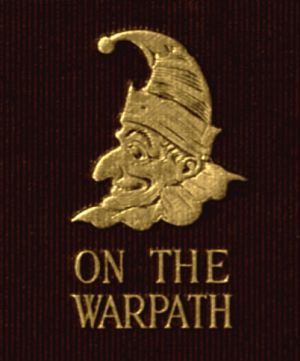
The Project Gutenberg EBook of Mr. Punch on the Warpath, by Various
This eBook is for the use of anyone anywhere at no cost and with
almost no restrictions whatsoever. You may copy it, give it away or
re-use it under the terms of the Project Gutenberg License included
with this eBook or online at www.gutenberg.org
Title: Mr. Punch on the Warpath
Humours of the Army, The Navy and The Reserve Forces
Author: Various
Editor: J. A. Hammerton
Illustrator: Reginald Cleaver et al
Release Date: November 26, 2011 [EBook #38146]
Language: English
Character set encoding: ISO-8859-1
*** START OF THIS PROJECT GUTENBERG EBOOK MR. PUNCH ON THE WARPATH ***
Produced by Neville Allen, Chris Curnow and the Online
Distributed Proofreading Team at https://www.pgdp.net (This
file was produced from images generously made available
by The Internet Archive)
Some pages of this work have been moved from the original sequence to enable the contents to continue without interruption. The page numbering remains unaltered.
Designed to provide in a series of volumes, each complete in itself, the cream of our national humour, contributed by the masters of comic draughtsmanship and the leading wits of the age to "Punch," from its beginning in 1841 to the present day

General. "Mr. de Bridoon, what is the general use of cavalry in modern warfare?"
Mr. de Bridoon. "Well, I suppose to give tone to what would otherwise be a mere vulgar brawl!"
REGINALD CLEAVER, R. CATON WOODVILLE, TOM BROWNE,
L. RAVEN-HILL, C. L. POTT, CHARLES PEARS, E. T. REED,
J. BERNARD PARTRIDGE, G. D. ARMOUR, FRED. PEGRAM,
GEORGE DU MAURIER, PHIL MAY, CHARLES KEENE AND OTHERS.
Was there ever protean like Mr. Punch! The little man is a wonder. In so many guises do we encounter him—now as tourist, again as playgoer, as huntsman, as artist, as bohemian, and equally as stay-at-home philistine, on the bench and on the golf-links, ashore and afloat, where not and how not?—that we need be in no wise surprised to find him on the warpath. Is he not the official jester of a warlike people?
Of course it may be suggested that in the present book we do not have what is entirely a record of his achievements on many a well-fought field. There are not many echoes here of real red war, but the mimic battle with its humours is well in evidence. The only recent experience of the real thing leaves Mr. Punch too sore of heart to say much about it. But as we are all believers in the maxim "in time of peace[Pg 6] prepare for war," and as most of our time is peaceful, we are always "preparing"—hence, perhaps, the reason why we are never ready. But there is a deal of humour in the process, and it is for fun we look to Mr. Punch. Nor shall we look vainly here, for in the past Charles Keene found many of his happiest subjects in the humours of military life and volunteering, while to-day Mr. Raven-Hill, himself an enthusiastic volunteer, ably carries on the tradition, and has many brilliant aiders and abettors.
Mr. Punch is, by turns, general, drum major, full private, cavalry man and "kiltie," he is also A. B. when the occasion serves, and would be horse-marine if necessary! At all events he has given the command, and it's "Forward!"
Waterloo up-to-date (a fact.)
Belgian Guide. Ze brave Picton 'e fall in ze arms of victoire——
Facetious Britisher. Where was Lord Roberts?
Guide (not to be done). Lord Robert 'e stand on zis montagne, and 'e cry, "Hoop, Garde, and at zem!"
The report that there are 46,719 total abstainers in the British Army is welcome news, but what grieves recruiting officers is the number of total abstainers from the British Army.
Advice for Martinets.—Military authorities should consider whether it would not be advisable to abate a little of their solicitude for the tidiness of a regiment, and pay somewhat more attention to its mess.
Interested Patron. So I see you lost an arm in the battle.
An Atkins ("back from the Front"). Ay, sir, and my companion here (indicating Atkins No. 2) he lost a leg.
Patron. And your Colonel—in the same battle, eh?
Atkins No. 2. Ah! he was worse off than either of us, sir; he lost his head.
Army Chaplains.—Wouldn't they be all doubly serviceable in time of war if they were all canons?

Bluejacket (in charge of party of sightseers). "Here Nelson fell."
Old Lady. "An' I don't wonder at it, poor dear. Nasty slippery place! I nearly fell there myself!"
The Black Watch will go night and day.
The Black Watch can be depended upon in any climate.
The Black Watch always keeps time.
The Black Watch is never out of gear.
The Black Watch wants no "winding up."
The Black Watch can be warranted for any period.
Historian of the War (to Private of the Dublin Fusiliers). Now tell me, my man, what struck you most at the battle of Colenso?
P. of D. F. Begorra, sorr, fwhat shtruck me mosht was the shower of bullets that missed me.
A Mystery from Shoebury.—When does the cannon ball? When the Vickers-Maxim.
"Yes, my dear Lavinia," says Mrs. Ramsbotham, rather annoyed with her niece, "I do know perfectly well what a soldier's 'have-a-snack' is. It is so-called because he carries his lunch in it. No, my dear, I am not so ignorant as you may think."

Fond Mother (reading letter from only son at the front). "Charlie says our Generals are perfect idiots!"
How to represent the Army.—Long skirt of gauzy material, parasol tied with tricolour ribands, silk blouse with epauletted sleeves and a Crimean medal pinned on to a bunch of flowers. High-heeled shoes. Regimental levée scarf worn over the left shoulder. Tiny cocked hat attached to the hair by two long pins and a small silk flag.
How to represent the Navy.—Short skirt decorated with brooch anchors. Garibaldi with naval collar. Bag hanging from waist-belt with silver letters H.M.S. Coquette. Hair built up à la "Belle of New York" surmounted with a small sailor hat decorated with streamers.
Something Military.—The officers of the Blankshire Cavalry possess, individually and collectively, more money than those of any other regiment in His Majesty's service. If this be so—we name no names—these gallant heroes ought to be known as "The Tin Soldiers."
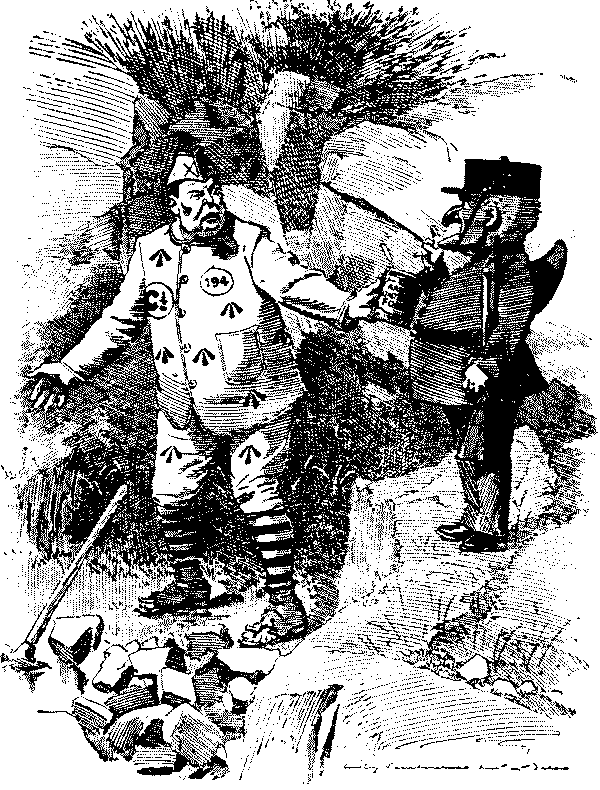
Paid in his own Coin; or, what we should like to see.
Convicted Contractor. "Look here! I can't walk in these boots, and I can't eat this food!"
Warder Punch. "Well, you've got to; it's what you supplied to the troops."
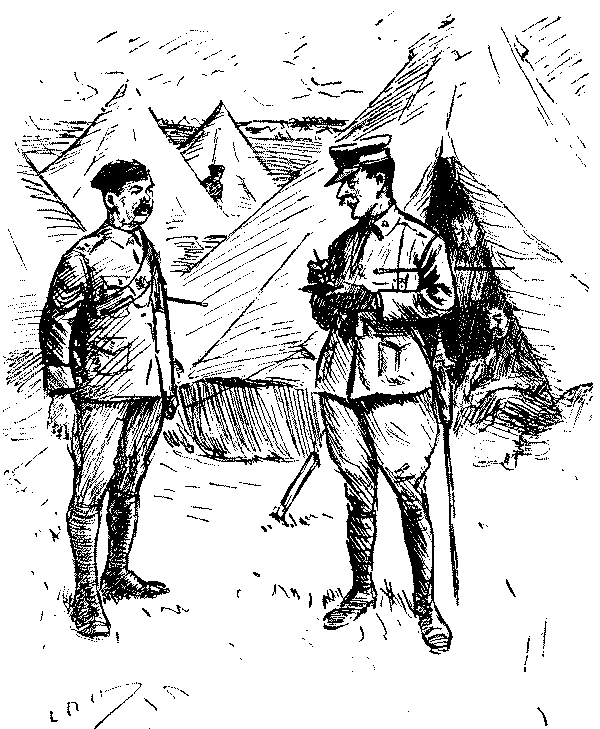
Orderly Sergeant (to officer). "Beg your pardon, sorr, but 'm wan ration short. Who will I give it to?"
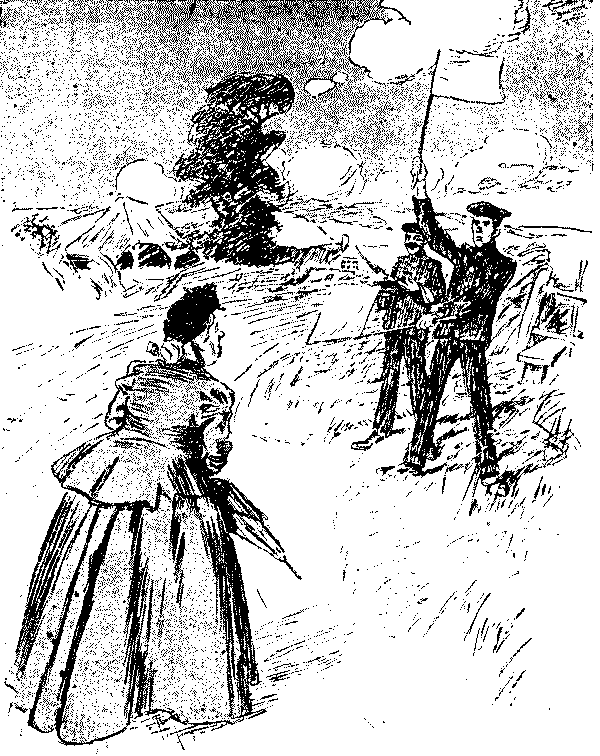
Old Lady (to member of signalling section, who has just commenced to reply to a message). "Young man, if you think to alarm me by wagging those flags about, you are very much mistaken!"
That it takes you away from town in the dog days for a clear fortnight.
That, being farther away from London than Wimbledon, you escape the more easily the attention of those who love tea, flirtation, and strawberries and cream.
That there is plenty to do at the ranges with the rifle, and to see in the neighbourhood on a bicycle.
That the conversation of your comrades is congenial, if slightly "shoppy."
That, after all, it is better to talk all day of scores, than of links or tyres.
That if the life becomes too monotonous, a train can carry you back to Waterloo in forty minutes.
That life under canvas is recommended by the doctors when it is subject to certain favourable climatic conditions.
That, with the power of enjoying your outing to the end, or cutting it short at the beginning, you can yet claim credit for your self-denial and patriotism.
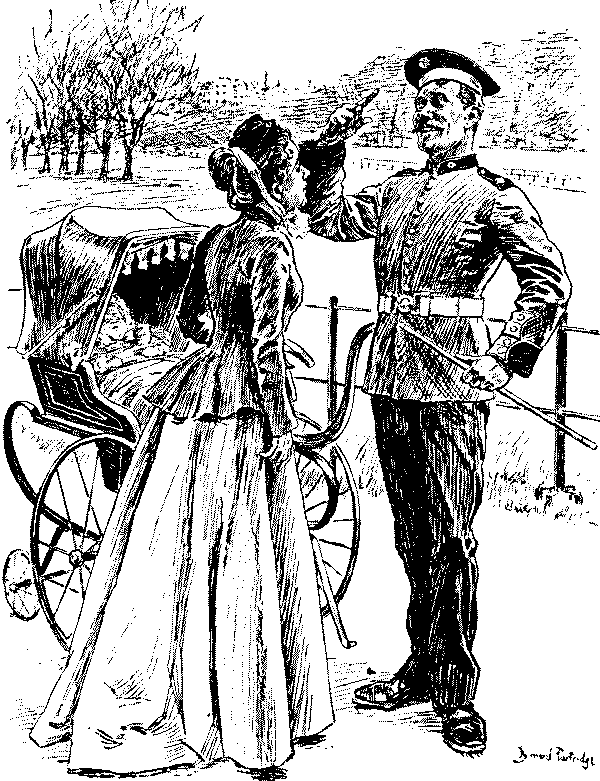
Mary Anne. "When are they going to start this army reform they talk such a lot about?"
Private Atkins. "Why bless your 'eart, it's all done! Look at our new caps!"
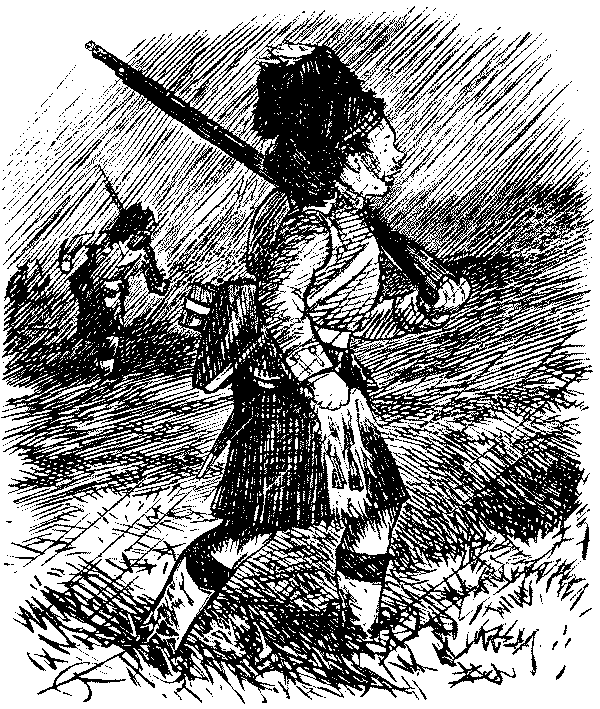
Private Sweeny (Highland regiment). "Colony bog, is it? Thin bedad! I wish I was back in Tipperary!"
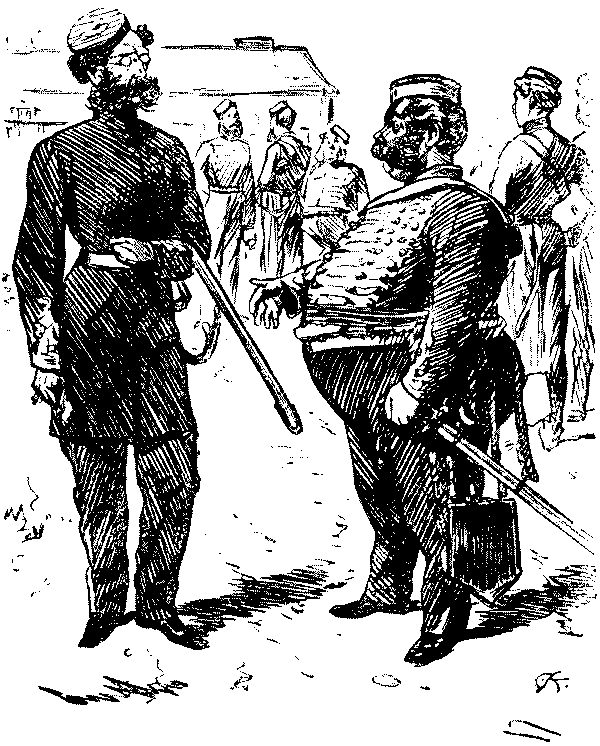
Troop Sergeant-Major. "It comes to this, captain, 'a mun e'ther hev' a new jacket or knock off one o' my meals!"
Scene—Pall Mall. Enter officer in full uniform hurriedly. He is stopped by messenger.
Messenger. Yes, sir?
Officer. I want to see the Commander-in-Chief at once.
Messenger. Very sorry, sir, but that gentleman who has just entered the room is likely to be there for the next three hours. He came here two minutes before your arrival.
Officer. But is a civilian allowed to take precedence of an officer in full uniform?
Messenger. Beg your pardon, sir, but he is not a civilian; but an officer like yourself.
Officer. And yet he is admitted in mufti! Why, here have I had to come up from the country in full rig, being chaffed at the railway station, grinned at by the cabman, and cheered by the crowd!
Messenger. Yes, sir. Very sorry you should have been inconvenienced, sir, especially as it was unnecessary, sir!
Officer. Unnecessary! Why, doesn't the order come into force to-day that all officers who appear in the War Office for any purpose whatsoever must be attired in the proper uniform of their rank and regiment?
Messenger. No, sir. To-morrow, sir, the second of April, is the proper date. To-day, sir, is the first of April.
Officer. And the first of April is surely the most appropriate date! Quite the most appropriate date!
Messenger. Yes, sir!
The War Office is taking steps to turn its surplus cavalrymen into foot soldiers. We see nothing ridiculous in the idea—as some persons profess to. We already have Mounted Infantry. Now we are to have Dismounted Cavalry.
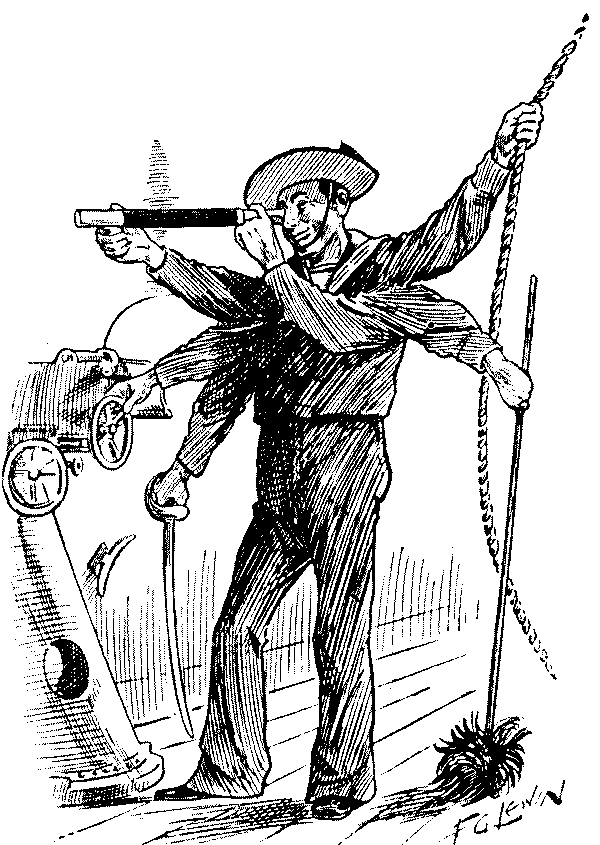
What he will have to become, if recruiting for the navy continues to fall off, and many more new battleships are constructed.
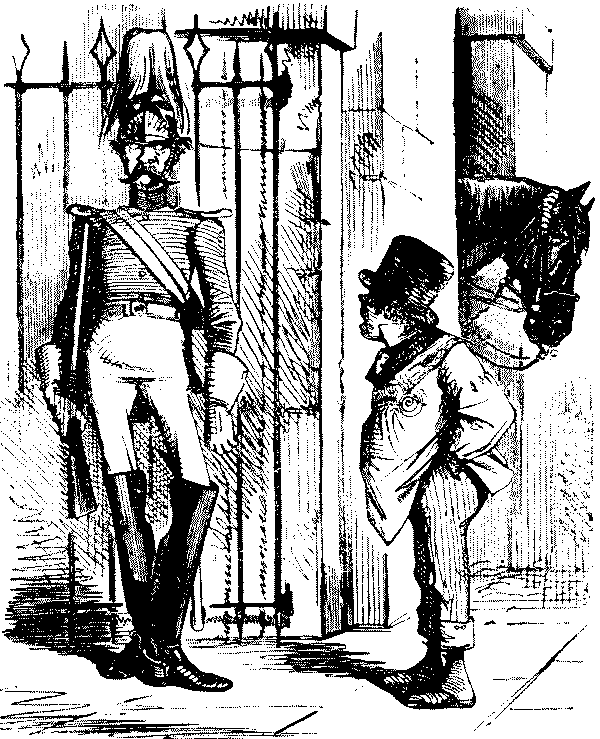
Hector. "Now then, young feller—who are you staring at?"
Hodge. "Whoy shouldn't I stare at yer? I pays vor yer!"
["It has been proposed that the kilt should be the uniform of the new Irish Guards."—Daily Paper.]
What! take away the throusers off our pathriotic knees,
As if we were a regiment of disordherly M.P's?
Och! sorrer take the wicked thought, for histhory it teaches,
An Oirishman is happiest when foightin' in the breaches.
What! Wear them bits of pitticoats that blow about and twirl
Around your blushin' knees? No, faith! Oi'm not a bally girl!
No! Oi'm an Oirish souldier, an' me blood Oi've often spilt it,
But though Oi'm willin' to be kilt, Oi'll die before Oi'm kilted.
In order to check extravagance in the Cavalry, the authorities have decided that "fines of money or wine are no longer to be levied on marriage or promotion, or in respect of any minor irregularities." In future the officer who commits the major irregularity of being promoted will not need to say, with the King of Denmark, "O, my offence is rank!"
Dear Field-Marshal Punch.—In a telegram from the seat of war this week I find the following obscure passage. "General Blank held the enemy's main body whilst General Dash carried out his movements." Knowing your skill in tactics, may I ask if you can explain this to me either verbally or pictorially. Used in contradistinction to his main body, I presume the enemy's "movements" must be his limbs, and if all four were carried out by this barbarous general, it would be certainly a feat of arms, and the movement might be said to be al-leg-ro. Nothing is said as to whether the enemy survived this fearful operation depriving him of his members, but it may be a case of a truncated despatch. Then, where were the movements carried out to? If the presumption stated above be correct, I infer it must have been to the region of limbo, but the army in Flanders never practised such lopsided manœuvres.
Yours respectfully,

Cockney Volunteer (on sentry go). "Halt! Who goes there?"
Rustic. "It's all roight, man. Oi cooms along 'ere ev'ry maarnin'!"
Elder Sister (coming up). "Kitty! what have you been saying to Captain Coward? He looks dreadfully offended!"
Kitty (engaged to the Captain). "I only told him that if he had gone to the war and been shot, I should have been so proud of him!"
["The War Office has decided to grant one rifle to every ten men joining the new rifle clubs, throughout the country."—Daily Press.]
1. In face of the enemy the rifle must be fired as quickly as possible, and then passed on to the next man.
2. No squabbling in the ranks, as to whose turn[Pg 30] it is to shoot, shall be allowed by the commanding officer, and his decision shall be final.
3. The other nine men, whilst awaiting their turn, must stand at "attention," and scowl fiercely at the enemy.
4. Where the commanding officer, in his discretion, sees opportunity for so doing, he shall employ several men simultaneously, to fire the rifle—i.e. one to hold the rifle to his shoulder, a second to close his left eye, and a third to pull the trigger. This plan would leave only seven men out of ten unemployed.
5. The above-named seven would be at liberty to throw things at the enemy whilst awaiting their turn for the rifle.
6. In actual warfare, the commanding officer may request the enemy to wait a reasonable time whilst the solitary rifle is handed round, after being fired off.
7. Whilst an attack is going on, the unemployed men of a company shall not be allowed to leave the ranks to play, but should be encouraged to take an intelligent interest in the shooting prowess of their solitary comrade.
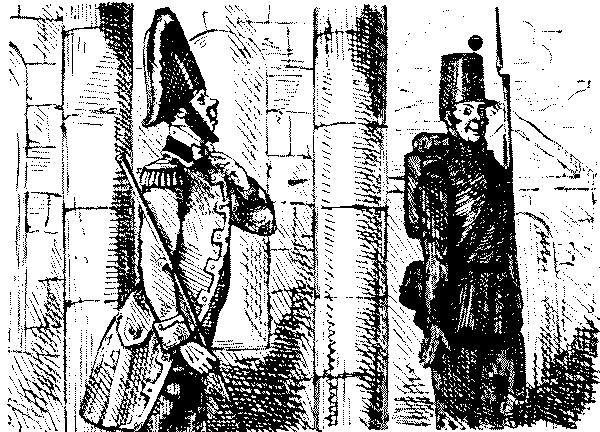
North Cork Militia Man. "Am I to shalute him, or no? Begor. I wondher if he's a sarvan'-man or a giniral."
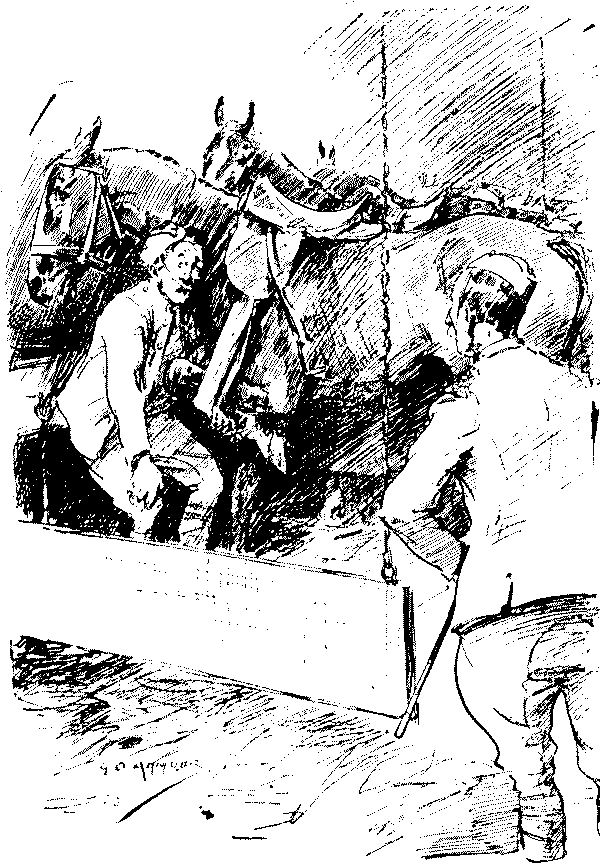
Recruit. "Look 'ere, mister, it ain't no good. This saddle won't go on this 'ere 'orse. I got it over is 'ead all right, but I can't get 'is legs through nohow!"
["A housewife will now form part of the free kit of necessaries."—Army Order.]
It 'as long been my opinion, as a sodger and a man,
That I couldn't get on proper, not without yer, Sairey Ann.
Well, now 'ere's the latest horder—just yer take a read of it—
That a housewife shall be a portion of the necessary kit.
Oh, them horders! Ain't I cussed 'em! Oh, the shockin' words I've said!
But now for once, my Sairey, I'm a-blessin' 'em instead.
Yus, they misses pretty horfen, but at last they've made a hit,
For yer going to be a portion of my necessary kit.
They're to serve out housewifes gratis, an' I only 'opes, my pet,
That they'll let us Tommies choose ourselves the gals we wants to get,
'Twould be takin' of the gildin' off the gingerbread a bit
If I got yer mar, for instance, in my necessary kit.
But we'll 'ope the best, my Sairey, though yer can't for certain tell,
And I ain't got much opinion of them parties in Pall Mall,
But for once they've put a bullet in the bull's eye, I'll admit,
If they makes my Sairey portion of my necessary kit.
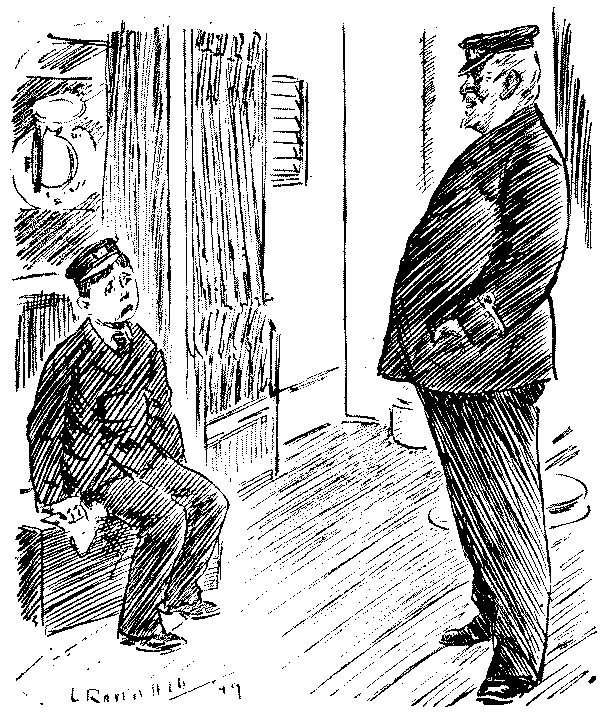
Boatswain (to newly-joined cadet). "Come, my little man, you mustn't cry on board of one of His Majesty's ships of war. Did your mother cry when you left?"
Cadet. "Yes, sir."
Boatswain. "Silly old woman! And did your sister cry?"
Cadet. "Yes, sir."
Boatswain. "Stupid little thing! And did your father cry?"
Cadet. "No, sir."
Boatswain. "'Ard-'earted old beggar!"
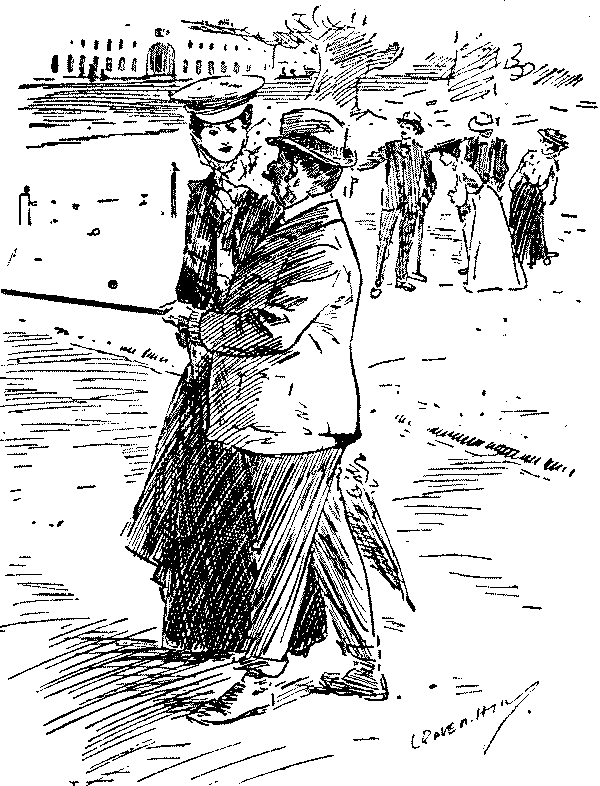
Fair Visitor (with a thirst for military knowledge). "So all the kitchens are behind those buildings. How very interesting! And how many pounds of meat do your men eat a day?"
Gallant Major. "Really—er—I've no—er—idea, I'm sure, don't y'know."
Fair Visitor. "But I thought you were in the provisional battalion!"
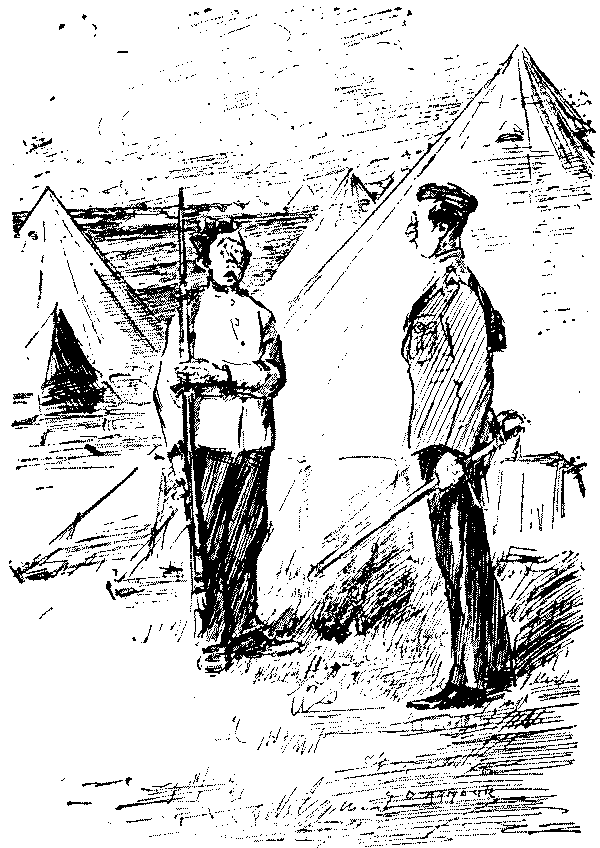
Officer (to Irish sentry on guard tent). "Why don't you face your proper front, sentry?"
Sentry. "Sure, yer honour, the tint's round. Divil a front it's got!"

General Bouncer (on a round of inspection at Sandhurst). "Augh! Can you tell me what 'mess' this is?"
Cadet. "Well, they call it 'mutton,' but I wouldn't vouch for it!"

The portrait of Private O'Locker on finding his billet is at a teetotal hotel.
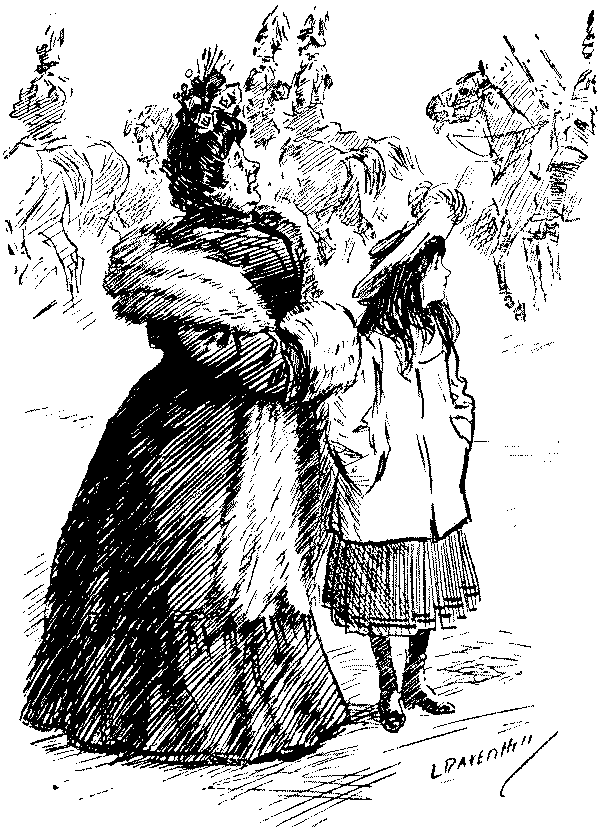
Auntie (explaining morning manœuvres of His Majesty's Life Guards on their way to relieve guard at Whitehall). "Don't you see? There's two, and then there's one, and then there's the whole lot—and then there's two more!"
[Youthful niece sees.
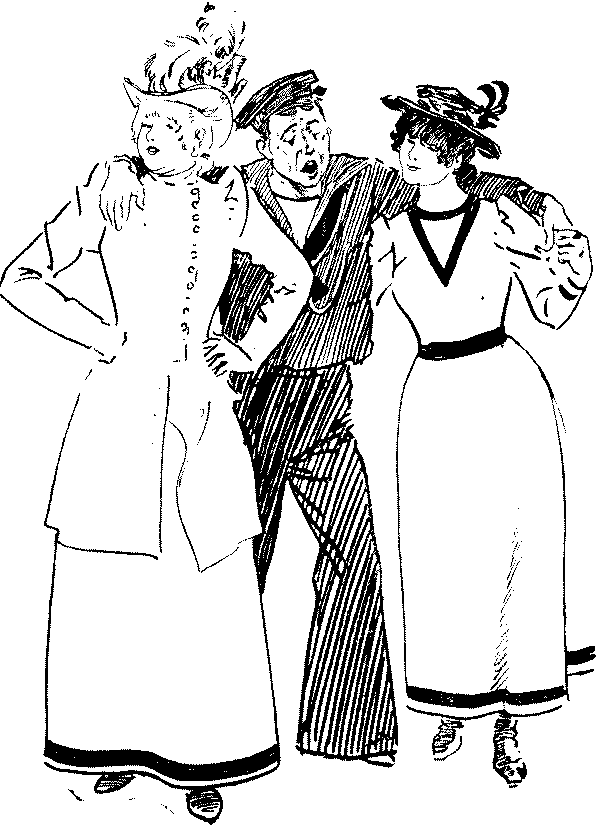
Songs and their Singers.—Jack (singing at the top of his voice)—"There's only one girl in the world for me!"—Popular Song.
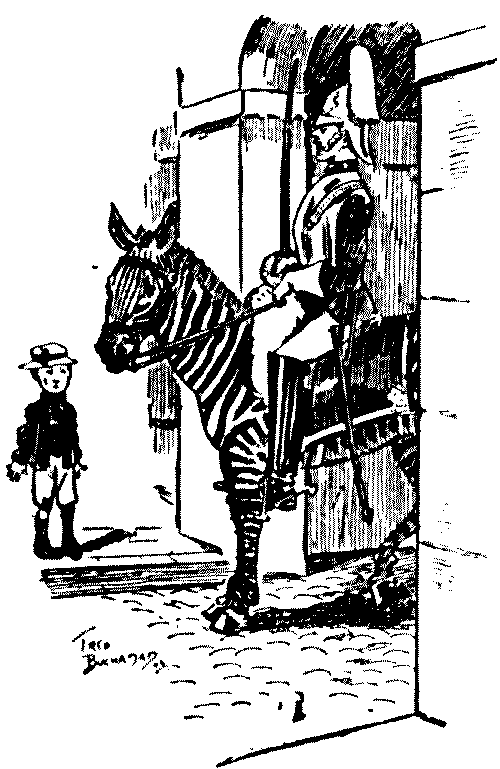
[According to the Daily Telegraph zebra mules have been introduced into India by the Remount Department for military purposes.
Would not their introduction—as above—into Whitehall lend a new and even more quaintly picturesque touch of grandeur to the scene?
Astonishing lot of nonsense the Daily Wire prints about military affairs ... no, I do not waste my time reading it. Any intelligent citizen, Mary, is bound to take an interest in things of this sort. And our army is rotten, madam—rotten to the core.... What? That reminds you, shall Tomkins be told to pick the apples? As you please—I'm not talking about apples. Just consider these manœuvres, and the plain common-sense lessons they teach you. First of all, a force lands in England without opposition. There's a pretty state of things!... No, I didn't say they had interfered with us—but just think of the disgrace! Not one general, madam, not one single general capable of defending this unhappy country. And yet it is to support these expensive frauds that I have to pay taxes!... Well, if he calls again, tell him that I will attend to the matter. There's the rent and rates to be seen to first, and goodness knows, with your housekeeping and Ethel's[Pg 42] dress bills—but I was talking about the army.
Incompetent profligates, that's what the officers are. What sort of life do they lead? Getting up late, playing polo and hunting, eating luxurious dinners, bullying respectable young men and ducking them in horse-ponds—there's a life for you.... What do you know about it, Miss Ethel?... Captain Ponsonby told you? You can tell him something then. Tell him that Britons of common-sense—like myself—don't mean to stand the present way of going on much longer. Drastic changes.... No, I'm not trying to break the table, Mary ... drastic changes are absolutely necessary.
First of all, there must be a clean sweep at the War Office. Men of brains and common-sense are wanted there. Then we must organise a great army, to guard the coast all round England. The man who will not serve his time as a militiaman or volunteer is not worthy of the name of English-man, and the fruit.... I told you once about those apples, I do wish you wouldn't interrupt.... If they are not picked to-day they'll have to wait[Pg 44] for three weeks? Why? Tomkins can pick them next time he comes. As I was saying, the militia system must be developed, and—eh? Tomkins won't be here for three weeks? Got to go into camp for his training? Well, I call it perfectly disgraceful! Here I pay a man high wages to attend to my garden once a week, and then this miserable system takes him away, at the most inconvenient time, to play at soldiers!... If I have time to-night, Mary, I shall write a strongish letter to the Daily Wire on the subject.
Scene—Barrack Square, after inspection of arms, at which the Company's Commander has been examining his men's rifle-bores with the aid of the little reflector which is commonly dropped into the breach for this purpose.
Private Atkins (who has been checked for a dirty rifle). 'Ere, it's all bally fine! The orficer 'e comes an' looks down the barrel with a bloomin' mikeroscope, and the privit soljer 'e 'as to clean 'is rifle with 'is naked heye!
The illustrated papers oft with satisfaction grunt,
When they print a pleasing portrait of "our artist at the front."
Now here we have a picture of a sort we seem to lack.
Which is to say, a portrait of "Our artist at the back".
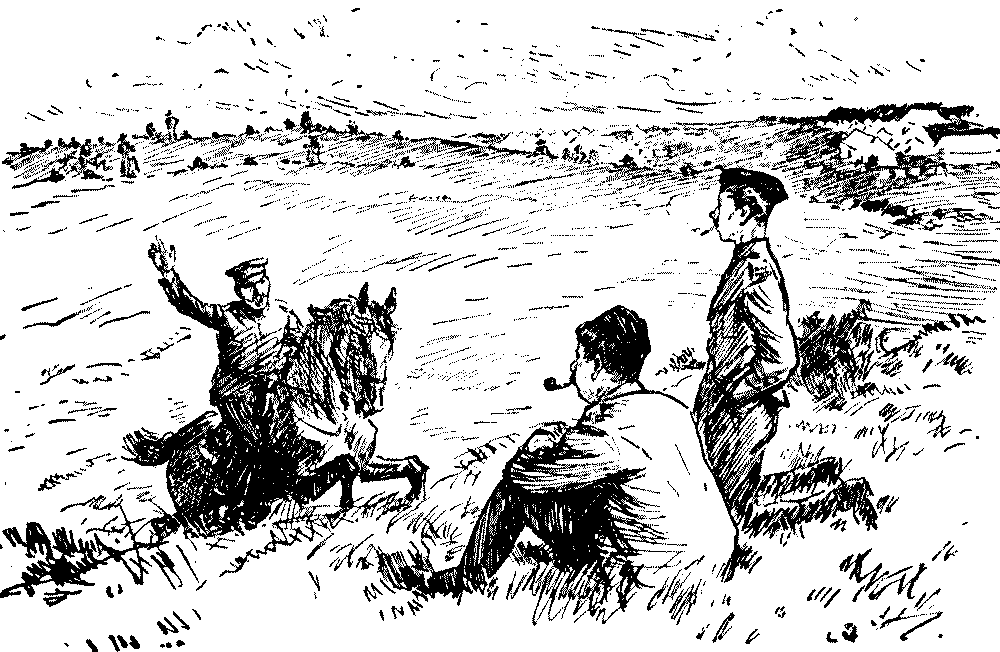
A.-D.-C. "What the deuce are you men doing here right in the line of fire? Clear out at once! They're firing ball cartridge, not blank."
Unmoved Private (who has found an excellent place from which to view the attack practice). "Ther' now. We was just a-zaying as we thought 'twas bullets by the zound of 'em!"
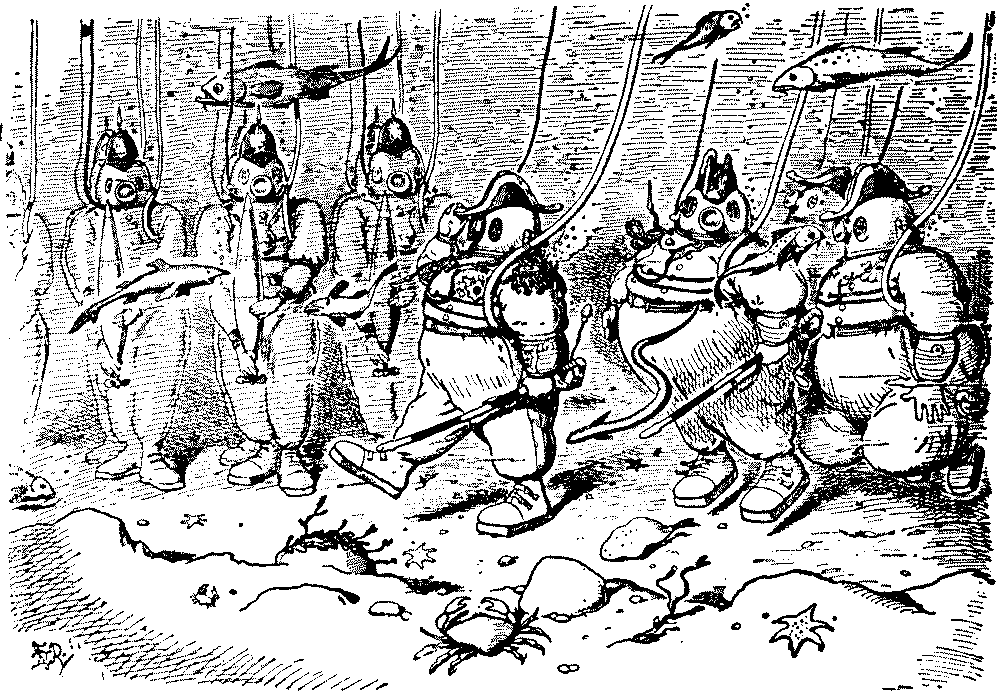
A review of the Royal (Sub)marines
near the Goodwin Sands.
(You could hardly "tell the Marines" in their
new sub-aqueous uniform.)
We are happy to announce that the Lords of the Admiralty have issued an order for the distribution of medals to the officers and seamen who served in the naval actions hereunder specified. We understand the medals are of gold, set round with diamonds of the most costly description. Great caution will be used in the distribution, to prevent fraud in personating deceased officers, &c.
—A.D. 876. King Alfred's engagement with and destruction of the Danish fleet.
—1350. Great sea-fight between the English and the combined fleets of France and Spain.
—1588. Destruction of the Spanish Armada.
—1702. Admiral Benbow's engagement with the French.
—1761. Siege and capture of Belleisle.
N.B. No officer or seaman will be entitled to a medal in respect of the last-mentioned siege, unless he can satisfy their lordships that he was "there all the while."
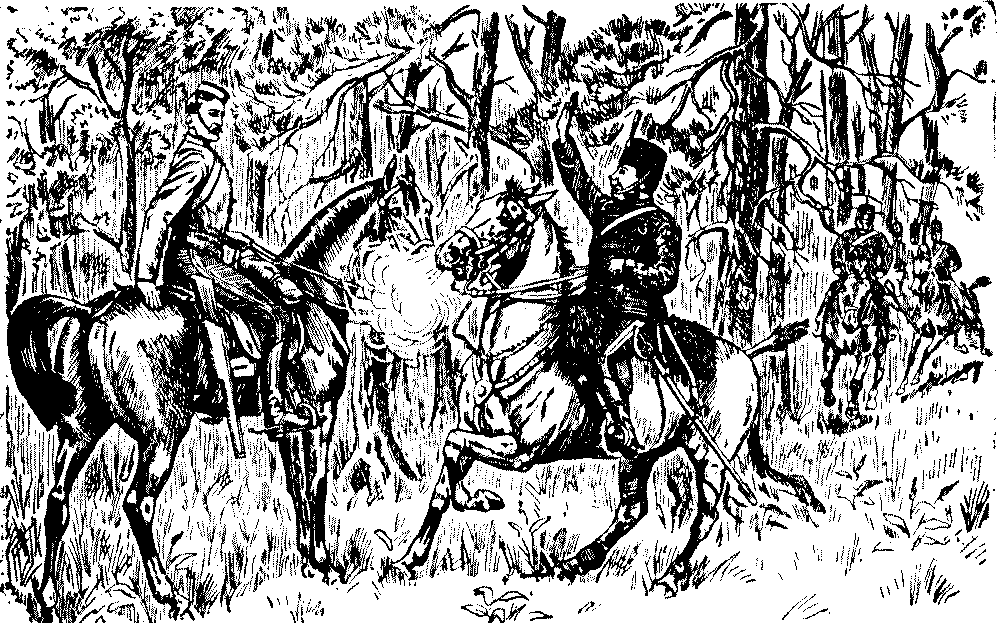
Regular (manœuvring with Yeomanry). "Got to give up my arms, have I? Umph! This comes of going out with a lot of darned Volunteers."
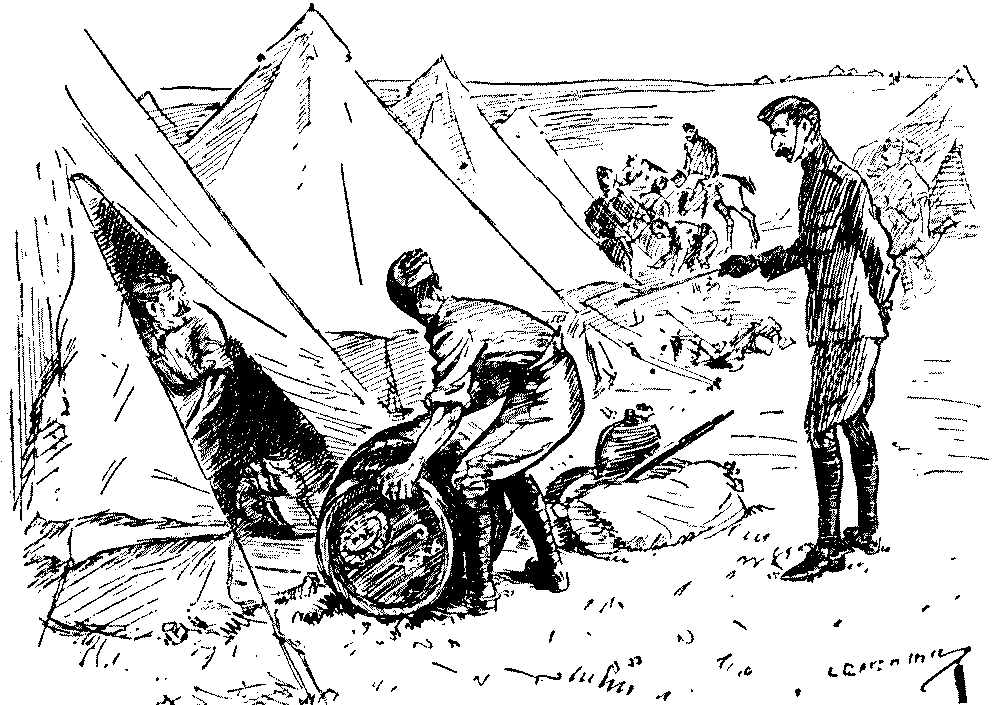
Yeomanry Manœuvres. (First Day in Camp.)—Officer. "What's all this? What are you doing with that cask?"
Trooper. "Tent equipment, sir!"
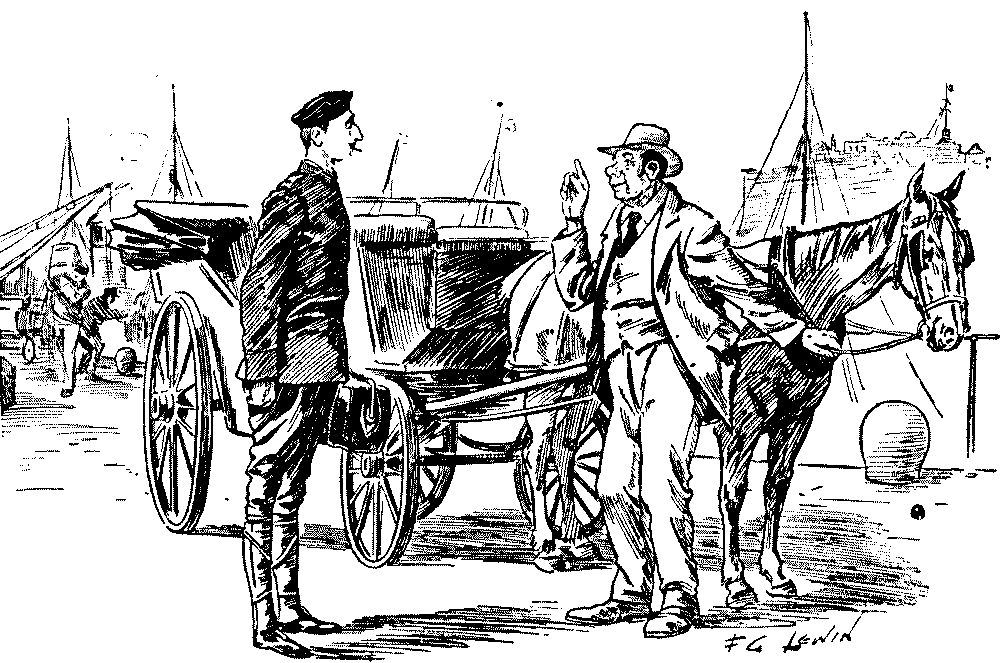
Lieutenant Nobs (just arrived). "How long will you take to drive me to the fort, Cabby?"
Cabby. "Ten minutes, Capting, by the shortcut through the halleys. But the military allus goes the long way round, through the fashionable part o' the town, yer honour, which takes an hour."
[Cabby gets his hour.
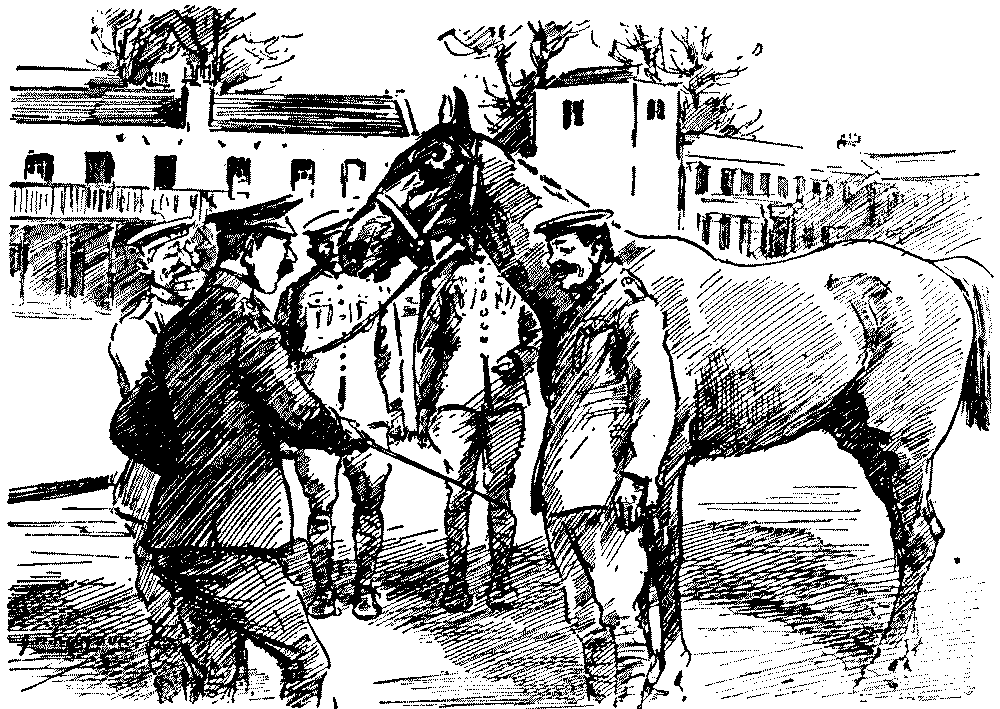
Officer (examining a Mounted Infantry class). "Well, I think you understand about the hoof and what the frog is. Now, just tell me where you would expect to find corns?"
Mounted Infantry Recruit (suspecting a catch). "In the manger, sir."
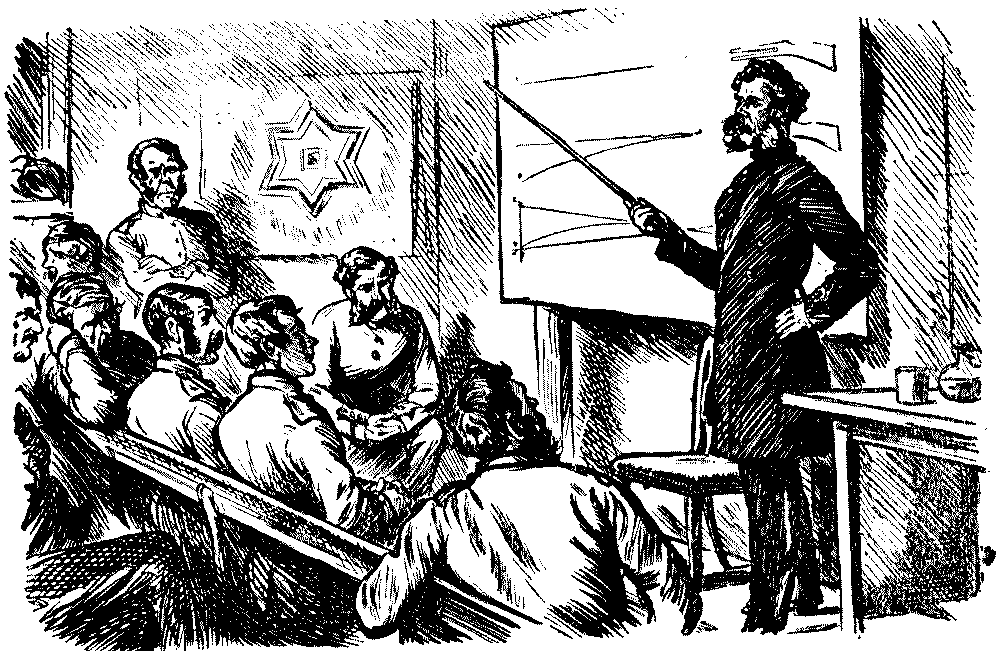
Musketry Instructor (who wishes, by simple practical examples, to bring the fact of the air's resistance and elasticity to the mind of intelligent pupil, No. 450, Private Jones), loq. "For instance, you have seen an air-cushion, and felt that it contained something you could not compress. What was it?"
Private Jones (readily). "'Orse 'air, sir!"
[Enthusiastic instructor tries again.

Captain of Volunteers. "Dress back, No. 3, do dress back. Comp'ny! Fours! As y' were! No. 3, Mr. Buffles, how often am I to speak to you, sir? Will you dress back, sir; further still, sir. You are not dressed exactly yet, sir, by a——"
Buffles (goaded to madness). "Bet yer five pounds I am—there!"
In the House of Commons, and elsewhere, the Secretary of State for War is accustomed to have appeals made to him to assist in providing facilities for the engagement and remunerative occupation of soldiers and non-commissioned officers no longer on active service. We are glad to notice, from the subjoined advertisement, which appeared in the Daily News, that the public themselves are taking the matter in hand:—
TWO GENERALS WANTED, as Cook and Housemaid for one lady. Light, comfortable situation. Good wages.—Apply, &c.
The advertiser, it will be observed, flies at higher rank than that usually considered in this connection. But the situation is "light" and "comfortable," with "good wages" pertaining, and she has some right to look for applicants of superior station. We presume that on festive[Pg 56] occasions the gallant officers would be expected to don their uniforms. Few things would be more striking than to see a general, probably wearing his war medals, sweeping the front door-step, whilst through the kitchen window a glimpse was caught of a brother officer, in full tog, larding a pheasant.
By the courtesy of the Admiralty H.M.S. Buzzard has been anchored as a permanent guardship of honour immediately opposite the approach to Mr Punch's offices in Bouverie Street. The compliment is much appreciated.
Further changes in our Navy are announced. Chaplains are to be abolished, and the navigating officers are to include in their duties those of sky-pilots.
A Cockney's Question on the Navy.—Does a Port Admiral mean an Admiral who is laid down for a long series of years, and not decanted for service till he is very old?

Fleet Surgeon. "There doesn't seem much wrong with you, my man. What's the matter?"
A. B. "Well, sir, it's like this, sir. I eats well, an' I drinks well, an' I sleeps well; but when I sees a job of work—there, I'm all of a tremble!"
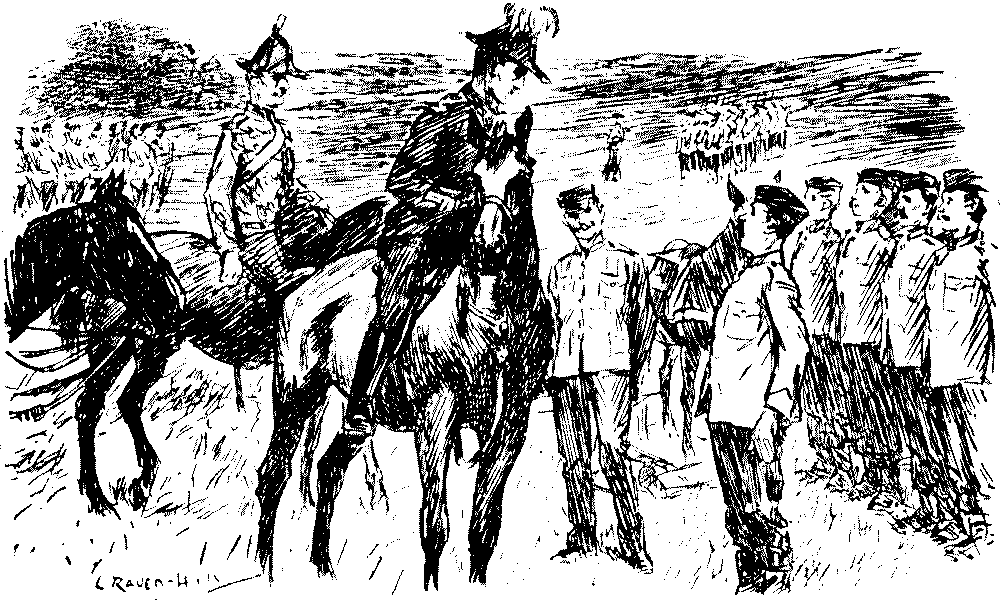
(Aldershot.) General (to Irish recruit). "Can you tell me how many species of pack animals there are?"
(No answer.)
General. "Well, do you know any kind of pack animal?"
Recruit (inspired by recollection of many days' pack-drill.) "Yes, sorr. A defaulter, sorr!"

Colonel (who is taking a turn round to see how his subs are getting along with their road sketching). "You know, this won't do. You should be able to ride about the country, and make sketches as you go."
Jones (not getting along at all nicely, thank you). "Well, sir, if I could do that, sir, I should chuck up the army, and join a circus!"
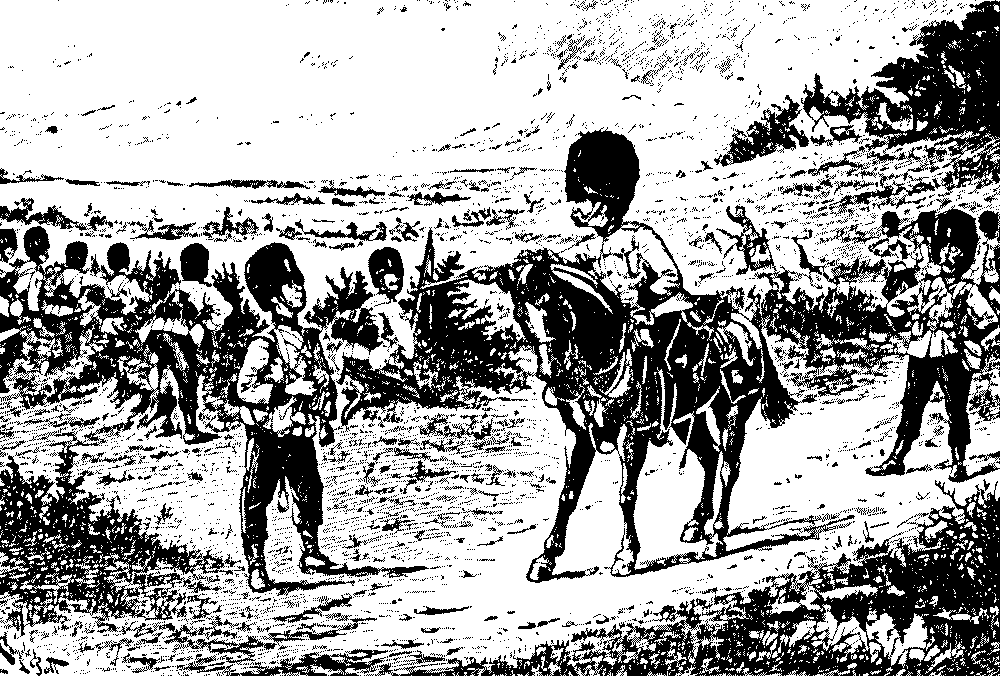
Infuriated C. O. 10th V. B. Mudfordshire Fusiliers (who has ordered bugler to sound the "Cease fire" several times without effect). "Don't you hear me, fellow? Why the deuce don't you sound the 'Cease fire' when I tell you?"
His Bugler. "If ye plaze, zur, a've blowed a quid o' bacca down spout t'ould trumputt, awn I can't make un speak!"
["Colonel Crofton, commanding the Eastern District, has decided that the 'quiff' is 'unsoldierly,' and 'disfiguring,' and has ukased its abolition. The 'quiff' is the forelock worn by Mr. Thomas Atkins."—Pall Mall Gazette.]
Letter from a Private in the British Army to a Private in the German Army.
Dere Ole Sauerkraut,—Ow' 're yer going along? Jest a line from the Eastern Distric' to tell yer that we've all got the fair 'ump. An' I'm blest if our colonel ain't an' been pitchin' on our 'air. When we 'is in the fightin' line they yells, "Keep your 'air on, boys!" but when we gets 'ome, sweet 'ome, they says take it orf. There's 'air! I must tell yer we wears a hartful curl on our forrids wot is knowed as a "quiff," and I give yer my word it's a little bit ov orl rite! Susan (with lots o' cash as bein' only daughter of a plumber), wot I walks out with, simply 'angs on to it with both 'ands, so to speak. Well, our colonel says the "quiff" is "unsoldierly" and "disfiguring," and we 'ave got to bloomin' well[Pg 62] lop it orf, no hank. This busts my charnst with Susan.
Yores melancholy-like,
["The German uniform is to be changed to a grey-brown. The officers are particularly annoyed at the change, and complain that they might at least have been allowed to keep the bright buttons on their tunics. These are also to be dulled down to the new drab régime. Everything that is not strictly utilitarian—tassels, lace, and decorations—is to be banished from the parade-ground."—Westminster Gazette.]
Mein Gut Friend,—We haf the both trouble much got! You haf the beautiful Susan verloren. I my Katrine am deprived of. Because why? I was so schmart lookin' in mein regimentalen blue dat Katrine fell in luff with me on first sighten and called me in ways of fun her leetle "blue teufel"! But now, ach Himmel! she at me cochet die snooken! "Cuts," as you say. I broken-ar-arted quite am. Because why? The Office die Warren as us ordered to take off der blue regimentalen. We haf in brown-grey to dress ourselves. Ah! dirdy, bad, rotten colour! And no more ze schon buttons to haf that the beating heart of Katrine conquered. Farewell to Katrine! She brown ates.—Zo longen
Commander. What is your complaint against this boy?
Bluejacket. Well, sir, as I was a-walkin' arft, this 'ere boy, 'e up an' calls me a bloomin' idjit. Now, 'ow would you like to be called a bloomin' idjit, supposin' you wasn't one?
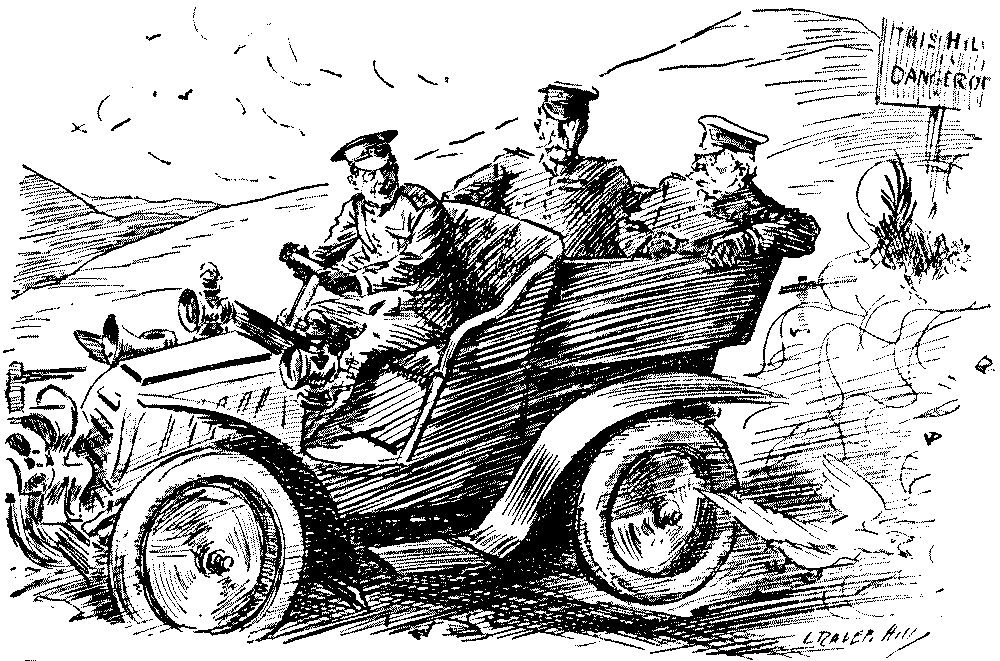
Motor Lieutenant, Motor Volunteer Corps (to General in his charge). "I say, sir, if we"—(bump!)—"upset"—(bang!)—"shall I get"—(bump! bang!)—"a military funeral too?"
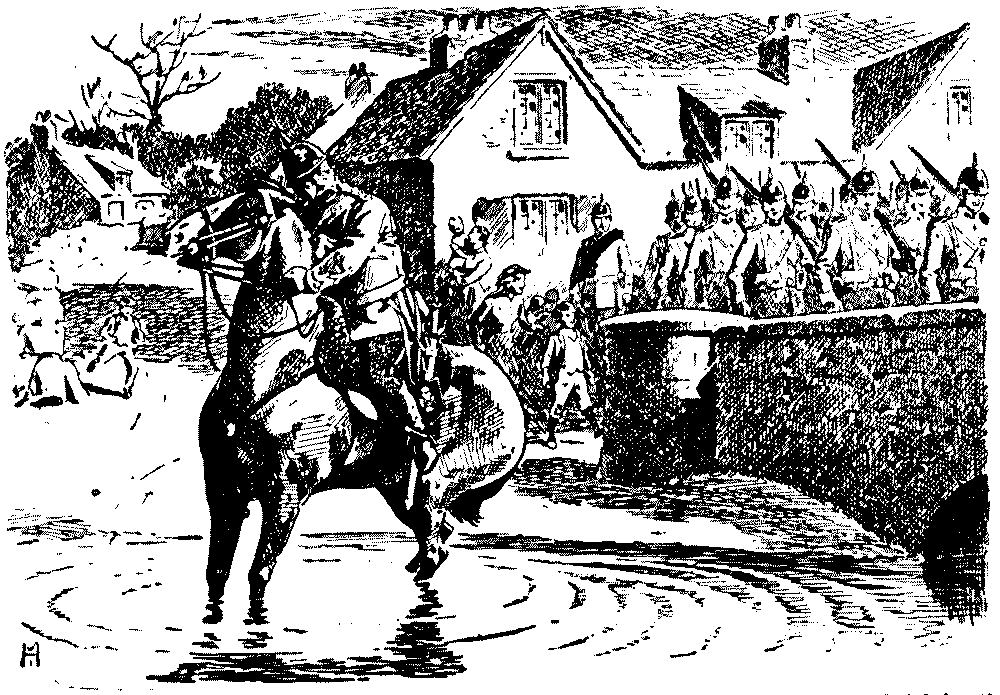
Perilous position of a gallant officer of Volunteers, on a recent march, who (ever thoughtful for the comfort of his hired charger) chooses the cooling waters of the ford in preference to the bridge. "Here! Hi! Help, somebody! Hold on! I mean halt! He won't come out, and he wants to lie down, and I believe he's going to rear!"
Trafalgar Day.—(At the Board School.) Teacher. Now can any boy tell me why Nelson's column was erected in Trafalgar Square?
Johnny Grimes (immediately). Please, sir, to 'elp 'im up to 'eaven, when 'e died in the arms of the Wictory.

Horse-buying "Expert." "Yes, it certainly does look more like a 'towel-horse' than anything else; still it'll have to do!"—Passed.

"How dreadfully stout the general is getting!"
"Yes, isn't it fortunate? Otherwise he wouldn't be able to wear all his medals!"
Augury from fowls of air
Back to Tuscan gramarye dates.
Birds in February pair:
Now then, skippers, choose your mates.
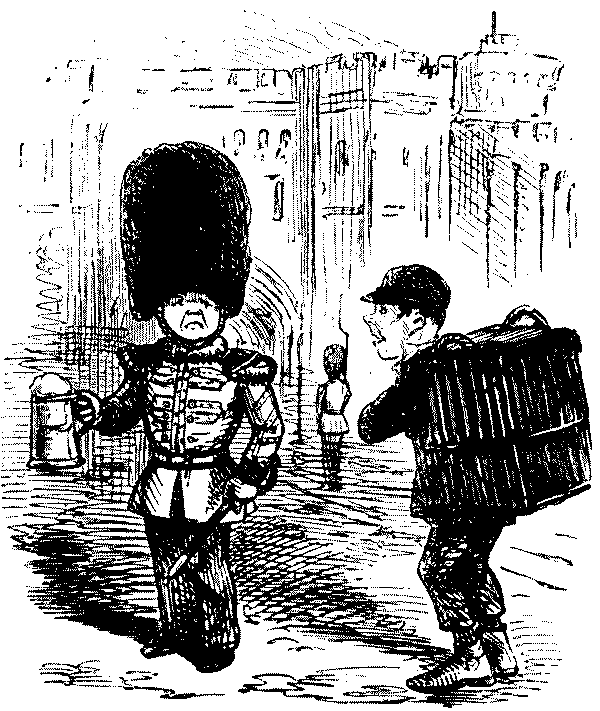
Military Man. "Well! What are yer a starin' at—ain't yer never seed a sodger before?"
["The long-proposed introduction of motor-cars into the army for transport purposes is on the point of accomplishment."—The Outlook.]
... "Comrades!" cried the proud general, addressing his troops (standing around him in the circular square ordered by the latest drill book), "at last we are about to reap the reward of our exertions. Thanks to our trusty motor-cars, we have traversed the desert at an average speed of twenty-five miles an hour. Our casualties have been few and insignificant. A dozen or so of the engines blew up, but not more than fifty men perished by these accidents. We have, indeed, to mourn the loss of some of the 75th Dragoons, whose motor-car went wrong in its steering, and rushed at express speed into the middle of a lake. And not a few of our heroes have been arrested by the native police on the charge of furious driving, with the result that they now languish in dungeons, awaiting bail. But what are these[Pg 70] trifles, compared with the glory that will soon be ours? The enemy are now within thirty miles of us—a distance which, with a little extra pressure, we can cover in an hour. So, forward! Mount motor-cars! Tie down the safety-valves! Seize starting levers! Now, when I give the word! Are you read——"
At this moment a grey-haired officer interrupted him.
"Alas, sir!" he cried, "we cannot advance! It is impossible!"
"Impossible?" echoed the general, in amazement. "Why?"
"For the very good reason that—we've run out of oil!"
A loud groan burst from the army on hearing the dreadful news; the voice of the general himself shook as he replied:
"Then, for once, we must ride."
"You forget, sir," said the other, "that nowadays we have no horses. Shall we—march?"
"No!" cried the intrepid leader. "March? Never! Death before dishonour! Men, your general may have to die a rather unpleasant[Pg 72] death; but never, in this scientific age, never will he insult you by suggesting that you should walk!" and rapturous cheers from the army greeted this noble utterance. But just when hope was dying in every breast, and the only possible course seemed to be to wait patiently until the enemy attacked and destroyed them, a small motor-car with red-hot bearings whizzed through the crowd and stopped before the general. Need we mention that its driver was none other than Henry de Plantagenet? (He's my hero, of course, and he went out scouting on his own account—as heroes do—in the last chapter.)
"Sir," he cried triumphantly, "I have news, great news!"
"Well?" said the general.
"Yes, it is a well, a well of natural petroleum, in fact, which I have discovered not half-a-mile away!"
The general clasped his hand, while the army roared themselves hoarse with delight. And, an hour later, only a faint flicker of dust on the horizon showed where the expedition was scurrying towards the doomed enemy.
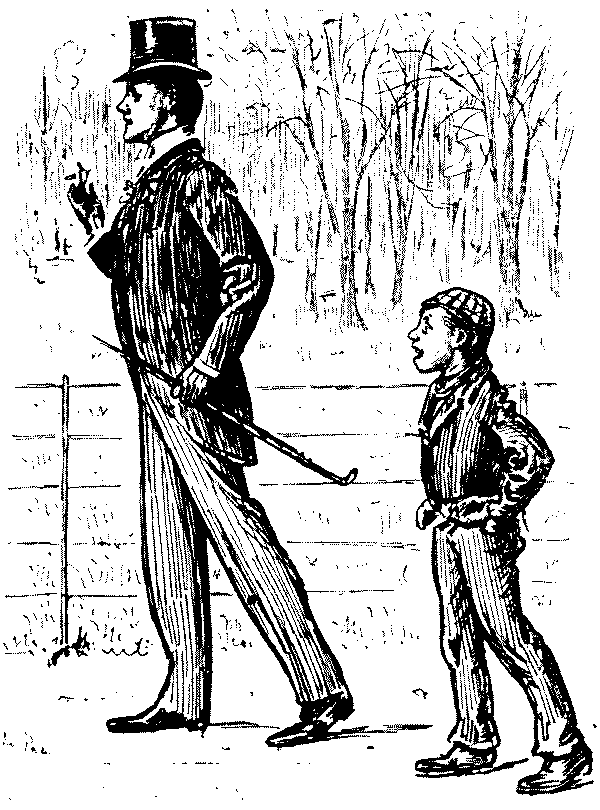
Small Boy (with shrill voice).
"'Fightin'—with—the Sev'nth—Royal Fu-siliers—
The famous Fu-siliers—
The fightin' Fu-siliers,'" &c., &c.
Irritable War-Office Clerk. "Con-found the Seventh Royal Fusiliers! I'm sick of 'em! Blest if I don't pack 'em off to the Channel Islands!"
[Does so.
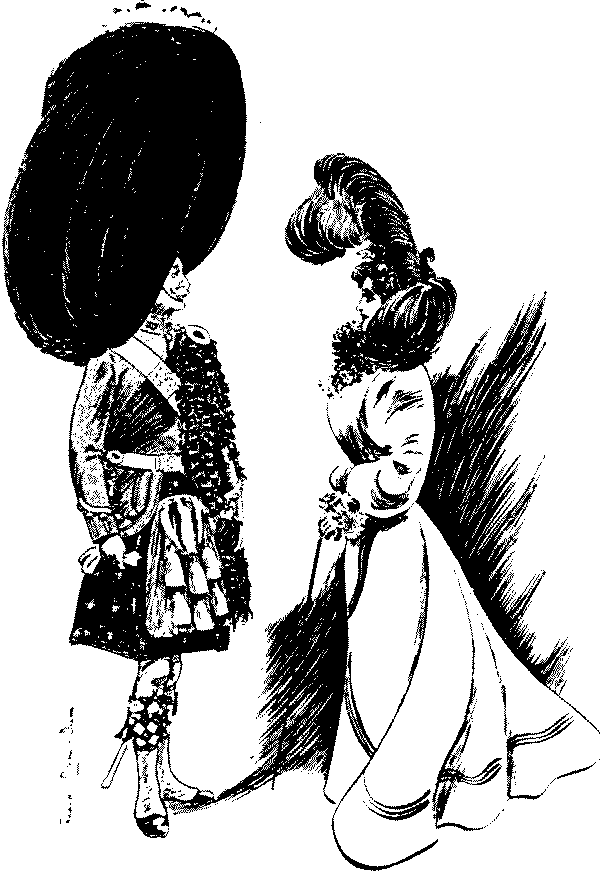
She. "How do you like my new hat?"
Sutherland Highlander. "By Jove, what extraordinary headgear you women do wear!"
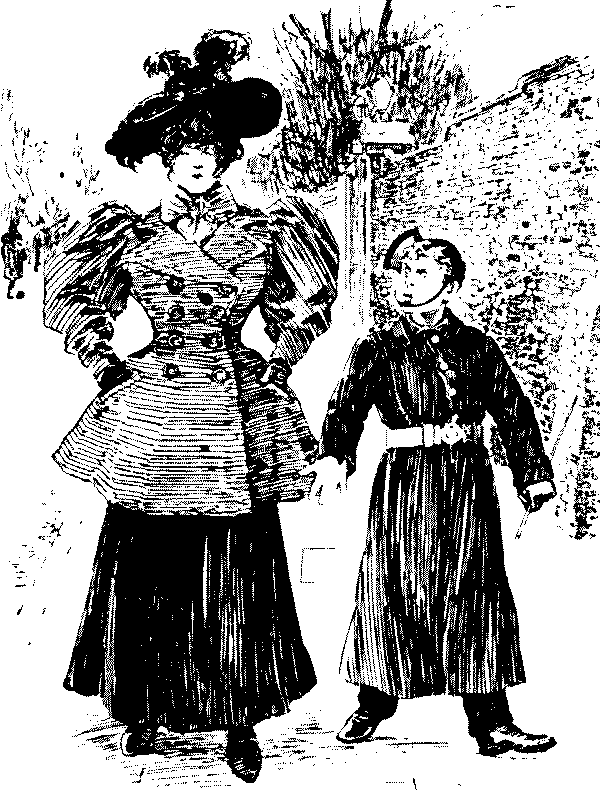
Thomas the Drummer. "Well, Emmar, you needn't take on so. I loves you stright enough; but 'angin' round the barrick gates, askin' for me, is the sort of thing I will not 'ave!"
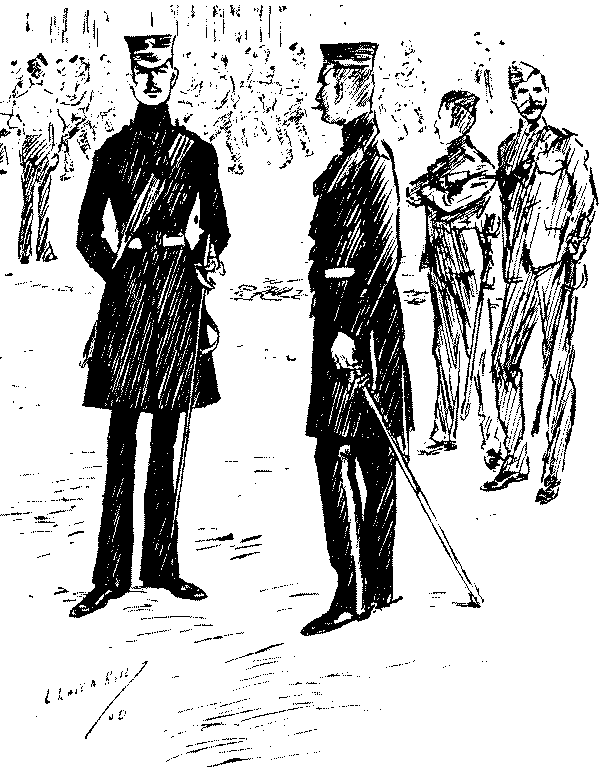
Guardsman. "I just told one of those Volunteer officers that he must not come on parade with his pockets unbuttoned, and the fellow had the demmed impudence to say he was sorry he couldn't oblige me, but his corps hadn't buttons!"

Riding Master. "I thought you said you could ride?"
Candidate for the Imperial Yeomanry. "Ye-yes. But you don't get arf a chance 'ere, the corners are so bloomin' sharp!"
How to make a Recruit.—Take a raw lad from the country (the younger the better) and fill his head with military froth. Add a shilling and as much beer as will be covered by the bounty-money. Let him simmer, and serve him up thick before a magistrate the next morning. Let him be sworn in, and he will then be nicely done.
How to make a Soldier.—Take your recruit, and thrust him roughly into a depôt. Mix him up well with recruits from other regiments until he has lost any esprit de corps which may have been floating upon the surface when he enlisted. Now let him lie idle for a few years until his strength is exhausted, and then, at ten minutes' notice, pack him off to India.
Another Method.—Take your recruit, and place him at headquarters. Let him mix freely with all the bad characters that have been carefully kept in the regiment, until his nature has become assimilated to theirs. For three years pay him rather less than a ploughboy's wages, and make[Pg 78] him work harder than a costermonger's donkey. Your soldier having now reached perfection, you will turn him out of the service with economical dressing.
How to make a Deserter.—A very simple and popular dish. Take a soldier, see that he is perfectly free from any mark by which he may be identified, and fill his head with grievances. Now add a little opportunity, and you have, or, rather, you have not, your deserter.
Another and Simpler Method.—Take a recruit, without inquiring into his antecedents. Give him his kit and bounty-money and close your eyes. The same recruit may be used for this dish (which will be found to be a fine military hash) any number of times.
How to make an Army.—Take a few scores of infantry regiments and carefully proceed to under-man them. Add some troopers without horses and some batteries without guns. Throw in a number of unattached generals, and serve up the whole with a plentiful supply of control mixture.
Another and easier Method.—Get a little ink, a[Pg 80] pen, and a sheet of paper. Now dip your pen in the ink, and with it trace figures upon your sheet of paper. The accompaniment to this dish is usually hot water.
How to make a Panic.—Take one or two influential newspapers in the dead season of the year, and fill them with smartly written letters. Add a few pointed leading articles, and pull your army into pieces. Let the whole simmer until the opening of Parliament. This once popular mess is now found to be rather insipid, unless it is produced nicely garnished with plenty of Continental sauce, mixed with just an idea of invasion relish. With these zests, however, it is always found to be toothsome, although extremely expensive.
The Review at Spithead.—It is wonderful that this affair was not a sad mistake; for there is no doubt that the reviewers were all at sea.
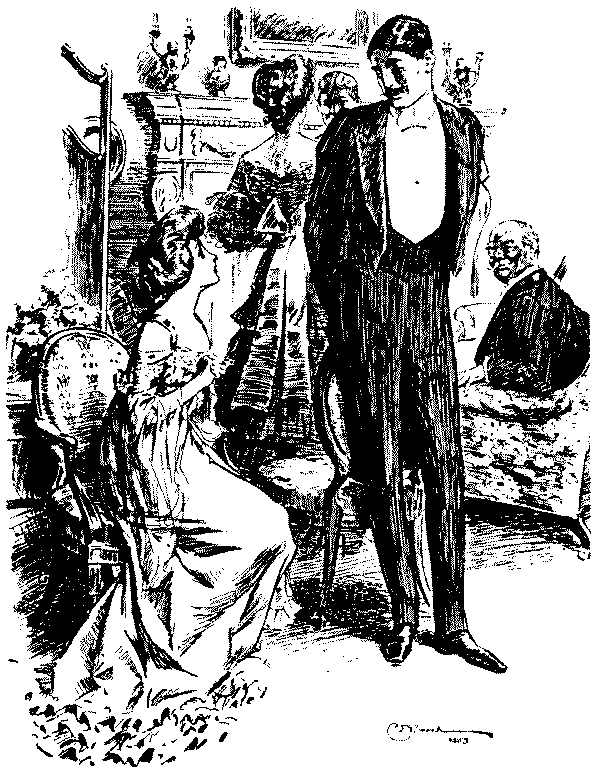
Young Yeomanry Officer (airing his exploits in the war). "And among other things, don't you know, I had a horse shot under me."
Fair Ignoramus. "Poor thing! What was the matter with it?"
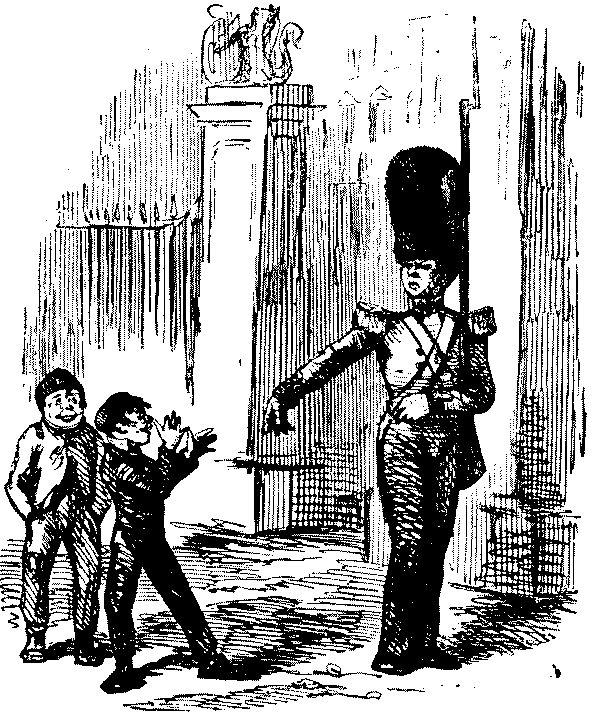
Soldier. "Now, then! You must move away from here."
Rude Boy. "Ah! But you mustn't, old feller!"
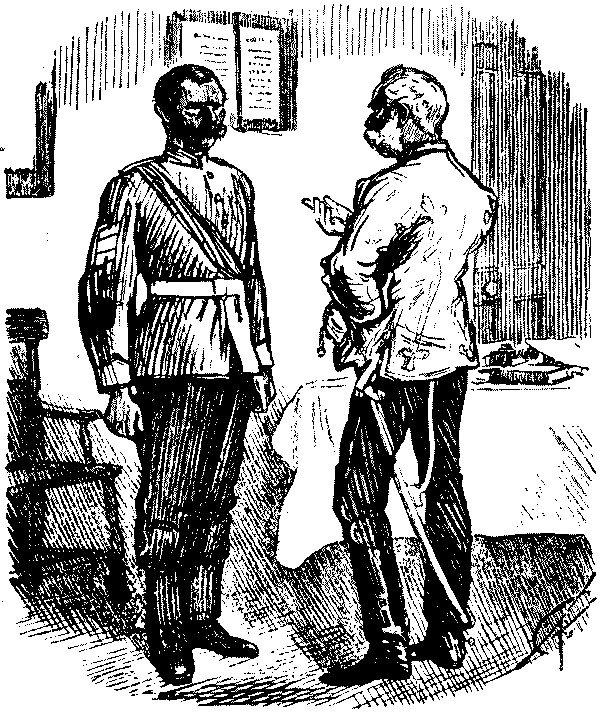
Colonel. "I've never met with a smarter drill than yourself, sergeant, or one more thoroughly up to all his duties; but you've one most objectionable habit, and that is your constant use of bad language, and swearing at the men."
Sergeant. "Sir, perhaps I am a little sarcashtic!"
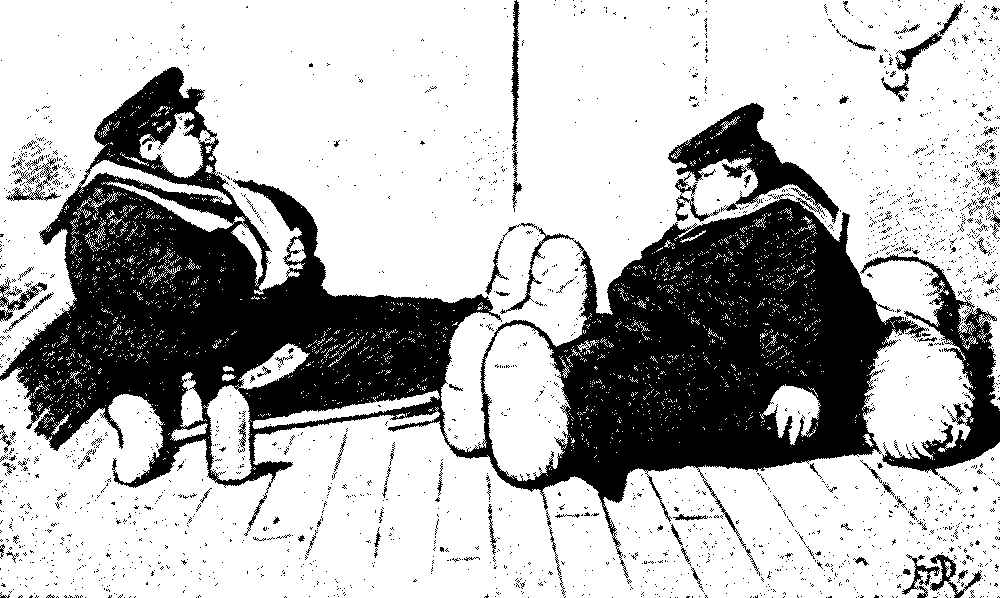
First A.B. "Oh lor, Bill, my big toe!—f-f-f—it's something horful this morning." (Distant whistle.) "Oh yus, that's right! Pipe away! I see hus a clearin' decks for haction, don't you, Bill?"
Second A.B. "No fear! Phew-f-f-f. 'Ere, oh I say, mate, pass us the bicarbonick o' potass, for 'evin's sake!"
["The sailor is allowed 60 ounces of moist food per day, and this is of the wrong kind for a fighting man. This he eats at five different meals. He has about three times as much bread as he should have, and about half as much meat. It is a splendid diet to induce obesity, gout, and laziness."—Dr. Yorke Davies in the "Daily Telegraph."]
Mrs. Ramsbotham tells us her youngest nephew has just become a midshipman in the Royal Navy, and she has given him one of the best aromatic telescopes that could be bought for money.
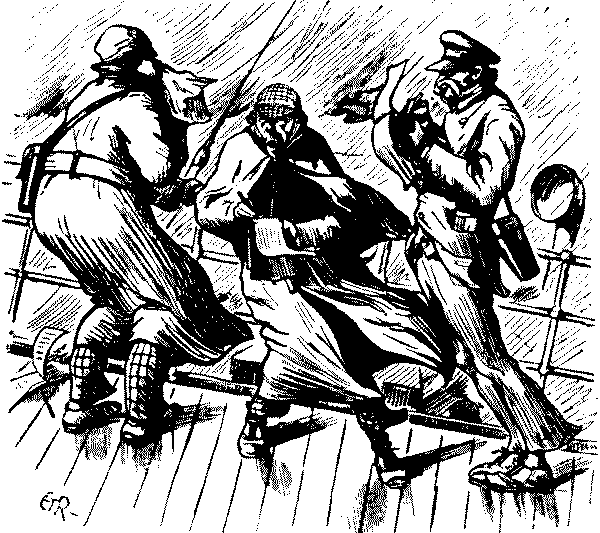
"We are unanimously of opinion that the British fleet should be put as soon as possible on a firmer and more stable basis!!!"
Scene.—A lecture-chamber at a military college. Lecturer discovered behind a table. Students taking notes.
Lecturer. I have now shown you a colonel and a major. I will disappear for a few seconds, and then appear as a captain.
[Dives under his table.
First Student. What's the lecture about? I got in too late for the beginning.
Second Student. It's on "the Militia."
Lecturer (emerging from his table in fresh regimentals.) Now, my men, you must regard me as your friend as well as your commander. I am responsible for your well-being. (Applause, amidst which the Lecturer resumes his ordinary clothing.) And now, gentlemen, it is unnecessary to give you a sketch of a subaltern, as that genus of the army officer must be known to all of you. And before I go I would be glad to answer any questions.
First Student. Thank you, sir. May I ask why you have been giving this interesting entertainment?
Lecturer. Certainly. To show you, gentlemen,[Pg 86] your duty in the Militia. You will be expected to play many parts.
First Student. But surely not simultaneously?
Lecturer. Why, certainly. The old constitutional force is so undermanned in the commissioned ranks, that if the youngest subaltern of a battalion cannot do equally well for colonel, major and captain, the chances are that—well, I would be sorry to answer for the consequences. And now, gentlemen, we will consider how a ballot for soldiering can be established without seriously affecting the cherished rights of the civilian.
[Scene closes upon an unsuccessful attempt to solve the problem.

Captain Smythe (a good soldier, but no society man, to his hostess). "I have to thank you, Mrs. Brown, for an evening which has been—er—after two years on the veld, most enjoyable."
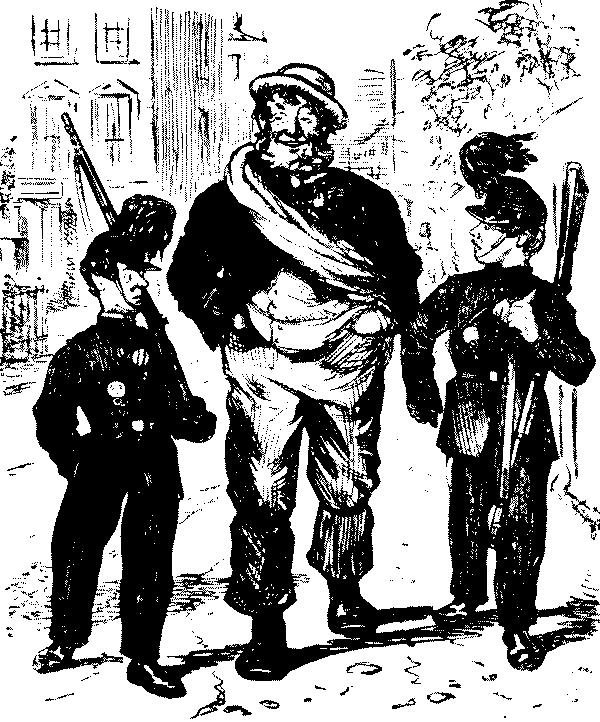
Gigantic Navvy. "Let's walk between yer, gents; folks 'll think you've took up a deserter."
A Memorandum containing a list of rules to be observed during the autumn manœuvres has just been issued. By some strange mistake, the following regulations (which evidently must have appeared in the original document) have been omitted. They are now published for the first time:—
1. Recruits of tender years will not be allowed to draw their bayonets. This rule does not apply to fine growing lads of twelve years old.
2. Buglers will not sound their bugles except by special command of Generals of Divisions. The above-mentioned officers are reminded (for their instruction and guidance) that copper is expensive and should be used as little as possible.
3. Boots will not be worn by the infantry on any march exceeding three miles. Commanding officers are cautioned that shoe-leather has recently greatly increased in value.
4. In the event of two members of the umpire staff being unable to come to an agreement about[Pg 92] the respective colours of black and white, they will "draw lots;" id est, one of them will throw into the air a coin of the realm, and before the coin is able to reach the ground, the other will give the word either "heads" or "tails." The choice of cries will be optional. Gold coins will be used by general officers, silver by field officers, and halfpence by all other ranks.
5. Dismounted cavalry will not be allowed to pursue retiring infantry on horseback, unless so ordered by the Commanding Officers of the 83rd (County of Dublin), 85th (the King's County Down), the Connaught Rangers, and the Royal Irish Fusiliers.
6. Should a regiment of infantry halt within two hundred yards of six hostile batteries of artillery to watch the practice, or for any other purpose of instruction, one-tenth of the battalion will be marched to the rear, and will be considered hors de combat during the remainder of the campaign.
7. A village containing one pioneer, one drummer (or bugler) and a quarter-master-sergeant, will be considered fully garrisoned. It will be seen that rules of war are to be followed in every particular,[Pg 94] down to the very smallest details, by all concerned in the campaign.
8. As in the previous series of autumn manœuvres, at least, "five minutes' notice" will be given when the army is required to march five miles, or to perform any other military duty requiring zeal, steadiness, and an intimate acquaintance with "Field Exercises, Edition of 1874, Part I."
Jawkins. Why do they always call sailors "tars"?
Pawkins.—Because they're so accustomed to the pitching of the ship.
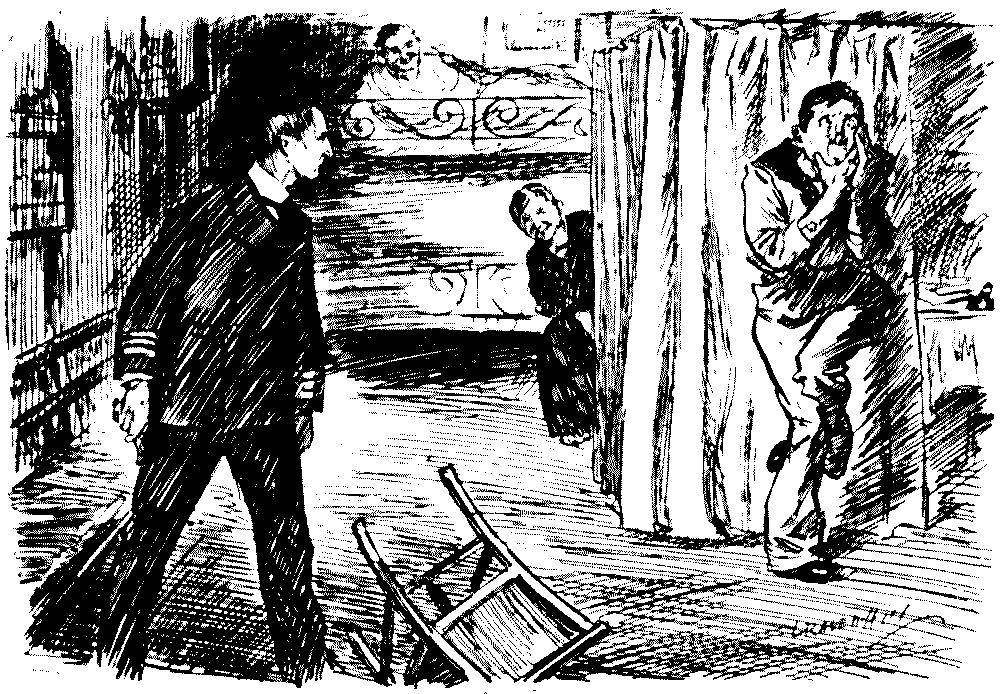
Bluejacket (who has been hauled twice round the sick bay, yelling inarticulately, by the surgeon with the forceps). "Why, you 'ad me by the tongue!"

Irritable Captain. "Your barrel's disgracefully dirty, sir, and it's not the first time; I've a good mind to——"
Private Flannigan. "Shure, sor, I niver——" Captain (Irish too). "Silence, sir, when you spake to an officer!"
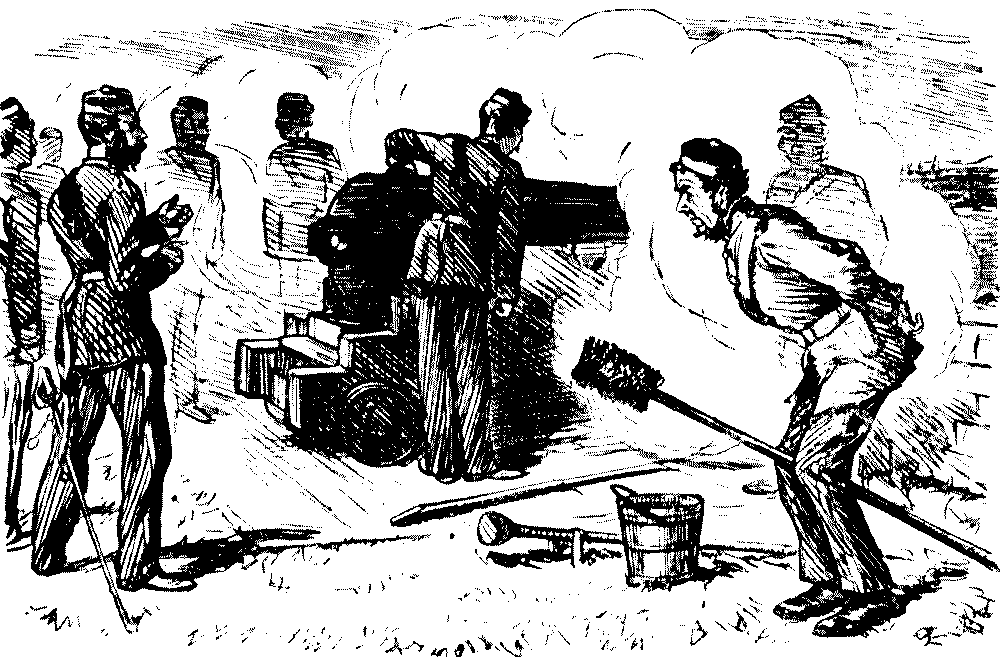
Officer in charge of battery (in a fever lest the time of firing should be a second late). "Why, what are you about, No. 6? Why don't you serve the sponge?"
Bombardier McGuttle. "Hoots toots! Can na' a body blaw their nose?"
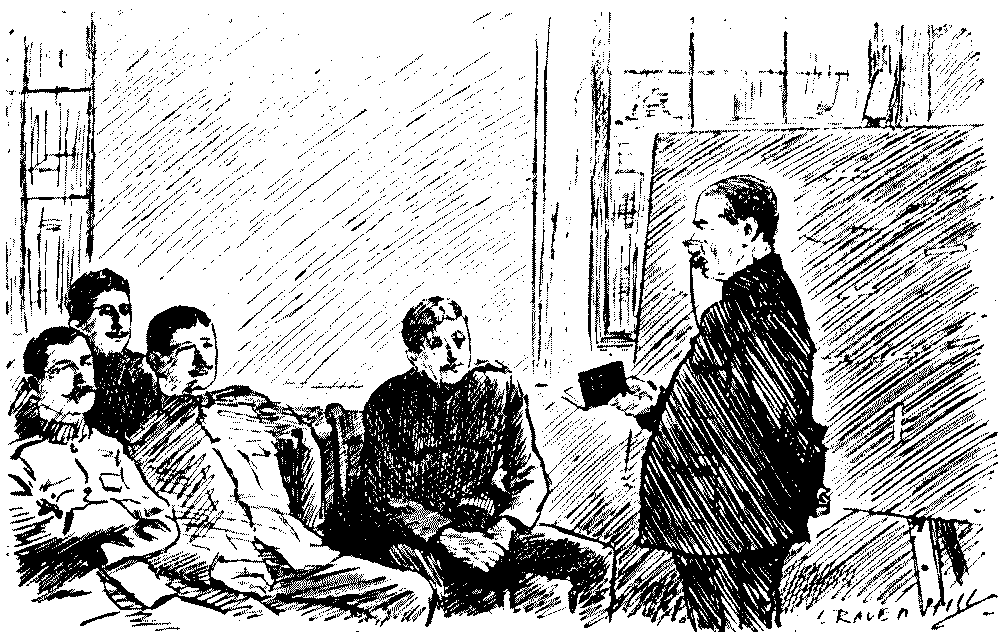
Instructor. "Well, gentlemen, I have endeavoured to explain to you the theoretical principles governing the movements of the various portions of a combined force; but I must warn you, that, in practice on an ordinary field-day, you will probably find it result in hopeless confusion; while on active service it will be ten times worse!"
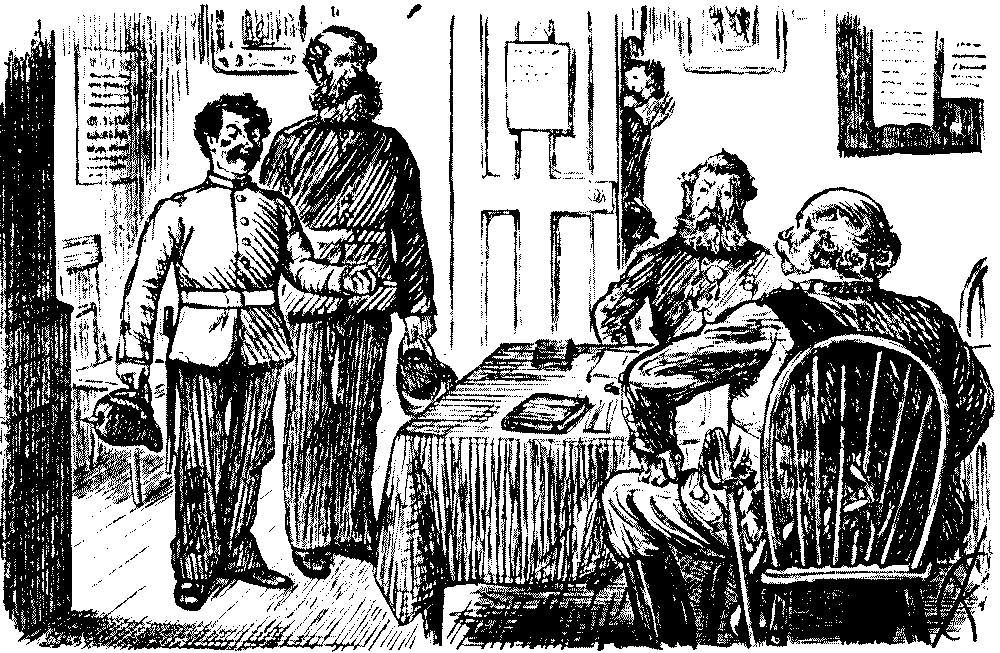
Volunteer Colonel (swell brewer). "I'm afraid, Mr. Jenkins, you had been indulging in potations that were too strong for you!"
[Private J. was being "called over the coals" for insubordination at the inspection.
Private Jenkins (who is still wearing his bayonet on the wrong side). "Oh, I couldn't have been drunk, sir, for I never had no more than one pint o' your ale all the blessed day!"
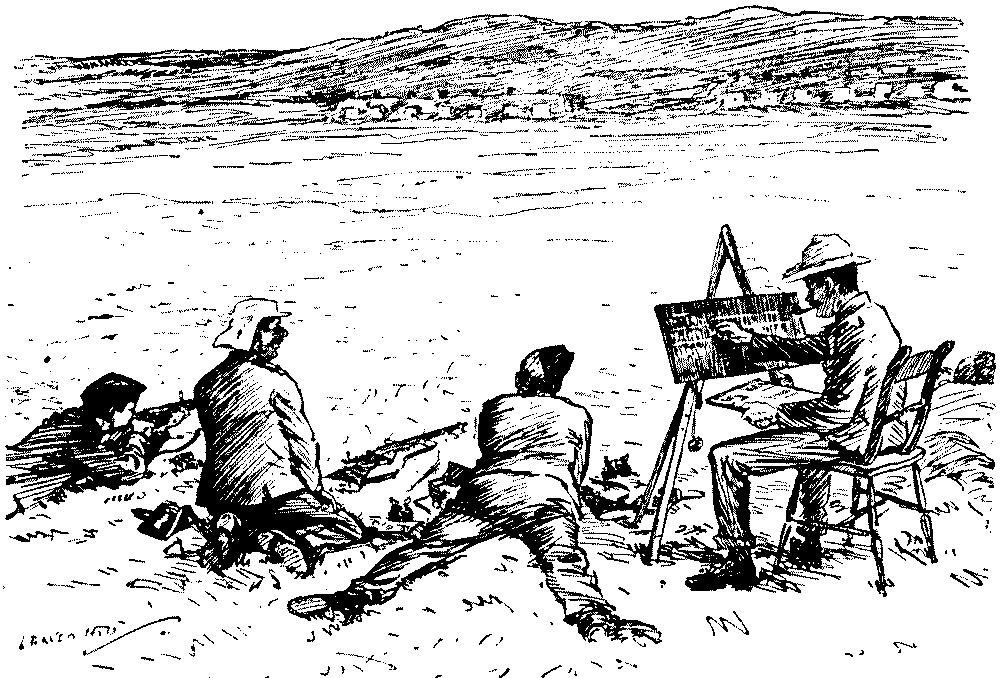
Register-keeper. "Major Jones first to count. A miss—nothing."
Major Jones. "I say, sergeant, that's almost an Irish bull, I fancy!"
Register-keeper. "No, sorr, just a simple English miss!"
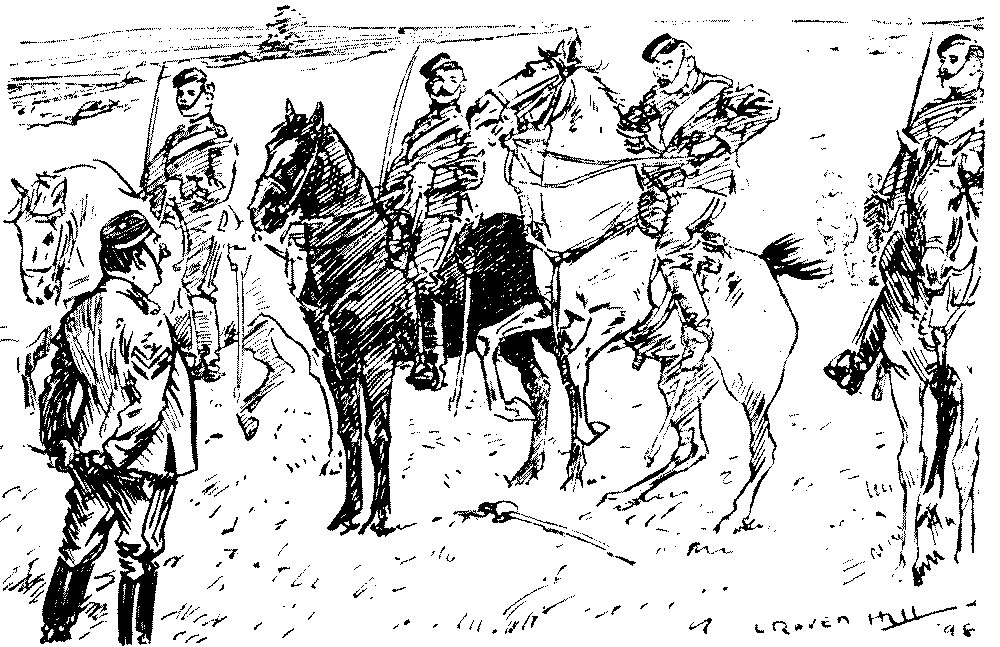
Sergeant Major. "Number three, where's your sword?"
Recruit (who finds practice very different from theory). "On the ground. Carn't see 'un?"
Scene.—The drawing-room of the Colonel's quarters, decorated with trophies from many lands and water-colour sketches. Mrs. Bulkwise, the Colonel's wife, a tall, broad and assertive lady, is giving tea to Mrs. Lyttleton-Cartwright, with the stamp of fashion upon her, and Mrs. Karmadine, who has a soul for art—both ladies of the regiment. Colonel Bulkwise, a small and despondent man whose hair is "part-worn" gazes morosely into the fire.
Mrs. Bulkwise (waving a tea cup). As surely as woman is asserting her right to a place in medicine, in law, and in the council, so surely will she take her proper place in the control of the army.
Mrs. Lyttleton-Cartwright. What a lovely costume one could compose out of the uniform. I've often tried Jack's tunic on.
Mrs. B. (severely). The mere brutal work of fighting, the butchery of the trade, would still have to be left to the men; but such matters as require higher intelligence, keener wit, tact, perseverance, should be, and some day shall be, in our hands.
Mrs. Karmadine. And the beauty and grace of life, Mrs. Bulkwise. Surely we women, if allowed, could in peace bring culture to the barrack-room, and garland the sword with bay wreaths?
Mrs. B. Take the War Office. I am told that the ranks of the regiments are depleted of combatant officers in order that they may sit in offices in Pall Mall, and do clerical work indifferently. Now, I hold that our sex could do this work better, more cheaply, and with greater dispatch.[Pg 102]
Mrs. L.-C. "Pall-Mall" would be such an excellent address.
Mrs. B. The young men, both officers and civilians, who are employed waste, so I understand, the time of the public by going out to lunch at clubs and frequently pause in their work to smoke cigars and discuss the odds. Now a glass of milk, or some claret and lemonade, a slice of seed-cake, or some tartlets, brought by a maid from the nearest A. B. C. shop would satisfy all our mid-day wants.
Mrs. L.-C. And I never knew a woman who couldn't work and talk bonnets at the same time.
Mrs. C. Just a few palms—don't you think, Mrs. Bulkwise?—in those dreary, dreary rooms, and some oriental rugs on the floors, and a little bunch of flowers on each desk would make life so much easier to live.
[Colonel Bulkwise murmurs something unintelligible.
Mrs. B. What do you say, George?
Colonel B. (with sudden fierceness). I said, that there are too many old women, as it is, in the War Office.[Pg 104]
Mrs. B. George!
[The colonel relapses again into morose silence.
Mrs. B. The Intelligence Department should, of course, be in our hands.
Mrs. L.-C. I should just love to run about all the time, finding out other people's secrets.
Mrs. B. And the Clothing Department calls for a woman's knowledge. The hideous snuff-coloured garments must be retained for warfare, but with the new costume for walking out and ceremonial I think something might be done.
Mrs. L.-C. The woman who makes my frocks is as clever as she can be, and always has her head full of ideas for those sort of things.
Mrs. C. Michel Angelo did not disdain to design the uniform of the Swiss Guard. Perhaps Gilbert, or Ford, or Brock might follow in the giant's footsteps.
Col. B. You ladies always design such sensible clothes for yourselves, do you not?
[He is frozen into silence again.
Mrs. B. And the education of young officers. From a cursory glance through my husband's books on law, topography and administration, I[Pg 106] should say that there are no military subjects that the average woman could not master in a fortnight. Strategy, of course, comes to us by intuition. The companionship and influence of really good women on youths and young men cannot be over-rated, and the professors both at the Staff College and at the Military Academy should be of our sex.
Mrs. L.-C. I always love the boys; but I think some of the staff college men are awfully stuck up.
Mrs. B. Now as to the regiment. The mess, of course, should be in our province.
Mrs. L.-C. How ripping. The guest-nights would be lovely dinner parties, the ante-room we'd use for tea, and the band should always play from 5 to 6. We'd have afternoon dances every Thursday, and turn the men out once a week and have a dinner all to ourselves to talk scandal.
[The colonel groans.
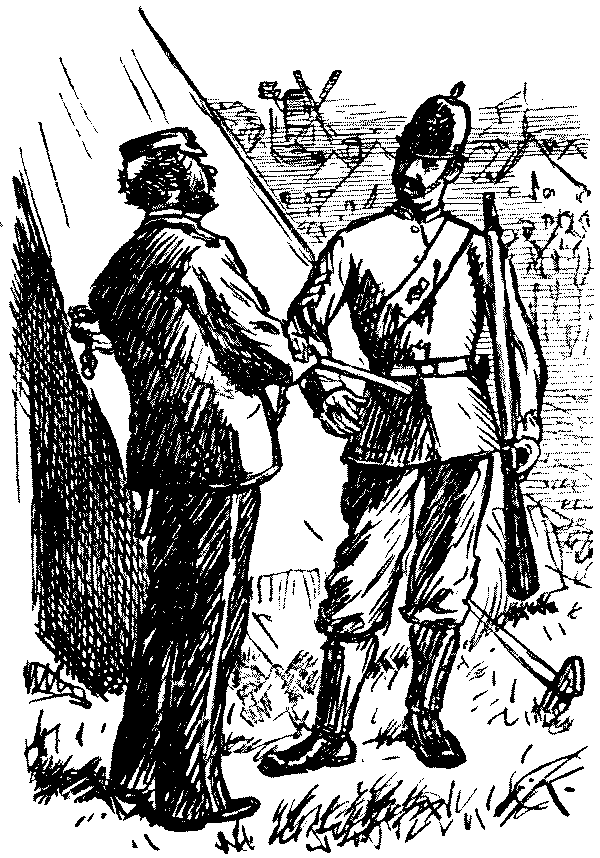
Volunteer Captain. "Ah, Sergeant Jones—didn't I send you an order to be at headquarters on Monday, at nine o'clock, with a corporal and six men for duty?"
Sergeant. "Yes, sir. But I think if there was a little more 'request', and a little less 'order', it would be (a-hem)—better!"
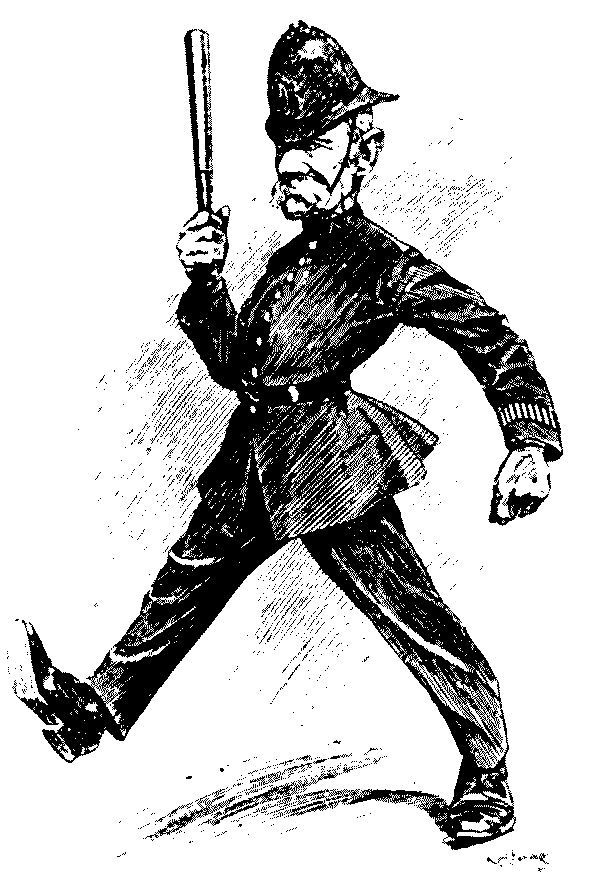
["Coronation Claims.—There being no succession to certain offices, the appointment thereto rests with His Majesty, and the following are regarded as probable candidates:—Lord High Constable—The Earl Roberts," &c.—Vide Daily Mail, Nov. 19, 1901.]
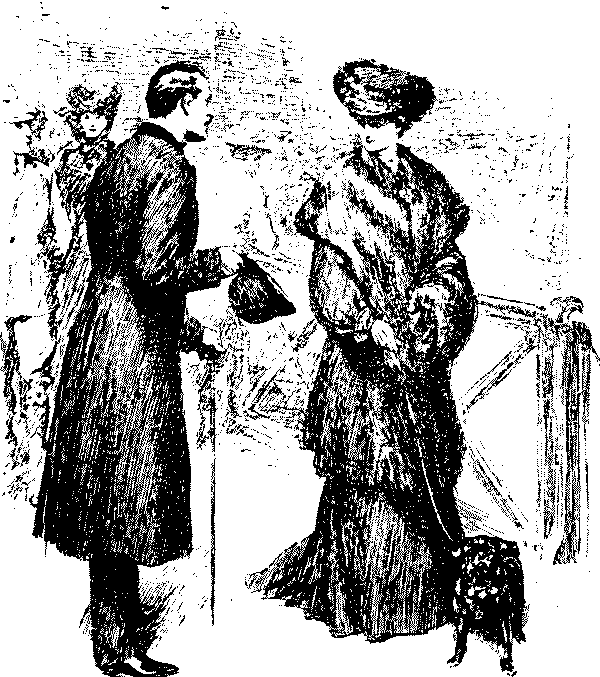
The Gallant Major. "I beg a thousand pardons for the apparent liberty I take as an entire stranger, but may I make so bold as to ask you, is not this one of that wonderful breed of black or Chinese pugs?"
The Pretty Lady (most condescendingly). "Yes, you are perfectly right, and if I am not mistaken, you are Major McBride, of the Ninety-ninth Hussars."
[From that moment they became fast friends, and within the next three months there appeared in the "Morning Post," 'A marriage has been arranged between Major McBride, of the Ninety-ninth Hussars, and Mrs. Bellairs,' &c., &c.
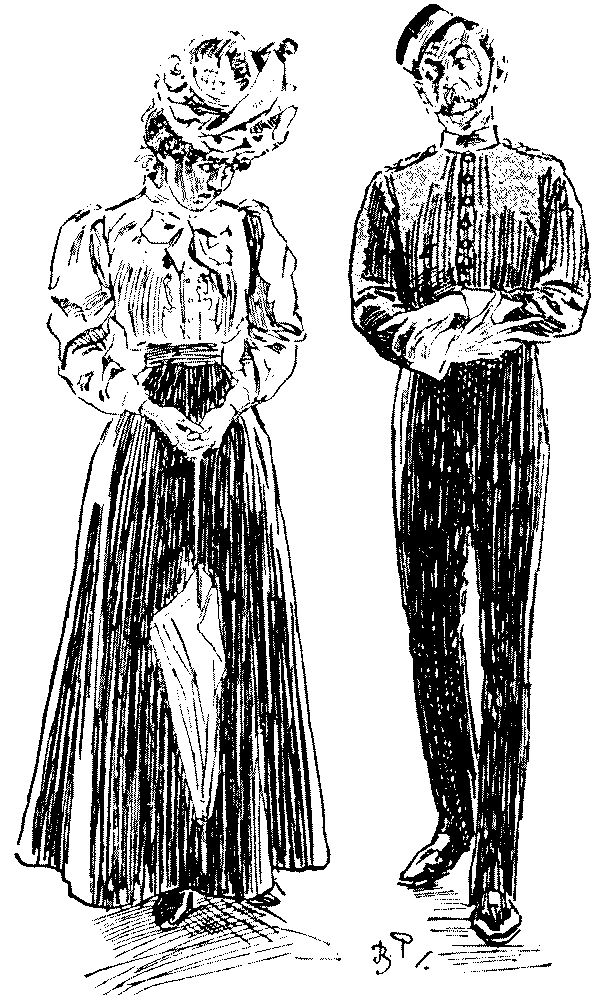
["It has been decreed in several line battalions that in future no soldier will be allowed to walk arm-in-arm in the street with a female."—Daily Paper.]
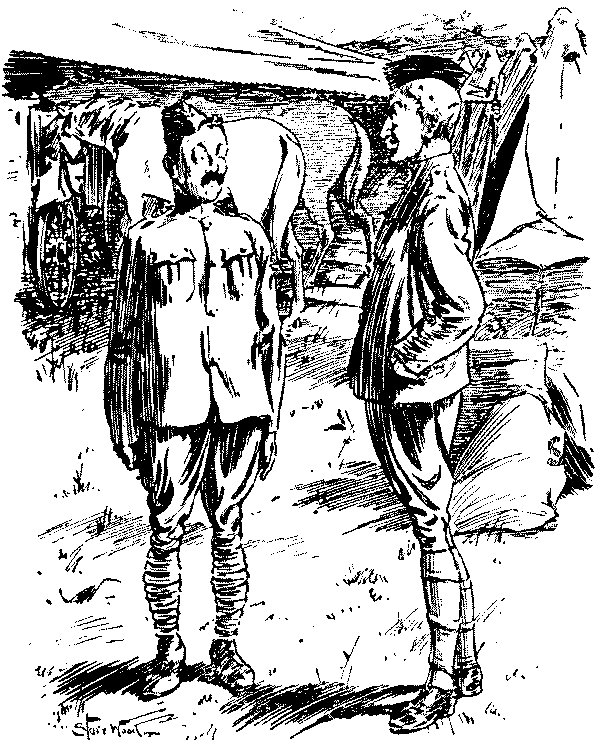
Doctor. "Don't feel well, eh? Appetite all right?"
Tommie. "Eat like a wolf, sir."
Doctor. "Sleep well?"
Tommie. "As sound as a dog, sir."
Doctor. "Oh, you'd better see the vet.!"
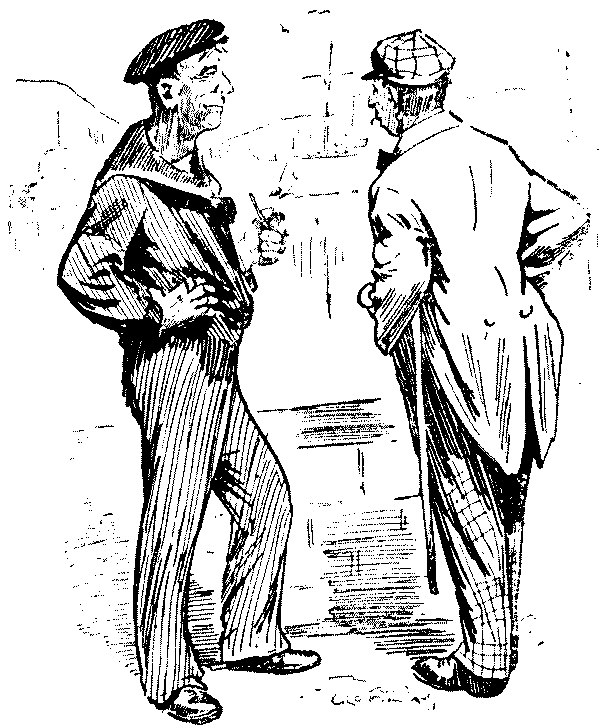
Lubber. "I say, Jack, do you know why they've painted the ships grey in time of peace?"
Jack. "I s'pose 'cos it's a neutral tint!"
[But the other didn't laugh. He intended making that witticism himself.

"I say, why am I like the Queen's chief cook? Do you give it up?"
"Yes."
"Because I am in a high cool-and-airy (culinary) position."
[Astonished cadet nearly falls from the yard.
You young monkey, how dare you joke up in the air like that? However, we look over it this time.—Punch]
1. Never recognise your enemy when you meet him on the road, in case you might be compelled to take him prisoner and so cause unpleasantness and unseemly disturbance.
2. Advanced guards should walk quietly and without ostentation into the enemy's main body, and be careful never to look behind bushes, trees, or buildings for an unobtrusive cyclist patrol. To do so might cause the enemy annoyance.[Pg 114]
3. An advance guard, if surrounded, will surrender without noise or alarm. To make any would disturb the main body, who like to march in a compact and regular formation.
4. Never allow your common-sense to overcome your natural modesty so far as to induce you to report to a superior officer the presence of the enemy in force. You will only acquire a reputation for officiousness by doing so.
5. Always attack an enemy in front. It is unsportsmanlike and unprofessional to attack the flanks.
6. When retiring before an attack maintain as close a formation as the ground will admit of, and retire directly upon the main infantry support. You will thus expose yourselves to the fire of both your own friends and the enemy, and as blank cartridge hurts nobody it will add to the excitement of the operation.
7. It is more important to roll your cloaks and burnish your bits than to worry about unimportant details of minor tactics.
8. Since a solitary horseman never attracts the enemy's attention, be careful to take up a position[Pg 116] in compact formation; to do so by files might escape observation.
9. When being charged by the enemy, go fours about and gallop for all you are worth; it is just as agreeable to be prodded in the back as in the chest, and gives the enemy more satisfaction. To extend, or work to the flanks, might deprive your enemy of useful experience.
10. Never cast your eyes to the direction from which the enemy is not expected, as that is the usual direction of his real attack, and it is not polite to spoil the arrangement of your friend the enemy.
11. Lastly, remember that the best motto for Yeomanry Troopers is "Point de Zèle."
Some talk of an invasion
As a thing whereat to sneeze,
And say we have no occasion
To guard our shores and seas:
Now, Punch is no alarmist,
Nor is moved by idle fears,
But he sees no harm that we all should arm
As Rifle Volunteers!
[Pg 118]Let sudden foes assail us,
'Tis well we be prepared;
Our Fleet—who knows?—may fail us,
Nor serve our shores to guard.
For self-defence, then, purely,
Good reason there appears,
To have, on land, a force at hand
Of Rifle Volunteers!
To show no wish for fighting,
Our forces we'd increase;
But 'tis our foes by frighting
We best may keep at peace,
For who will dare molest us
When, to buzz about their ears,
All along our coast there swarms a host
Of Rifle Volunteers!
Abroad ill winds are blowing,
Abroad war's vermin swarm;
What may hap there's no knowing,
We may not 'scape the storm.
Athirst for blood, the Eagles
May draw our dove's nest near;
But we'll scare away all birds of prey
With our Rifle Volunteers!
No menace we're intending,
Offence to none we mean,
We arm but for defending
Our country and our Queen!
To British hearts 'tis loyalty
'Tis love her name endears:
Up! then, and form! shield her from harm
Ye Rifle Volunteers!
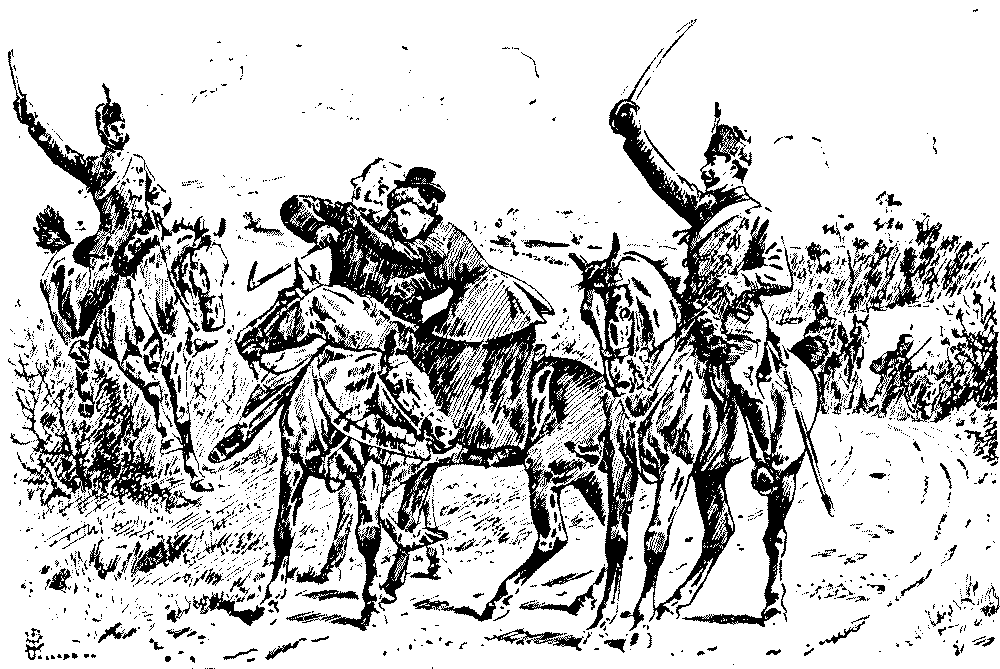
The above is not a war picture. It merely represents an incident in the too realistic scouting manœuvres of the Blankshire Yeomanry. Poor Mr. and Mrs. Timmins thought at least the country had been invaded.

De Vœux. "My grandfather, you know, lived till he was ninety-eight."
Trevor Carthew. "Well, my grandmother died at the age of ninety-seven."
Brown. "In my family there are several who are not dead yet!"
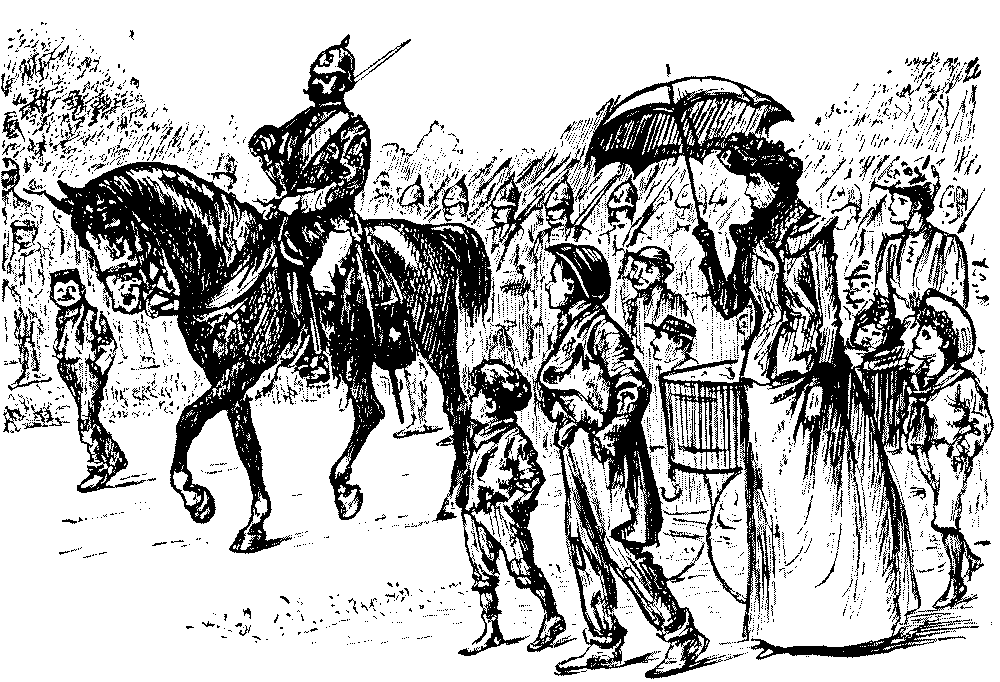
Small Boys (to Volunteer Major in temporary command). "I say, guv'nor—hi! Just wipe the blood off that 'ere sword!"
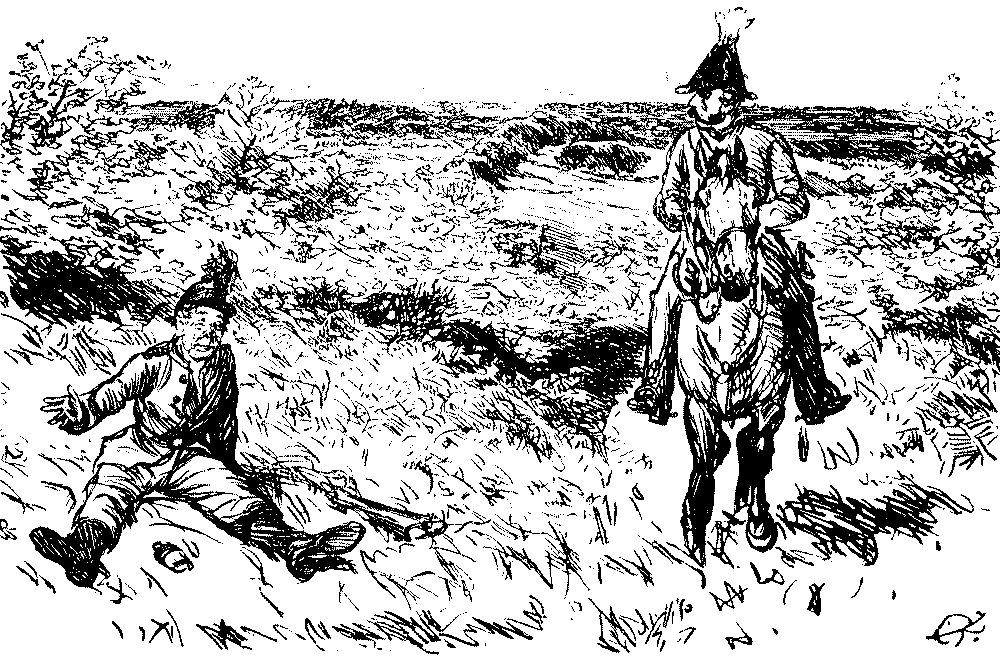
Aide-de-Camp (at the review). "What are you doing here, sir? Where's your regiment?"
Party on the Grass. "Shure I don' know. Bu-r I don't rec'nise your 'thority, gov'nour!"
Aide-de-Camp (furious). "What the deuce d'you mean, sir? You're a Volunteer, aren't you?"
Party on the Grass. "(Hic!) Norabirofit!—Was jus' now—bu-r I've reshigned 'n cons'quence—temp'ry indishposition!"
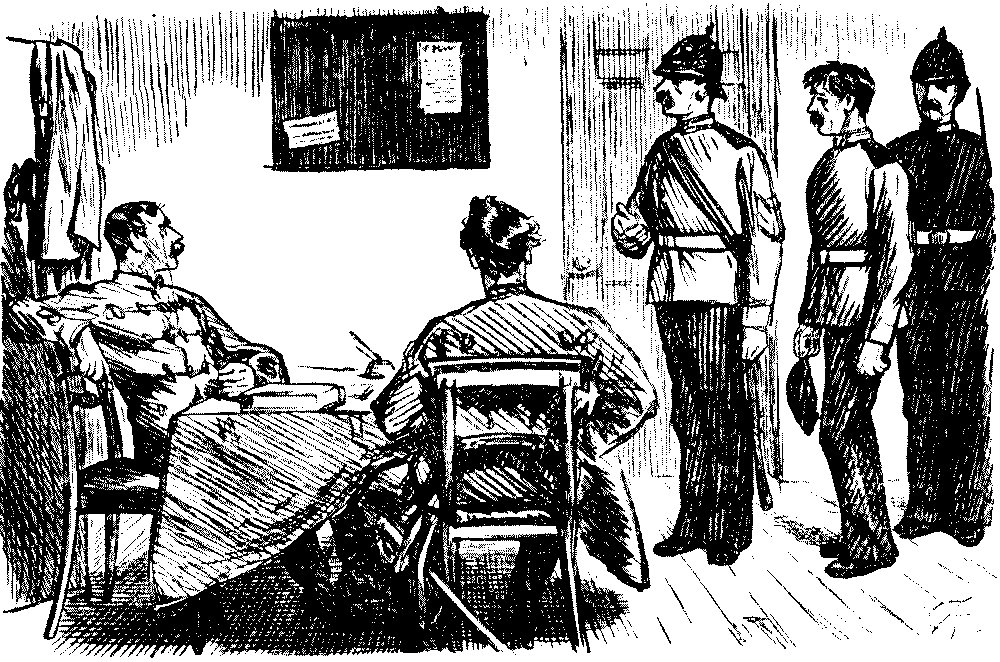
Captain. "What's the charge, sergeant?"
Sergeant. "This time it's drunkenness, sir. But this man is the most troublesome fellow in the regiment, sir. He goes out when he likes, and comes in when he likes, and gets drunk when he likes—in fact, he might be a horficer!!"
Brown, Jones, and Robinson, discovered discussing the stats of the Navy in a first-class compartment.
Brown. My dear fellows, I can assure you we are in a terrible condition of unpreparedness. If France was to declare war to-morrow we should be nowhere—absolutely nowhere!
Jones. You mean, of course, with Russia.
Robinson. Or was it Italy?
Brown. It doesn't matter which. I fancy that France alone could tackle us. Why, a man was telling me the other day that if Gibraltar was seized—as it might be—we should not get a ship-load of wood for months—yes, for months!
Jones. But what has Gibraltar to do with it?
Robinson. Why, of course, it guards our approaches to the Suez Canal.
Brown. Oh, that's only a matter of detail. But what we want is a hundred millions to be spent at once. Cobden said so, and I agree with Cobden.
Jones. But upon what?
Robinson. Oh, in supporting the Sultan, and subsidising the Ameer.
Brown. I don't think that sort of thing is of much importance. But if we had a hundred millions (as Mr. Cobden suggested), we might increase our coaling stations, and build new ships, and double the navy, and do all sorts of things.
Jones. But I thought we were fairly well off for coaling stations, had lots of ships on the stocks, and, with the assistance of our merchant marine, an ample supply of good sailors.[Pg 128]
Robinson. That's what all you fellows say! But wait till we have a war, then you will see the fallacy of all your arguments. No, we should buy the entire fleet of the world. There should be no other competitor. Britannia should really rule the waves.
Brown. Yes, yes. Of course; but after all, that is not the important matter. What we want is a hundred millions available to be spent on anything and everything. And it's no use having further discussion because that was Cobden's view of it, and so it is mine.
Jones. Where is it to come from—out of the rates?
Brown and Robinson (together). Certainly not.
Jones. Or the taxes?
Brown and Robinson (as before). Don't be absurd.
Jones. Well, it must come from somewhere! Can you tell me where?
Robinson. Why should we?
Brown. Yes, why should we? Even Cobden didn't go so far as that, and——But, here we are at the station.
[Invasion of porters, and end of the conversation.

"I'm afraid Milly and I have put our respective feet in it this time. We thought we would test our capacities at hospital work, and attach ourselves to pa's regiment—of course, without telling pa—and were getting along quite nicely with a soldier who wasn't very well, when we met pa and the General and his regiment. They took away the patient, and judging from pa's looks, there's a warm time coming."
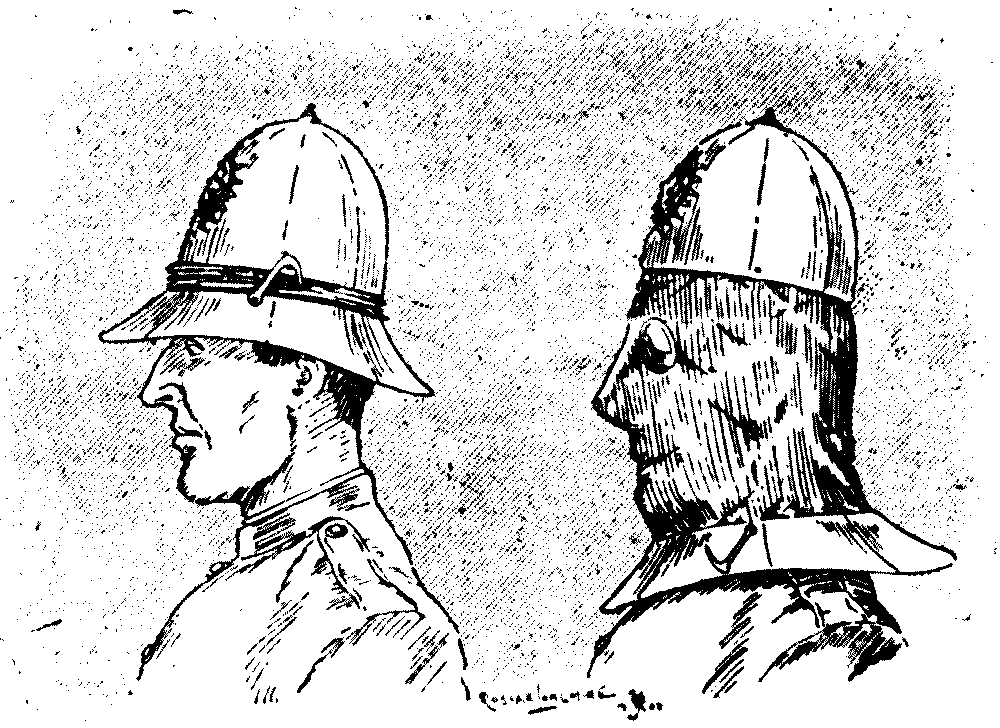
The new helmet as ordinarily worn. The same, as worn on motor duty.
Directions:—Simply unhook the lower portion of the helmet; thereby extending the collapsible weather-and dust-proof mask. Admirable also as a disguise.
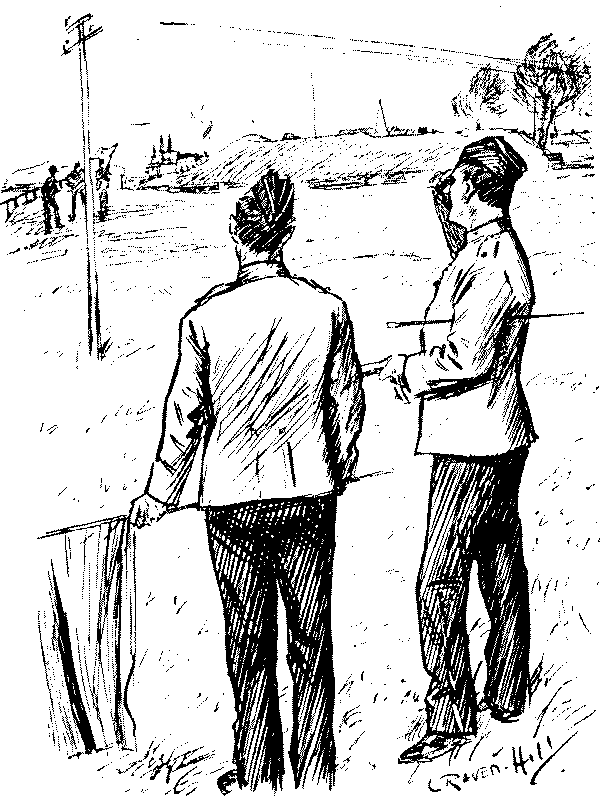
Sergeant of Signallers. "What ai's Murphy to-day? He don't seem able to take in a thing!"
Private Mulvaney. "Shall I signal to 'im, 'Will ye 'ave a drink?'?"
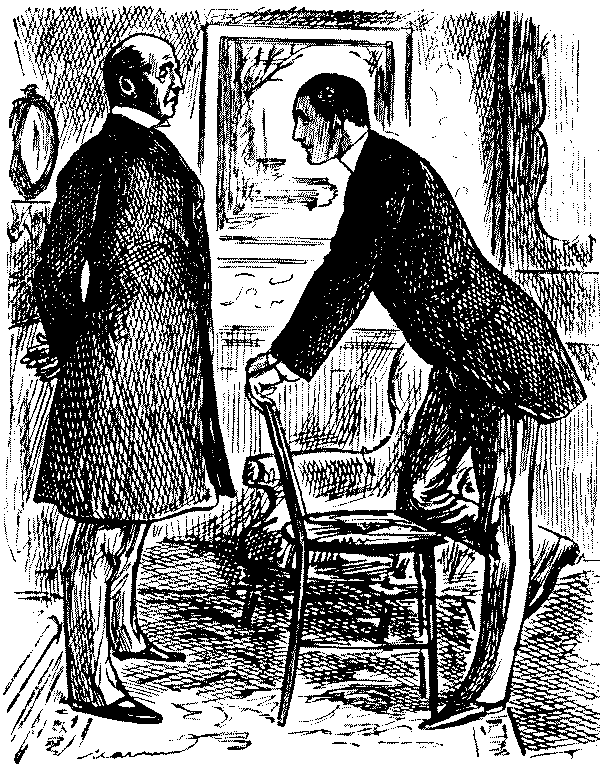
Army Candidate. "And I only muffed one thing in the geography paper. Couldn't for the life of me think where the Straits of Macassar were!"
Fond Father. "Oh, I say, you ought to have known that. Fancy—the Straits of Macassar!"
Army Candidate. "Well, I didn't, anyhow. By the way, where are they, dad?"
Fond Father. "Oh—where are they? Oh—er—they're—well, they're—— but don't you think we'd better go to lunch?"
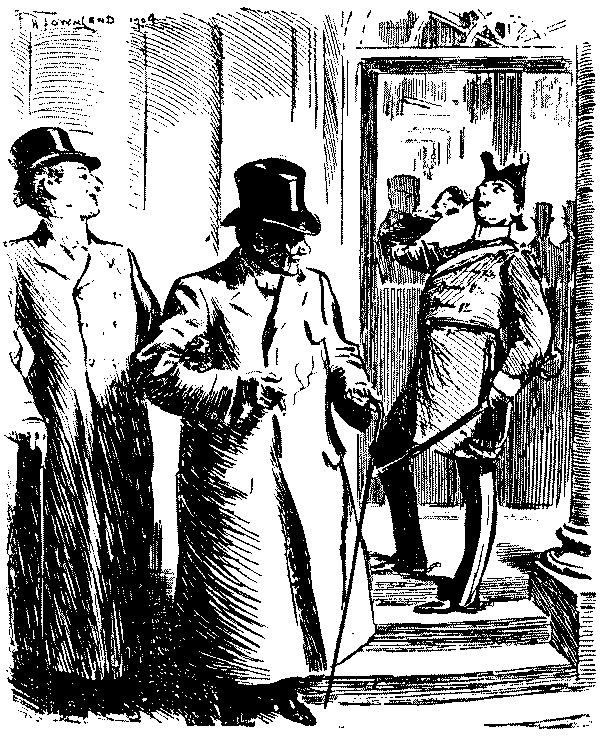
Club Wag. "Well, good-night, Admiral."
Warrior. "There's a stupid joke. Admiral! Can't you see my spurs?"
Wag. "Oh, I thought they were your twin screws."
Scene.—The canteen of the Rutlandshire Regiment, at Downboro', an airy, plastered hall with high windows. A bar at one end is backed by a rampart of beer barrels. A double line of barrack tables and benches runs down the room. The hour is 5 p.m. At one of the tables sits Mr. W. Wilson, late Private in the regiment, in all his glory of a new check suit with an aggressive pattern, a crimson tie, a horseshoe pin, an aluminium watch-chain, a grey "bowler" and a buttonhole of violets. Privates W. and G. Smith, P. Brady, E. Dudd and other men of H. company are at the table, or standing near it.
Mr. Wilson (passing round a great tin measure containing beer, after taking a preliminary pull himself). Of course I do 'ear more, being in the smoke, than you 'ear down in this provincial 'ole; and there's[Pg 134] generals and statesmen and such-like comes and stays at our place, and when they gets tied up in a knot over any military question, as often as not they says, "Let's ask Wilson, the under-gardener. 'E's a hex-military man; 'e's a 'ighly intellergent feller"; and I generally gets them out of their difficulty.
Pte. W. Smith. D'ye know anything about this army reform?
Mr. Wilson (with lofty scorn). Do I know anything about it?
Pte. G. Smith. D'ye think they're going to make a good job of it?
Mr. Wilson. Naaw. And why? Becos they're goin' the wrong wai to work. They're arskin the opinion of perfeshernal hexperts and other sich ignoramuses, and ain't goin' to the fountain 'ead. Oo's the backbone of the English service?
Pte. P. Brady. The Oirish private.
Mr. Wilson. Right you are, my 'Ibernian—always subsitooting British for Hirish—and the British compiny is the finest horganisation in the world. Give the private a free 'and and a rise of pay, and make the compiny the model of the[Pg 136] army, and then yer can put all the hexperts and all the Ryle Commissions and their reports to bed.
Pte. Dudd. As how?
Mr. Wilson. As 'ow, yer old thick head? It's as plain as a pike-staff. Taike this question of responsibility. When some one comes a bloomer, and the paipers all rise 'ell, the civilian toff, 'oos a sort of a commander-in-chief in a Sunday coat and a chimney-pot 'at, 'e says, "It ain't me. Arsk the real commander-in-chief," and the feeld-marshal 'e says, "Arsk the hadjutant-general," and the hadjutant-general, 'e says, "Arsk the hordnance bloke." Now in the compiny there ain't none of that. If the colonel goin' round at kit inspection finds the beds badly made up, or jags and sight-protectors deficient, or 'oles in the men's socks, 'e goes fierce for the captin' and threatens to stop 'is leave; and the captin' don't say, "Oh, it's the hadjutant, or the quarter-master, or the chaplain what's to blame," no, 'e gives the subalterns and the coloured-sergeant beans, and they slip it in to the sergeants and corprils in charge of squads, and the beds is set up straight, and the men put down[Pg 138] for jags and sight-protectors, and the 'oles in the socks is mended.
Pte. W. Smith. That's so, old pal. What else would you recermend?
Mr. Wilson (reaching out for the measure). Thank yer. This 'ere army-reforming's a dry job. Now as to the metherd of attack. When the regiment goes out field-firing the henemy's a line of hearthenware pots, touched up on the sly by the markers with a dash of white; the captains count the telergraph posts up the range and give the exact distance; and the men goes 'opping along in line like crows on a ploughed field, the sergeantes a-naggin' 'em about the 'Ithe position and the coprils calling them back to pick up empty cartridge cases. Is that the wai, that you, George Smith, and you, Bill, and you, Pat, used ter creep up to the rabbit warrens when we used ter go out in the herly morning to assist the farmers to keep down the ground gime—poaching the colonel called it? No, we hexecuted wide turning movements and never showed no more than the tip of a nose. Let drill of attack alone, I say, and develop the sporting hinstinct of the private.[Pg 140]
Omnes. 'Ear, 'ear.
Mr. Wilson. And this matter of mobility. Why, if you or me or any of us was on furlough at 'Ampstead or Margit, we was never off a 'orse's or a moke's back as long as the dibs lasted. Give us the brass, and we'll find the mobility.
Pte. W. Smith. Why don't yer write to the Prime Minister, and give him your ideas?
Mr. Wilson. I shall. A few hintelligent ex-privates in the Cabinet, a rise of pay for privates and two days' rabitting, and a trip to Margit every week would sive the British Army.
Why does not patriotic fire
My all too torpid heart inspire
With irresistible desire
To seek the tented camp, sir,
Where Glory, with her bronze V.C.,
Waits for the brave, perhaps for me?
Because I much prefer to be
A lazy, idle tramp, sir.
[Pg 142]I toil not, neither do I spin.
For me, the laggard days begin
Hours after all my kith and kin
Are weary with their labours;
The heat and burden of the day
They bear, poor fools, as best they may,
While I serenely smoke my clay
And pity my poor neighbours.
When Afric burns the trooper brown,
By leafy lanes I loiter down
Through Haslemere to Dorking town,
Each Surrey nook exploring;
Or 'neath a Berkshire hay-rick I
At listless length do love to lie,
And watch the river stealing by
Between the hills of Goring.
Why should I change these dear delights
For toilsome days and sleepless nights,
And red Bellona's bloody rites
That bear the devil's stamp, sir?
Let others hear the people cry
"A hero he!"—I care not, I,
So I may only live and die,
A lazy, idle tramp, sir.
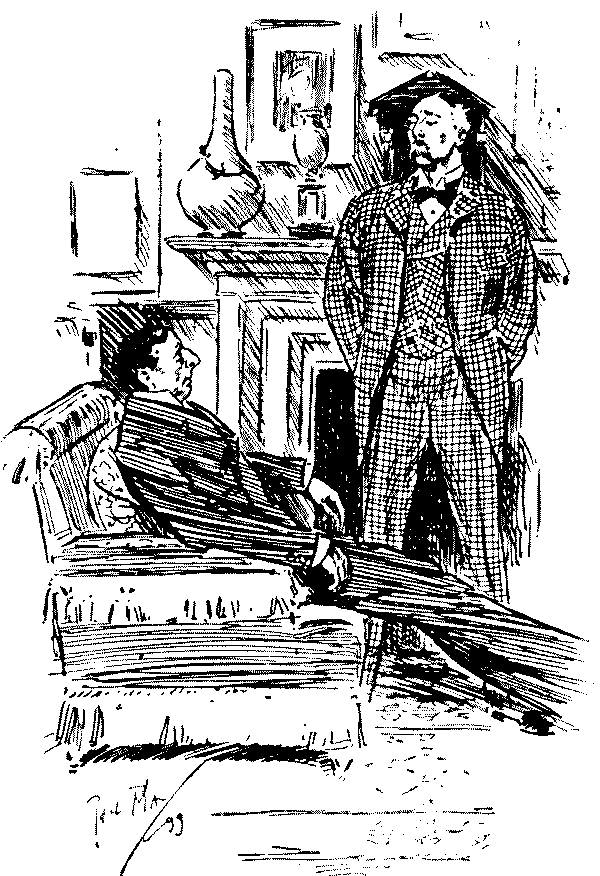
"Well, my dear Admiral, and how did you sleep?"
"Not at all, General. Confounded butterfly flew in at the window, and was flopping around all night—couldn't get a wink of sleep."
"Ah, dashed dangerous things, butterflies!"

First Driver (after a long day). "The 'orse 'rtillery's a-getting quite aristercratic. It don't dine till eight o'clock!!"
Second Driver. "Stroikes me to-morrow the 'orse 'rtillery'll be too aristercratic to dine at all!!"
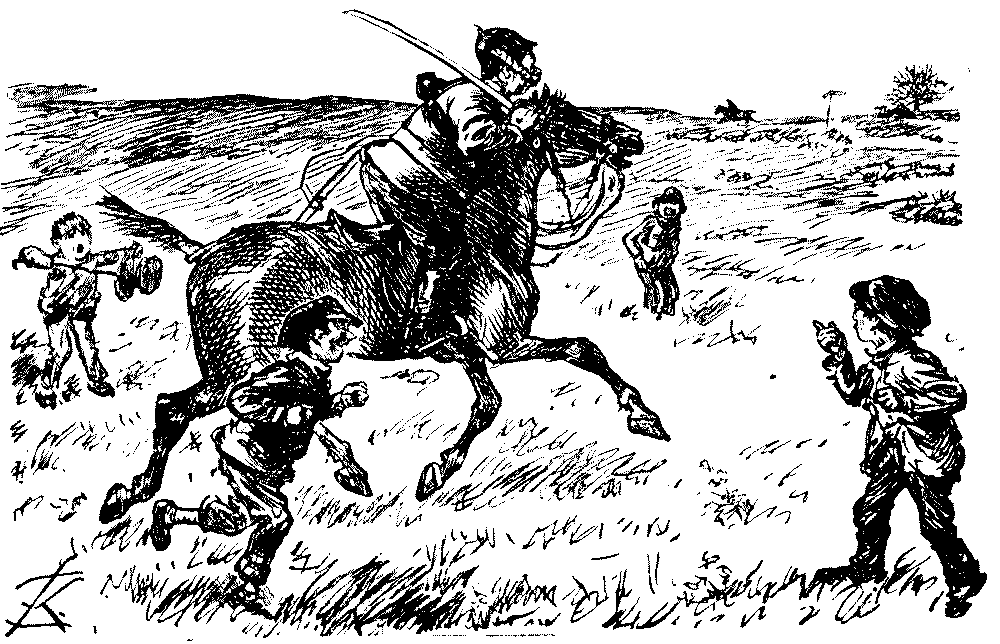
Horrid Boy to newly-appointed Volunteer Major, (who finds the military seat very awkward). "Sit further back, General! You'll make his 'ead ache!"
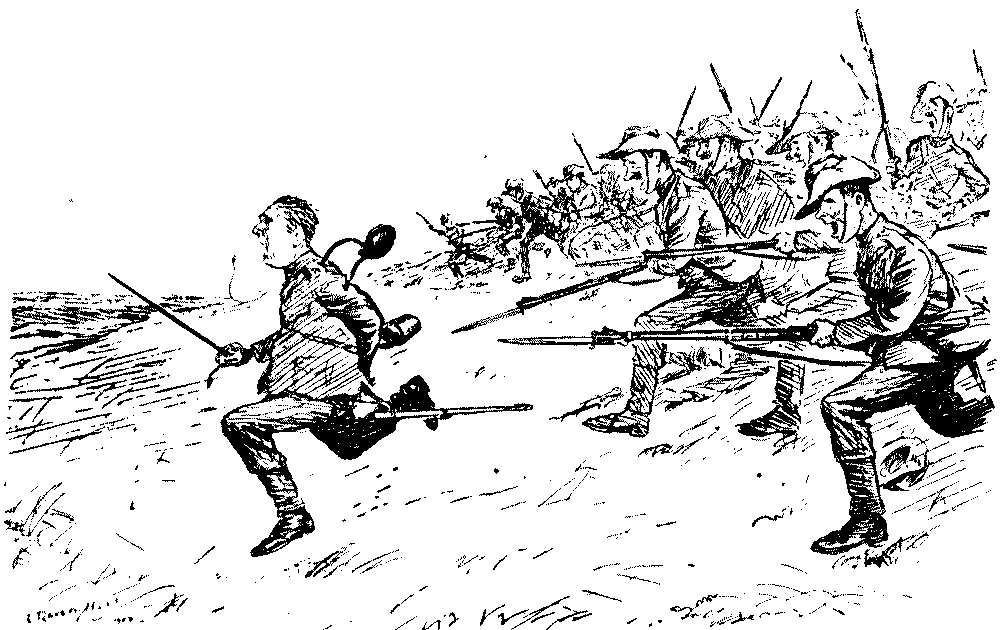
No, this is not heroism; this is simply discretion. Little Plumpleigh has just given "Charge!" and taken one look behind to see if his men are "backing him up, don't you know," and he is now making for safety!
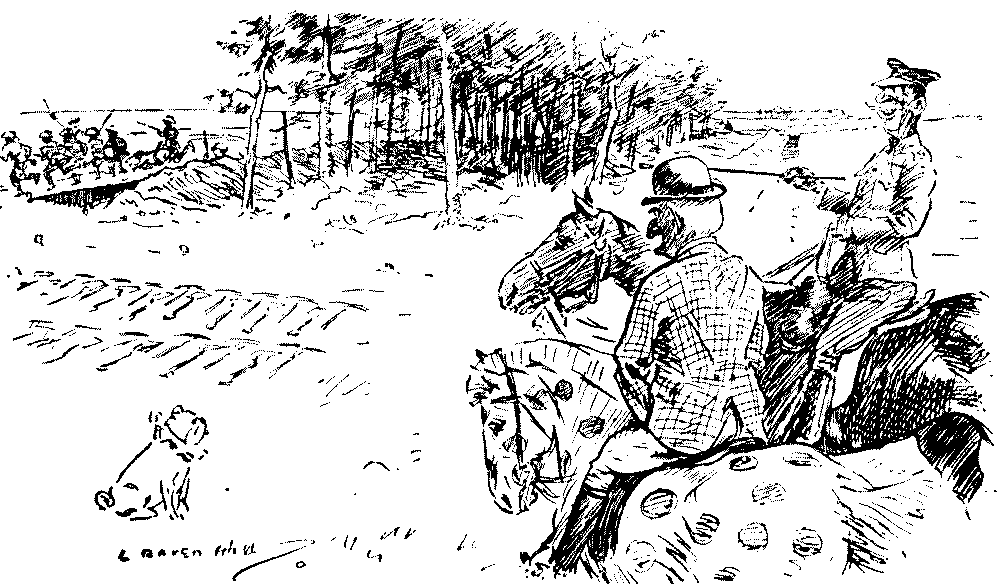
"Now this is another of my brilliant ideas, the shelter trench exercise. Of course, I know the trench is the wrong way about, and that, when they have finished it, they have to fire into the wood they are defending, and then turn about and charge away from the wood, but, then! we get a capital bank and ditch made round our plantations, with practically no expense!"
Mr. Punch. "And this is what you call instructing the Volunteers?"
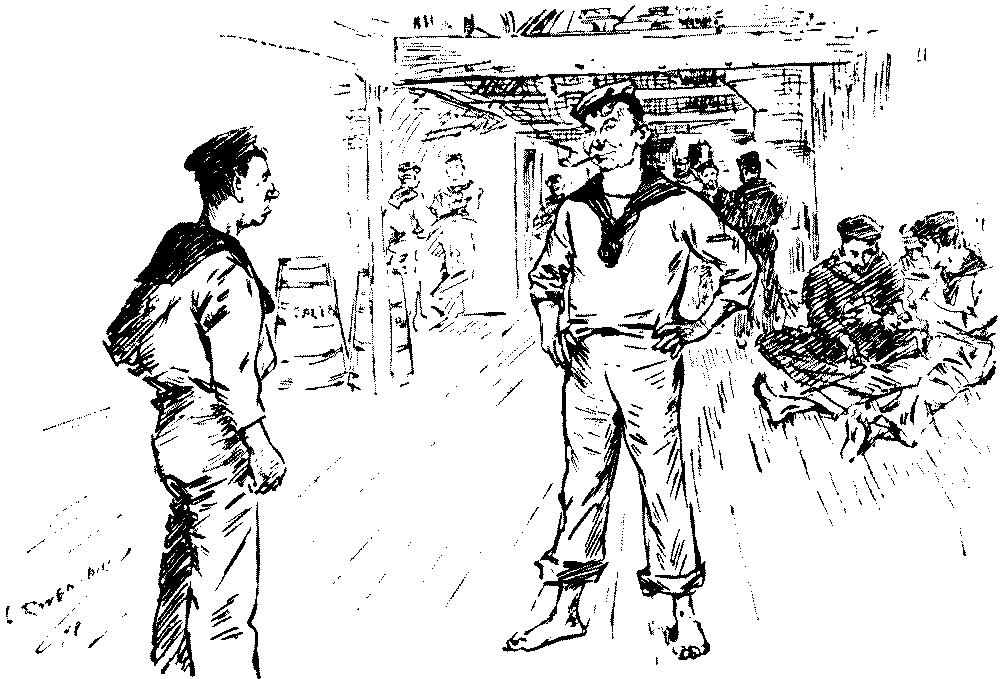
First Bluejacket. "Well, matey, wot 'appened?"
Second Bluejacket. "Lieutenant, 'e reports as 'ow I were dirty, an' my 'ammick weren't clean, an' captin, 'e ses, 'Wash 'is bloomin' neck, scrub 'is bloomin' face, an' cut 'is bloomin' 'air, every ten minnits!'"
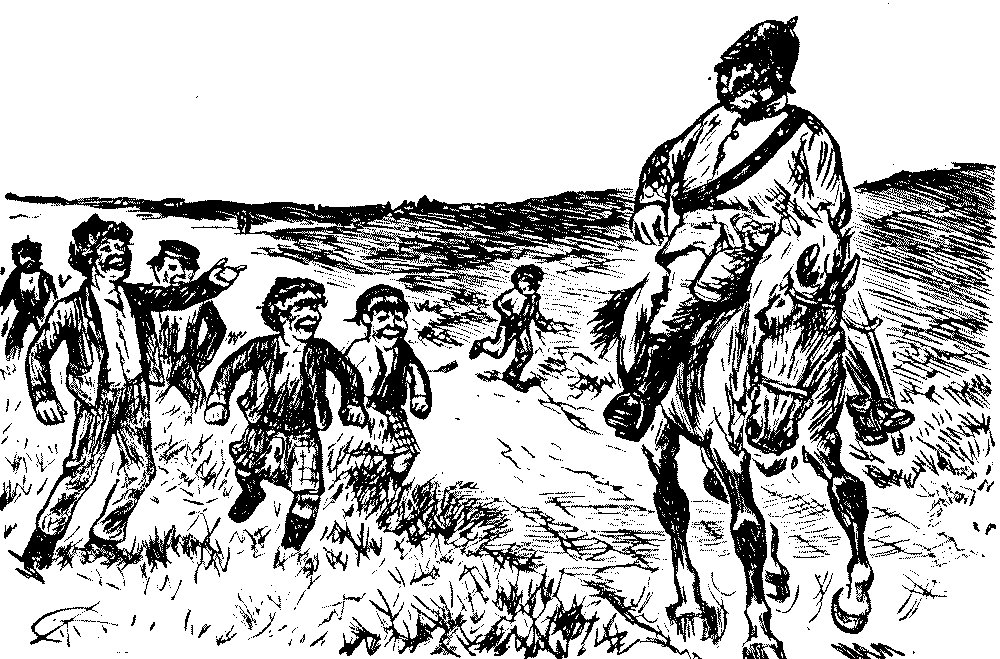
Volunteer Captain (acting Major first time). "Now then! What are you boys staring at? Did you never see a war-horse before?"
Boys (who had followed expecting a "spill.") "Aye—we've whiles seen a waur horse, but never a waur rider!"

(Energetic Sub has been pursuing runaway mule). "Well done, old chap! You deserve the D.S.O. at least. What is it? Ammunition?" "Ammunition! D.S.O.!! V.C., you mean!!!! Why, it's bottled beer!!!!"
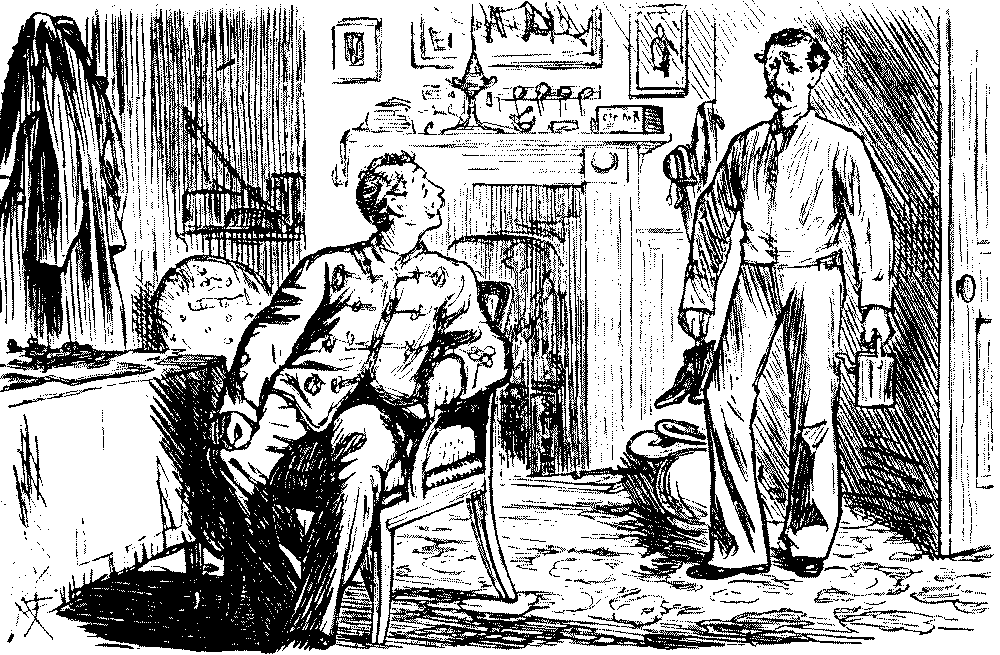
British Subaltern. "By-the-by, Smith, can you lend me that sovereign I gave you this morning for a Christmas-box?!"

Captain of Rural Corps (calling over the roll). "George Hodge!" (No answer.) "George Hodge!—Where on earth's George Hodge?"
Voice from the ranks. "Please, sir, he's turned dissenter, and says fighting's wicked."
Lounger (heartily). Why, I am glad to see you! And how are things going on?
Marksman (cordially, but abruptly). Capitally! Good-bye!
Loung. But I say, what a hurry you are in! Can't you stop a minute for a chat?
Marks. Another time, but just now moments are precious.
Loung. But I say, you see I have found myself here—it doesn't take much longer than getting down to Wimbledon.
Marks. Of course it doesn't—whoever said it did? But there, old chap, I must be off!
Loung. You are in a hurry! Ah, we used to have pleasant days in the old place?
Marks. Did we? I daresay we did.
Loung. Why, of course! Grand old days! Don't you remember what fun it used to be decorating your tent; and then, when the ladies[Pg 150] came down—which they did nearly all the day long—what larks it was getting them tea and claret-cup?
Marks. Very likely. But we don't have many ladies now, and a good job, too—they are a bore.
Loung. Well, you are a chap! Why, how can there be any fun without your sisters, and your cousins, and your maiden aunts?
Marks. We don't want fun. But there, good-bye!
Loung. But I say, I have come all this way to look you up.
Marks. (unbending). Very kind of you, my dear fellow, you have chosen rather an unfortunate time.
Loung. Why, at Wimbledon you had nothing to do!
Marks. Very likely. But then Bisley isn't Wimbledon.
Loung. (dryly). So it seems. Everyone said that when they moved the camp further away from home, they would ruin the meeting.
Marks. Then everyone was wrong. Why, we are going on swimmingly.[Pg 152]
Loung. It must be beastly dull.
Marks. Not at all. Lovely country, good range, and, after it rains, two minutes later it is dry as bone.
Loung. Yes, but it stands to reason that it can't be as popular as Wimbledon.
Marks. My dear fellow, figures are the best test of that. In all the history of the Association we never had more entries than this year.
Loung. That may be, but you don't have half the fun you had nearer town.
Marks. (laughing). Don't want to! Business, my dear fellow, not pleasure! And now, old man, I really must be off. Ta! ta! See you later.
[Exit.
Loung. Well, whatever he may say, I prefer Wimbledon. And as there doesn't seem much for me to do down here, I shall return to town.
[Does so. Curtain.
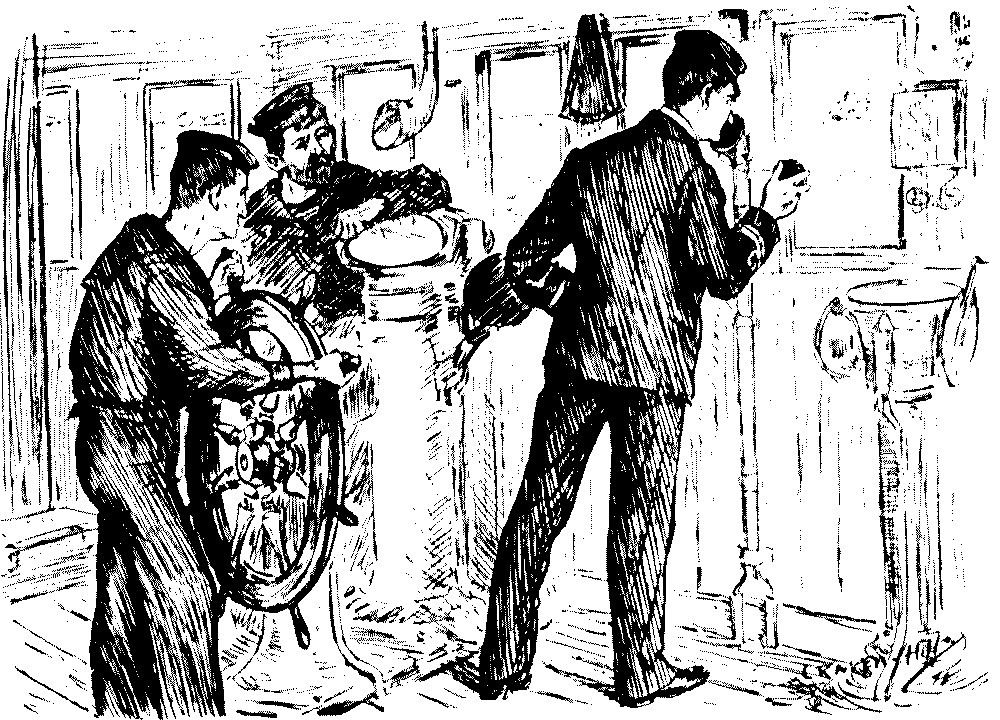
Irascible Lieutenant (down engine-room tube). "Is there a blithering idiot at the end of this tube?"
Voice from Engine-room. "Not at this end, sir!"

Festive Middy. "I say, guv'nor! I think you must rather like being Bishop here!"
His Lordship. "Well, my boy, I hope I do! But why do you ask?"
Festive Middy. "Oh, I've just been taking a walk through the city,—and I say!—there is an uncommonly good-looking lot o' girls about, and no mistake!"
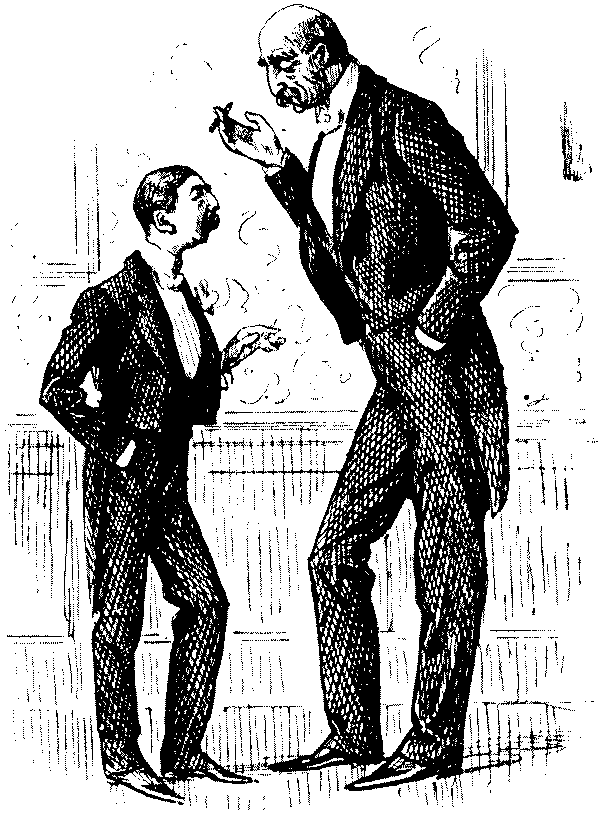
Colonel Smithson (of the Poonah Marines). "By the way, my boy at Sandhurst hopes to get into your regiment some day."
Little Simpson (of the Royal Hussars Green). "Aw—I—aw hope your son is up to our form!"
Colonel Smithson. "Your form! Dash it, he's over four feet high, anyhow!"
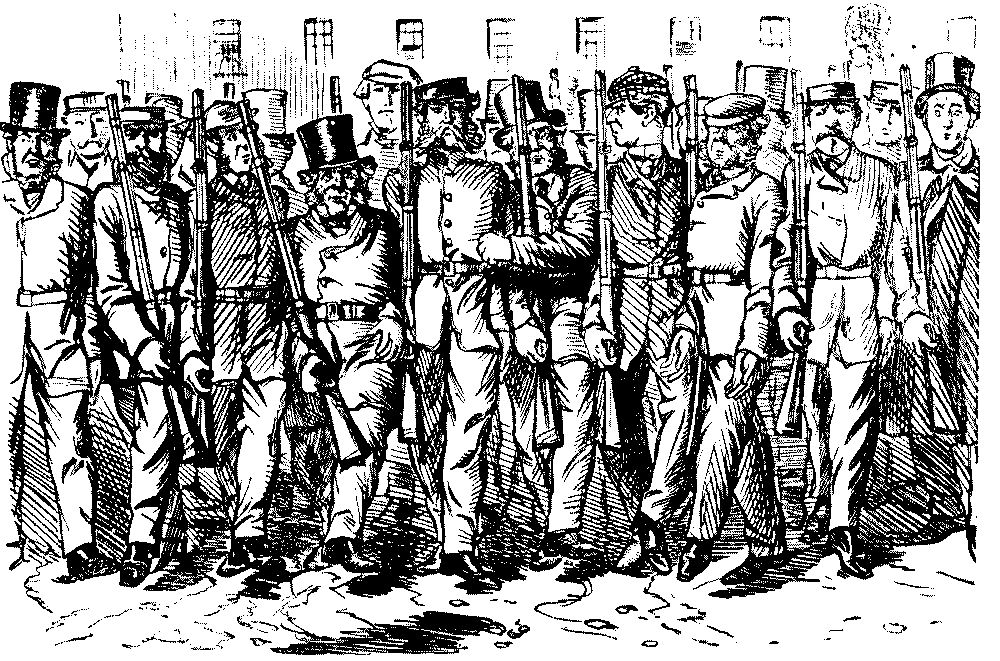
Old Gent (with difficulty). "Now really—Oh! this dis—graceful crowding—I'm—I'm positive my gun will go off!"

(The regiment is about to "march out" with twenty rounds of "blank cartridge.") Sub-Lieutenant (of twenty-four hours' service). "Whereabouts is this pyrotechnic display of yours coming off, Colonel!!?"
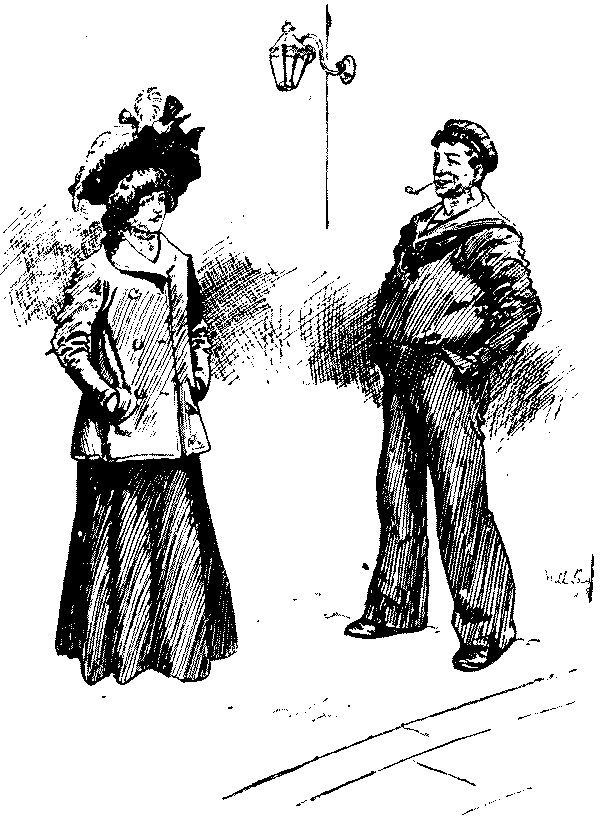
Jack. "Well, Polly lass, if it's true as 'ow you're going to get spliced to Bill, all I 'opes is that he'll stick to you through thick and thin!"
Polly. "Well, 'e ought to, Jack. 'E works in a glue factory."
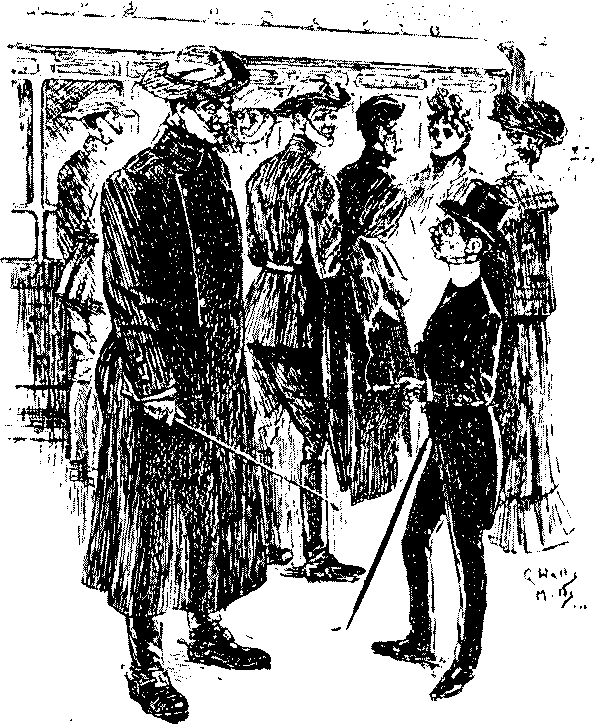
"Awful bore, dear old chap. War offith won't have me, thimply becauth my eyethight ith tho doothed bad!"

Volunteer Subaltern (as the enemy's scout continues to advance in spite of expenditure of much "blank" ammunition). "If that infernal yeoman comes any nearer, shy stones at him, some of you!"
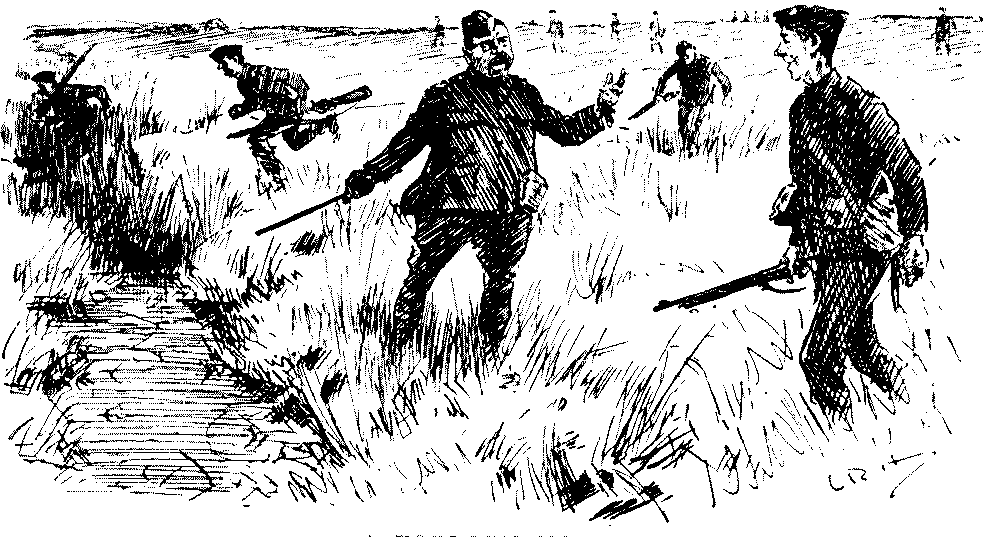
Captain O'Dowd (of the firm of O'Dowd and Jones, stock-jobbers). "What'll I do now? It's beyond me jumpin' powers, an' if I wade I'll be wet to the waist." (To Private Halloran, who in civil life is a stockbroker's clerk). "Here, Halloran, I want a carry over. You do it for me, an' I'll not forget it to you, me lad."
Private Halloran. "Sorry I can't, Captain. You know carryin'-over day is not till the sixteenth, an' this is only the seventh!"
Though I feel less at home on the bounding wave
Than I do on the firm dry land,
I can spin you a yarn of a right good craft
That is true-British owned and manned.
The winds may blow, and the storms may beat,
And the hurricanes rage and roar,
But "the ship I love" on her course will hold
With the Union Jack at the fore.
Fair weather or foul, she ploughs along,
Leaving far astern the strand,
And many a towering sister bark
We pass on the starboard hand,
And, Westward ho! as we bear away!
I can count stout ships galore,
Abeam, in our wake, and ahead, that fly
The Union Jack at the fore.
And the sight of the flag that has swept the seas,
Nor ever has known disgrace,
Makes even a landlubber's bosom swell
With the pride of his English race.
At that gallant sight in my landsman's heart
I rejoice—and rejoice still more
That I'm only aboard of a road-car 'bus,
With the Union Jack at the fore!
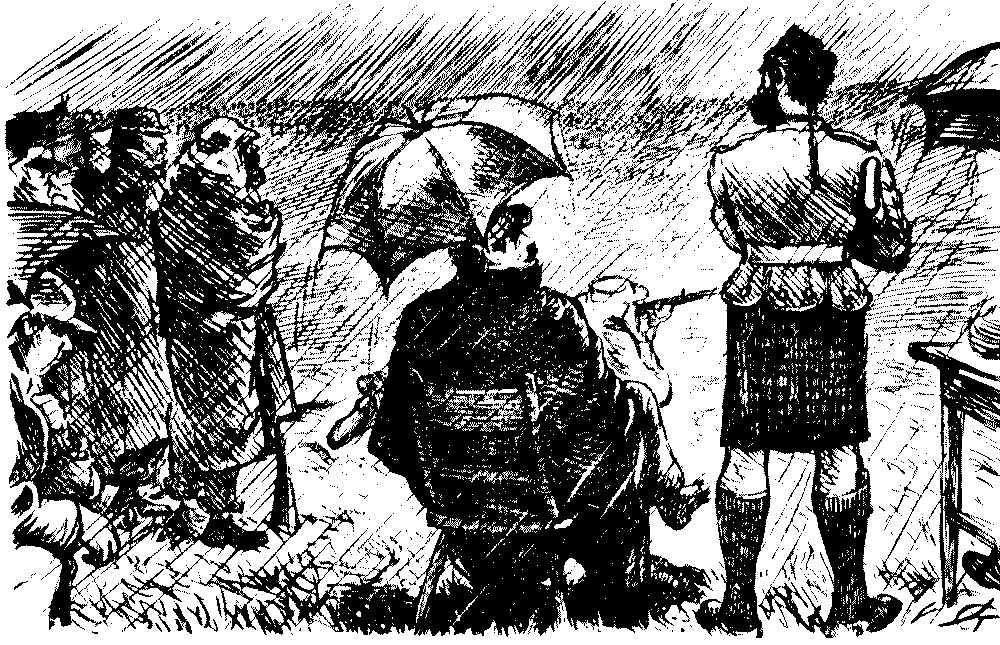
Officer at firing-point (who thinks that it's raining). "Sergeant Mauchline, hadn't you better wear your greatcoat till it's your turn to fire?" Sergeant Mauchline (frae the "Land of Lorne"). "Hoo! Nothe noo! I'll pit it on when it comes wat!"
2. Don't get up when revally sounds. You'll find adjutant's parade in the early morning, the very early morning, such a beastly bore, and so bad for the liver that it is far wiser to stay in the "palliasse"—(besides, hasn't your doctor often told you that it is madness to suppose you can play such tricks at your time of life?)—they can only give you a few years' imprisonment for repeated mutinous conduct, and you could doubtless petition the Home Secretary for an aggravation of your sentence.
3. Don't submit to harsh or cursory remarks from the adjutant. Do answer him back. You know quite well that in private life you would not put up with his hasty, ill-considered and offensive language, nor permit him to hector you because your collar was not clean, and if you have come on parade without cleaning your belt or rifle, what right has he to say that it makes him furious? Do point out to him how absurd it is to expect such[Pg 164] minute attention to discipline on the part of so intelligent a volunteer as yourself.
4. Don't overtax your strength or weaken your heart by "doubling" up impossible hills, merely because the colonel (on a horse) thinks it looks pretty. Of course you would be perfectly ready to do anything that was necessary, but how can the empire's safety depend upon your losing your wind, when the enemy are some of your oldest friends, with a handkerchief tied round their sleeves?
5. Do insist upon having hot water to shave with, and an extra blanket when the nights get chilly. Very probably the captain of your company would turn out of his bed and take your palliasse if you asked him nicely.
6. Don't do any menial or degrading work, such as cleaning cooking utensils or greasing your own boots. The Government ought to know that gentlemen can't be expected to do that kind of work, and should provide an efficient staff of servants.
7. Don't do anything you would rather not.
8. Do set all military discipline at defiance. You probably know much better than your officers.[Pg 166]
9. Don't blame me if you find yourself in prison.
10. Do make a stern resolution never to come to camp again.
11. Don't keep it.
The shooting could not be more satisfactory but for the customary "accident."
Everyone would make a "bull" but for the haze and the shiftiness of the wind.
The catering is in every way excellent, but heavy meals scarcely assist in getting on the target.
It is delightful to entertain visitors—especially ladies—at the camp, but champagne-cup and provisions generally run into money.
It is healthy to sleep under canvas, but when the thermometer marks ninety in the shade or the rain pours down in torrents a bed in an inn is preferable.
Bisley is a beautiful place, but Woking cemetery is a dismal neighbour.
Distinctly it is nobly patriotic to spend a fortnight with the N. R. A., in the cause of the fatherland, but is it quite worth the trouble?

Swagger Yeomanry Officer. "Bring out my charger."
Job-master's Foreman. "Very sorry, sir, but e's just gorn to a funeral!"
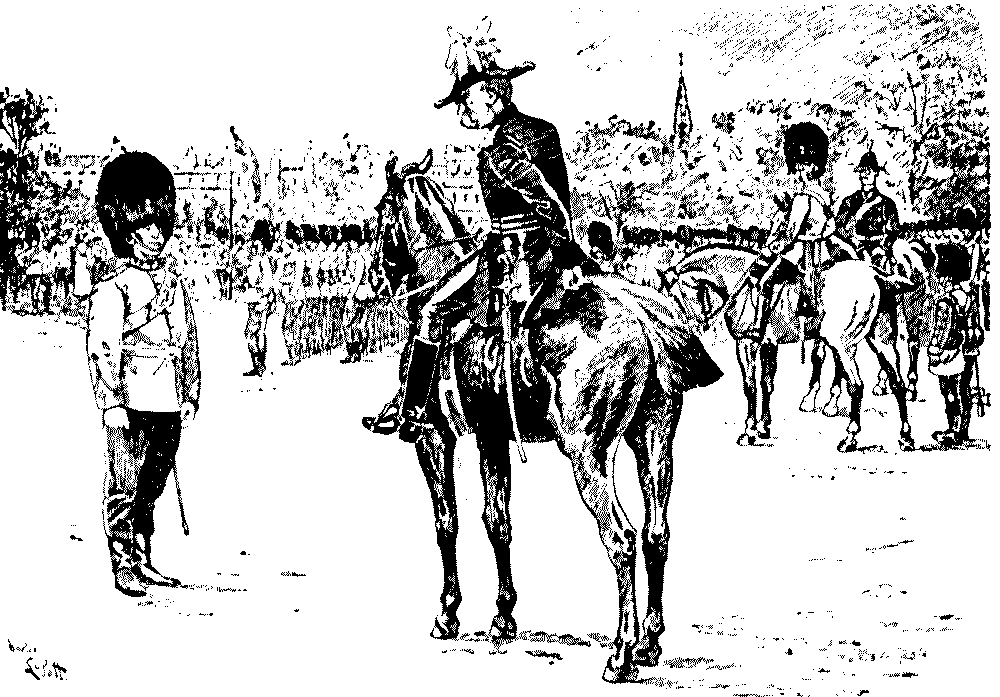
(Scene—General Inspection of Volunteer Battalion. Lieut. Tompkins—excellent fellow, but poor soldier—called out to show the General and British public what he knows.)
General. "Now, sir, you now have the battalion in quarter column facing south. How would you get into line, in the quickest possible way, facing north-east?"
Tompkins (after much fruitless consideration). "Well, sir, do you know, that's always what I've wondered."
[Report on subaltern officers—bad.

First Miserable Sub (left at the depot). "I can't think, for the life of me, what excuse for two days' leave I'm to give the C. O. I've already weighed in with every one I can think of."
Second M. S. "Easy enough, old chap. Kill your grandmother."
First M. S. "Can't, dear boy. I'm keeping her for the Derby!"
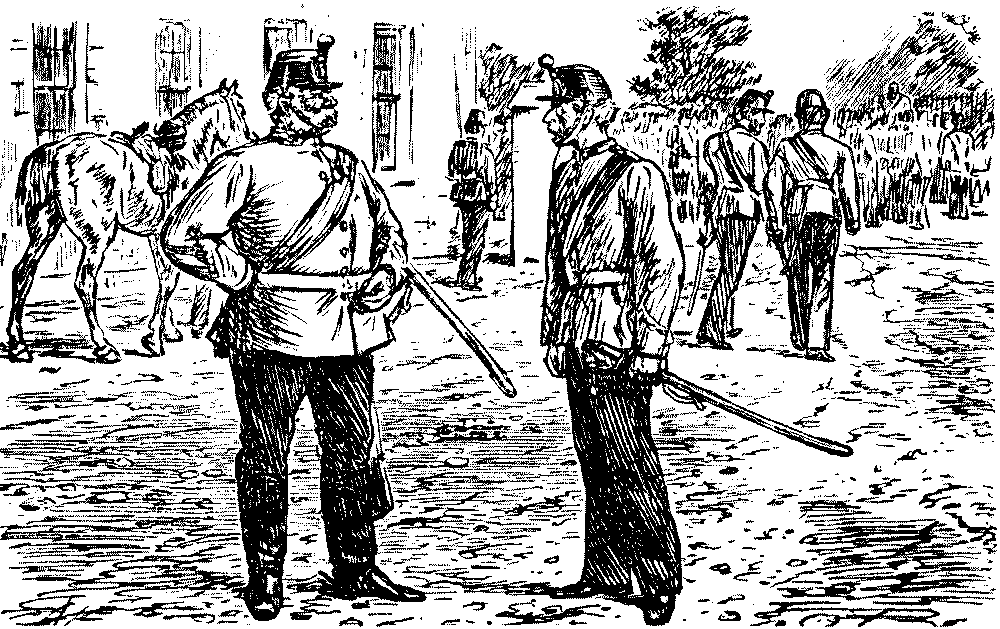
Colonel (of the pre-examination period—to studious sub). "I say, youngster, you'll never make a soldier if you don't mind what you're about!"
Sub (mildly). "I should be sorry to think that, sir!"
Colonel. "I saw you sneaking up the High Street yesterday, looking like a Methodist parson in reduced circumstances!—Hold up your head, sir! Buy a stick, sir! Slap your leg, sir! And stare at the girls at the windows!"

"The 'orrid mess master made my kitching in, and hisself too, a-cleaning that there dratted rifle, after he'd been a booviackin' in the park!"

Auxiliary Recruit (to himself). "Murder! Murder! What'll I do now? 'Drill-sarjint tould me always to salute me officer with the far-off hand, and here's two iv 'em! Faix, I'll make it straight for meself anyhow!"
[Throws up both hands.
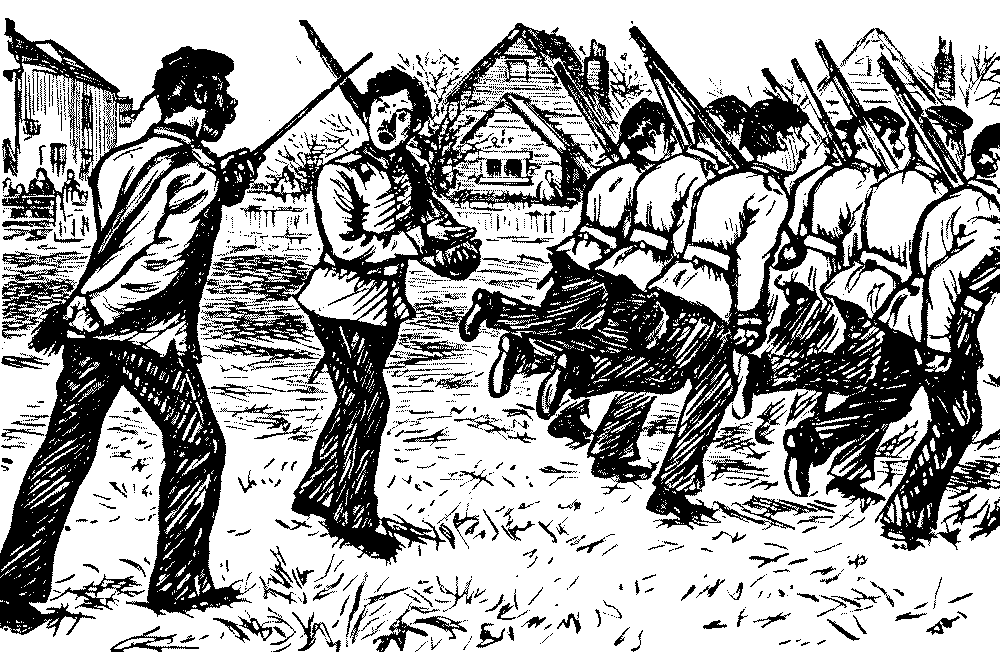
Sergeant O'Leary. "Double! Left! Right! What the blazes, Pat Rooney, d'ye mane by not doublin' wid the squad?"
Pat. "Shure, sergeant, 'twasn't a fair start"!
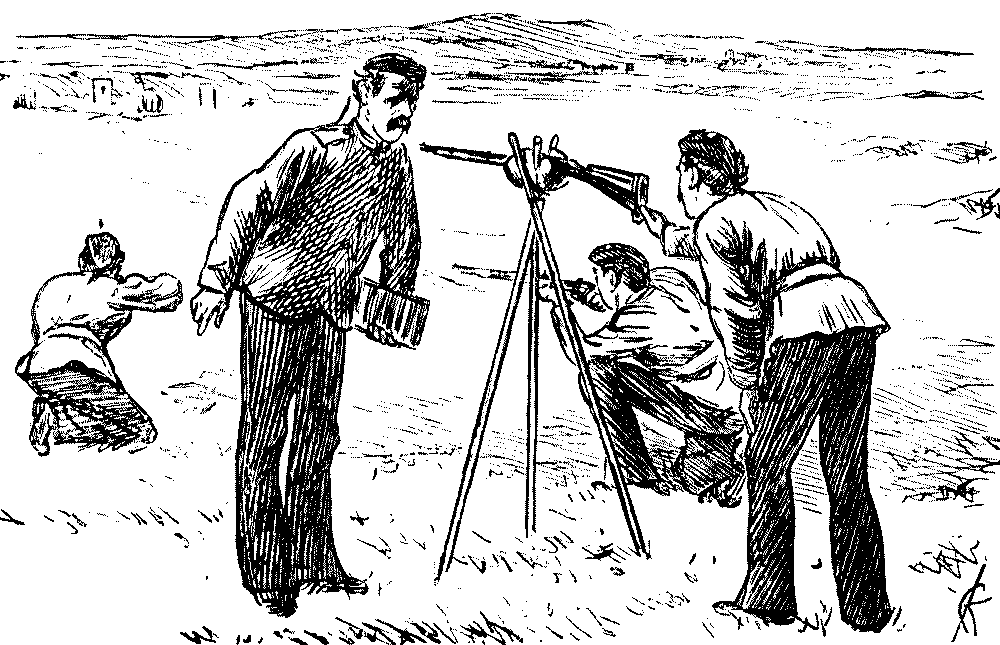
Musketry Instructor. "Now, then! How do you 'xpect to see the hobject haimed at, if you don't keep your heye closed?"
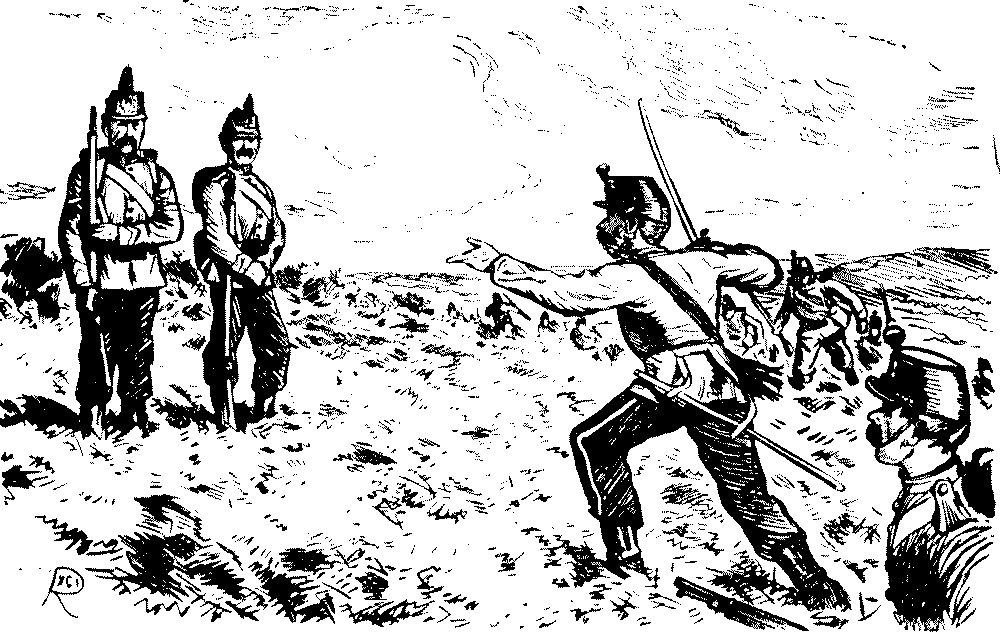
Captain of Skirmishers (rushing in to seize picket sentries of the enemy). "Hullo! He-ar! You surrender to this company!"
Opposition Lance-Corporal. "Beg pardon, sir! It's the other way, sir. We're a brigade, sir!!!"
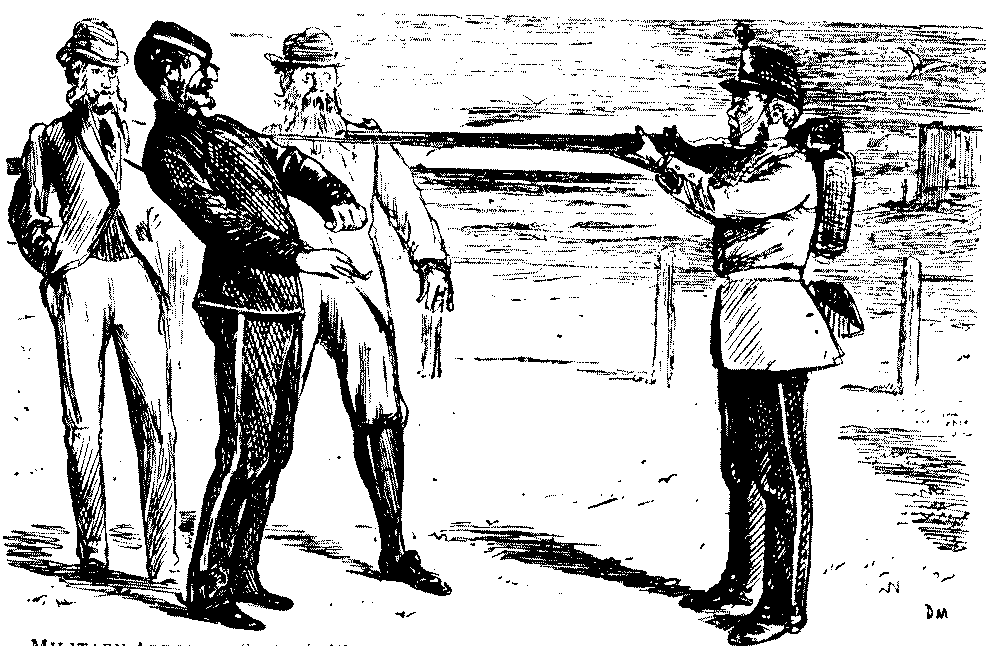
Sentry (with mixed ideas of manual and platoon). "Gar'd t'n out!"
Commandant. "Bless you, sir, what are you about?"
Sentry. "Shure, I'm waitin' for the worr'd foire!"
[Extract from Field Exercise or Red Book, pocket edition, page 356:—Sentries paying compliments: "To field officers he will present arms."

Captain Wilkinson (excitedly, to Major Walker, of the firm of Wilkinson, Walker, & Co., Auctioneers and Estate Agents). "Don't you think we'd better bring our right wing round to attack the enemy's flank, so as to prevent their occupying those empty houses we have to let in Barker's Lane?"

Sergeant-Major. "Now, Private Smith, you know very well none but officers and non-commissioned officers are allowed to walk across this grass!"
Private Smith. "But, sergeant-major, I've Captain Graham's verbal orders to——"
Sergeant-Major. "None o' that, sir! Show me the captain's verbal orders! Show'm to me, sir!!"
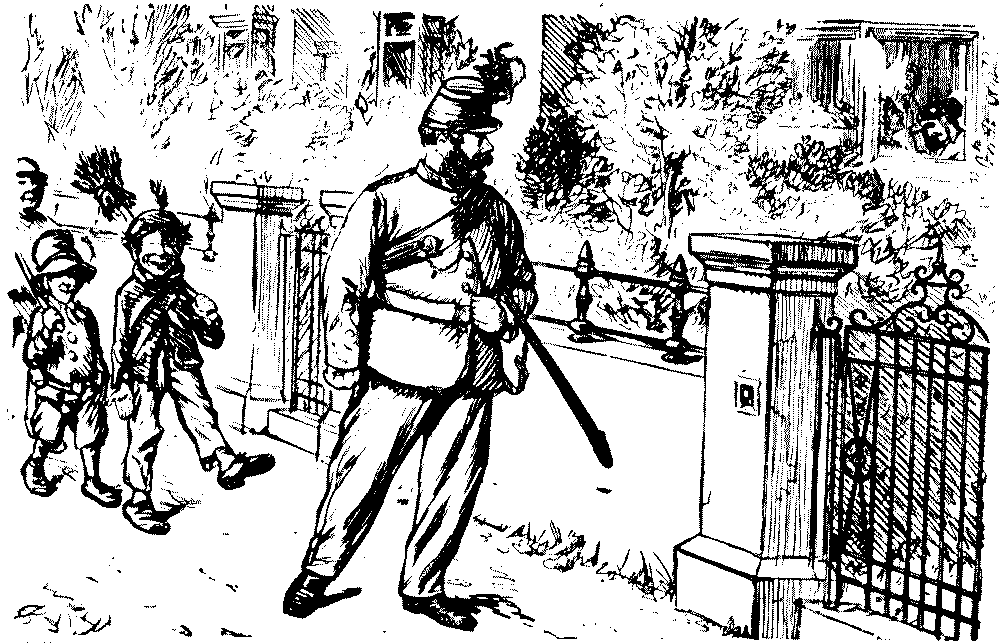
Captain Barble (East Suffolkshire R. V.) going to drill, has occasion to pass a certain window for reasons best known to himself. A vague idea possesses him that something is wrong somehow, or what should create such amusement on this occasion!
Interior of a dreary room in the War Office. A tired-looking young officer, in mufti, sits at a table with great piles of papers, each bundle tied with red tape and ticketed with labels of different colours, on one side of it ready to his hand. Another pile of papers, which he has already dealt with, is on the other side of the table. He is an official and has many letters, the first two being D. A. after his name. The gas has just been lighted. A clerk brings in another fat bundle of papers.
The Officer (patting the smaller pile on the table). These can go on, Smithers. That question of sardine-openers must go back to the commissariat, and the General commanding the Central District must be authorised to deal on his own responsibility with the matter of the fierce bull in the[Pg 180] field where the recruits bathe. What have you got there?
The Clerk. It is the correspondence, sir, relative to that false tooth requisitioned for by the officer commanding the Rutlandshire Regiment for the first cornet of the band. The Medical Department sent it back to us this morning, and there is another letter in from the Colonel, protesting against his regiment being forced to go route marching to an imperfect musical accompaniment.
The Officer (groaning). I thought we had got rid of that matter at last by sending it to the doctors.
The Clerk. No, sir. The Surgeon-General has decided that "one tooth, false, with gold attachment," cannot be considered a medical comfort.
The Officer (taking a précis from the top of the papers). I suppose we must go into the matter again. It began with the letter from the Colonel to the General?
The Clerk. Yes, sir, here it is. The O. C. the Rutland Regiment has the honour to report that the first cornet player in the band has lost a[Pg 182] tooth, and as the band has become inefficient in the playing of marching music in consequence, he requests that a false tooth may be supplied at Government expense.
The Officer. And the General, of course, replied in the usual formula that he had no fund available for such purpose.
The Clerk. Yes, sir; but suggested that the regimental band fund might be drawn on.
The Officer. Where is the Colonel's letter in reply. (It is handed to him.) Ah, yes. Band fund is established, he writes, for purchase of musical instruments and music, and not for repair of incomplete bandsmen, and refuses to authorise expense, except under order from the Commander-in-Chief.
The Clerk. The General sends this on to us with a remark as to the Colonel's temper.
The Officer. And we pass it to the Quarter-Master-General's people, suggesting that under certain circumstances a false tooth might be considered a "necessary," and a free issue made.
The Clerk. A very long memo, on the subject, in reply, from the Q.-M.-G., sir. He points out[Pg 184] that though, under exceptional circumstances, a pair of spectacles might be held to be a sight-protector, a false tooth could not be held to be either a fork, a spoon, a shaving-brush, a razor, or even an oil bottle.
The Officer. We wrote back suggesting that it might pass as a "jag"—our little joke.
The Clerk. Your little joke, sir. The Q.-M.-G.'s people didn't see it.
The Officer. No? Then the correspondence goes on to the Ordnance Department, with a suggestion that a false tooth might be considered an arm or an accoutrement.
The Clerk. The Director-General replies, sir, that in the early days of the British Army, when the Army Clothing Department's sole issue was a supply of woad, a tooth, or indeed a nail, might have reasonably been indented for as a weapon, but that, owing to the introduction and perfection of fire-arms, such weapons are now obsolete and cannot be issued.
The Officer. And now the Medical Service refuse to help us.
The Clerk. Yes, sir. They cannot bring the[Pg 186] fixing of it under the head of surgical operations, and the Surgeon-General points out very justly, if I may be permitted to say so, sir, that a seal-pattern false tooth could hardly be considered a "medical comfort."
The Officer. What are we to do? The Colonel of the regiment is evidently furious.
The Clerk. We might send the correspondence to the Inspector of Iron Structures. He may be able to do or suggest something.
The Officer. Very well; and will you send off this telegram to my wife saying I have a long evening's work before me, and that I shall not be able to get back to dinner to-night? (Exit the Clerk.) Whenever will they trust a General Commanding a District to spend for the public good on his own responsibility a sum as large as a schoolboy's allowance, and so take some of the unnecessary work off our shoulders?
[He tackles wearily another file of papers.

"So glad to see you, Mrs. Bamsby! And how is your dear husband? Where is the Colonel? I was only saying the other day, 'I wonder when I shall see Colonel Bamsby!'"
Mrs. Colonel B. "You'll see him now, my dear if I just step aside, or you walk round me."
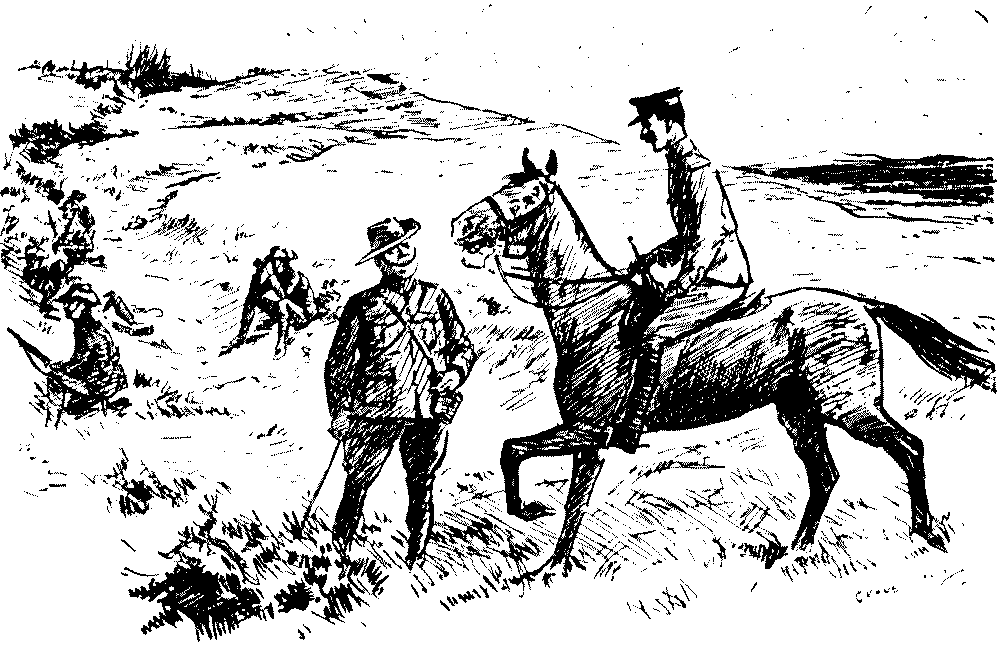
Adjutant. "Your orders are that when you are attacked, Captain Slasher, you are to fall back slowly."
Capt. Slasher. "In which direction am I to retire, sir?"
Adjutant. "Well, the proper way, of course, would be over that hill, but—they intend to have lunch behind that farmhouse in the valley."
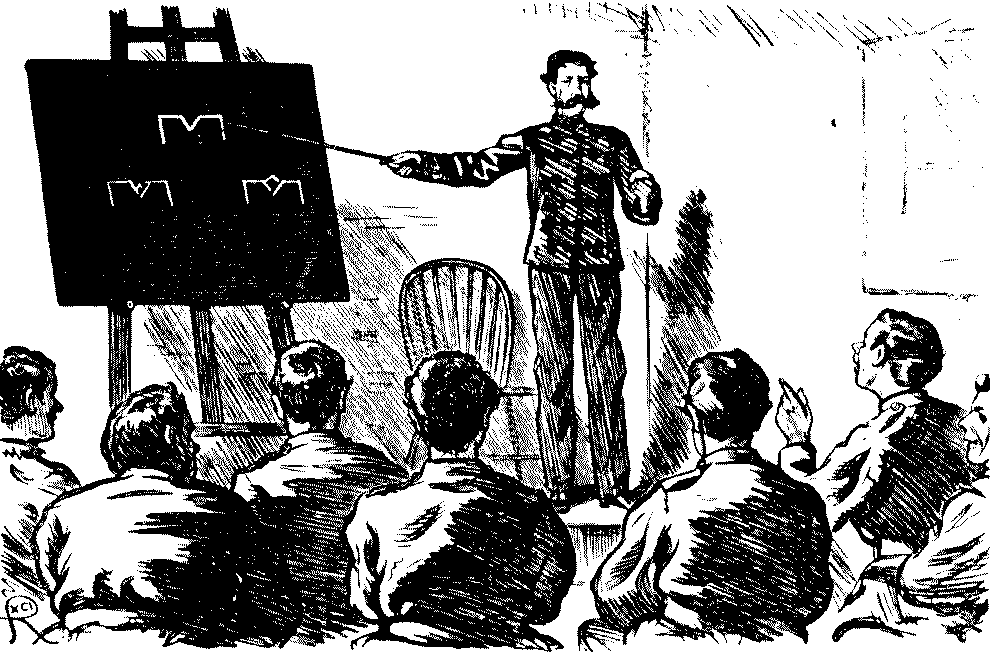
Instructor. "Now, I've explained the different 'sights,' you, Private Dumpy, tell me what a fine 'sight' is. Describe it as well as you can——"
Private Dumpy. "A fine sight, sir? A fine sight—(pondering)—'s a magnificen' spe'tacle, sir!!"
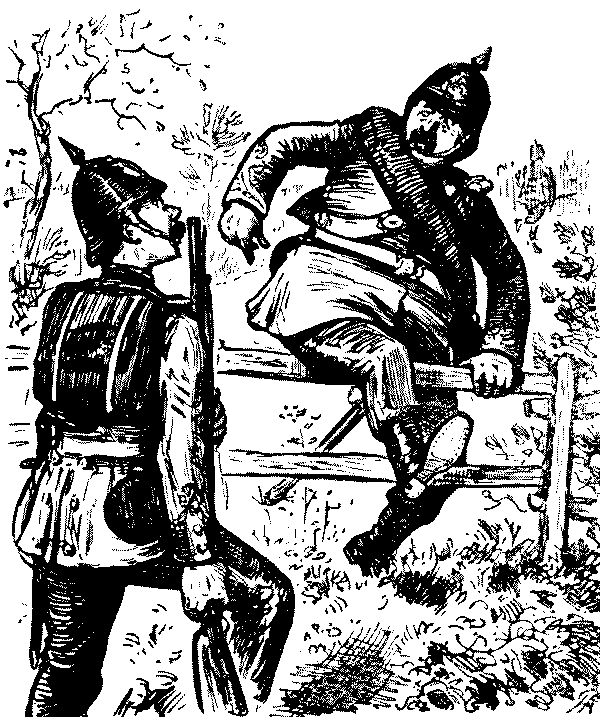
Sergeant. "Can I do anything for you, captain?"
Captain. "Why, thanky, sergeant. If you wouldn't mind giving my other leg a hitch over!"

Inspecting Officer. "How is it your khaki is so much too small?"
Stout Yeoman. "It do seem a bit skimpy, sur. But tailor says as how I'm bound to grow a 'eap smaller on hactive service, an' 'e's allowin' for shrinkage."
Le Pantalon.—Haul upon the starboard tack and let the other craft pass—then bear up and get your head on the other tack—regain your berth on the port tack—back and fill with your partner and boxhaul her—wear round twice against the sun in company with the opposite craft, then your own—afterwards boxhaul her again and bring her up.
L'ete.—Shoot ahead about two fathoms till you nearly come stem on with the other craft under weigh—then make a stern board to your berth and side out for a bend, first to starboard, then to port—make sail and pass the opposite craft—then get your head round on the other tack—another side to starboard and port—then make sail to regain your berth—wear round, back and fill and boxhaul your partner.
La Poule.—Heave ahead and pass your adversary yard-arm to yard-arm—regain your berth on the other tack in the same order—take your station in a line with your partner—back and[Pg 190] fill—fall on your heel and bring up with your partner—she then manœuvres ahead and heaves all aback, fills and shoots ahead again and pays off alongside—you then make sail in company, till nearly stem on with the other line—make a stern board and cast her off to shift for herself—regain your berth in the best means possible, and let go your anchor.
La Trenise.—Wear round as before against the sun twice, boxhaul the lady, and range up alongside her, and make sail in company—when half-way across to the other shore drop astern with the tide—shoot ahead again and cast off the tow—now back and fix as before and boxhaul her and yourself into your berth, and bring up.
La Pastorale.—Shoot ahead alongside your partner, then make a stern board—again make all sail over to the other coast—let go the hawser, and pay off into your own berth and take a turn—the three craft opposite range up abreast towards you twice, and back astern again—now manœuvre any rig you like, only under easy sail, as it is always "light winds" (zephyrs) in this passage—as soon as you see their helms down, haul round in[Pg 192] company with them on port tack—then make all sail with your partner into your own berth, and bring up.
La Finale.—Wear round to starboard, passing under your partner's bows—sight the catheads of craft on your starboard bow—then make sail into your own berth—your partner passing athwart your bows—now proceed according to the second order of sailing—to complete the evolutions shoot ahead and back astern twice, in company with the whole squadron, in the circular order of sailing.
Some talk of Alexander, and some of Pericles,
Of Hector and Lysander, and such old guys as these;
But of all the horrid objects, the "wust" I do declare,
Is the Prusso-Russo-Belgo-Gallo-British Grenadier.
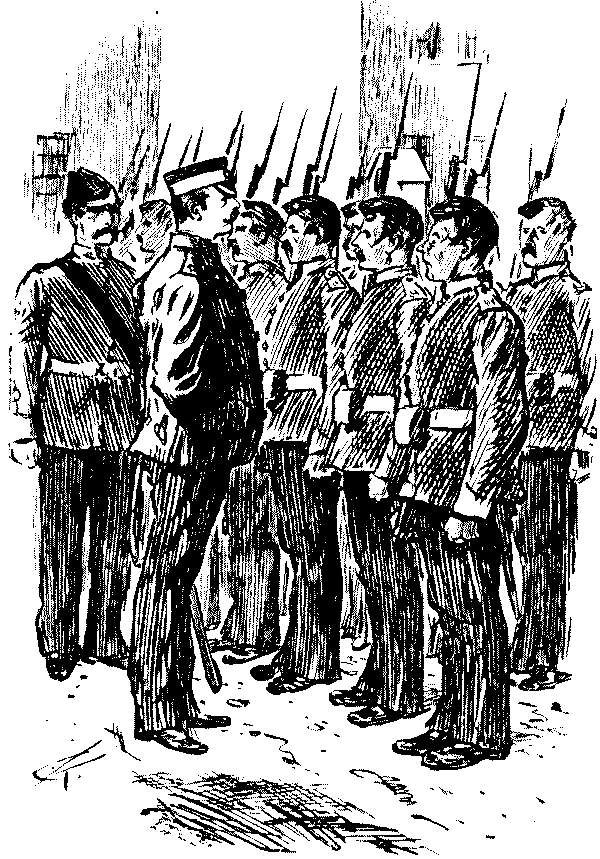
Militia Officer. "Augh!—a new man. Ah—'ve you been in 'service before?"
Recruit. "Yes, sir."
Officer. "Augh—what regiment?"
Recruit. "Mrs. Wiggins's coachman, sir!!"
End of the Project Gutenberg EBook of Mr. Punch on the Warpath, by Various
*** END OF THIS PROJECT GUTENBERG EBOOK MR. PUNCH ON THE WARPATH ***
***** This file should be named 38146-h.htm or 38146-h.zip *****
This and all associated files of various formats will be found in:
https://www.gutenberg.org/3/8/1/4/38146/
Produced by Neville Allen, Chris Curnow and the Online
Distributed Proofreading Team at https://www.pgdp.net (This
file was produced from images generously made available
by The Internet Archive)
Updated editions will replace the previous one--the old editions
will be renamed.
Creating the works from public domain print editions means that no
one owns a United States copyright in these works, so the Foundation
(and you!) can copy and distribute it in the United States without
permission and without paying copyright royalties. Special rules,
set forth in the General Terms of Use part of this license, apply to
copying and distributing Project Gutenberg-tm electronic works to
protect the PROJECT GUTENBERG-tm concept and trademark. Project
Gutenberg is a registered trademark, and may not be used if you
charge for the eBooks, unless you receive specific permission. If you
do not charge anything for copies of this eBook, complying with the
rules is very easy. You may use this eBook for nearly any purpose
such as creation of derivative works, reports, performances and
research. They may be modified and printed and given away--you may do
practically ANYTHING with public domain eBooks. Redistribution is
subject to the trademark license, especially commercial
redistribution.
*** START: FULL LICENSE ***
THE FULL PROJECT GUTENBERG LICENSE
PLEASE READ THIS BEFORE YOU DISTRIBUTE OR USE THIS WORK
To protect the Project Gutenberg-tm mission of promoting the free
distribution of electronic works, by using or distributing this work
(or any other work associated in any way with the phrase "Project
Gutenberg"), you agree to comply with all the terms of the Full Project
Gutenberg-tm License (available with this file or online at
https://gutenberg.org/license).
Section 1. General Terms of Use and Redistributing Project Gutenberg-tm
electronic works
1.A. By reading or using any part of this Project Gutenberg-tm
electronic work, you indicate that you have read, understand, agree to
and accept all the terms of this license and intellectual property
(trademark/copyright) agreement. If you do not agree to abide by all
the terms of this agreement, you must cease using and return or destroy
all copies of Project Gutenberg-tm electronic works in your possession.
If you paid a fee for obtaining a copy of or access to a Project
Gutenberg-tm electronic work and you do not agree to be bound by the
terms of this agreement, you may obtain a refund from the person or
entity to whom you paid the fee as set forth in paragraph 1.E.8.
1.B. "Project Gutenberg" is a registered trademark. It may only be
used on or associated in any way with an electronic work by people who
agree to be bound by the terms of this agreement. There are a few
things that you can do with most Project Gutenberg-tm electronic works
even without complying with the full terms of this agreement. See
paragraph 1.C below. There are a lot of things you can do with Project
Gutenberg-tm electronic works if you follow the terms of this agreement
and help preserve free future access to Project Gutenberg-tm electronic
works. See paragraph 1.E below.
1.C. The Project Gutenberg Literary Archive Foundation ("the Foundation"
or PGLAF), owns a compilation copyright in the collection of Project
Gutenberg-tm electronic works. Nearly all the individual works in the
collection are in the public domain in the United States. If an
individual work is in the public domain in the United States and you are
located in the United States, we do not claim a right to prevent you from
copying, distributing, performing, displaying or creating derivative
works based on the work as long as all references to Project Gutenberg
are removed. Of course, we hope that you will support the Project
Gutenberg-tm mission of promoting free access to electronic works by
freely sharing Project Gutenberg-tm works in compliance with the terms of
this agreement for keeping the Project Gutenberg-tm name associated with
the work. You can easily comply with the terms of this agreement by
keeping this work in the same format with its attached full Project
Gutenberg-tm License when you share it without charge with others.
1.D. The copyright laws of the place where you are located also govern
what you can do with this work. Copyright laws in most countries are in
a constant state of change. If you are outside the United States, check
the laws of your country in addition to the terms of this agreement
before downloading, copying, displaying, performing, distributing or
creating derivative works based on this work or any other Project
Gutenberg-tm work. The Foundation makes no representations concerning
the copyright status of any work in any country outside the United
States.
1.E. Unless you have removed all references to Project Gutenberg:
1.E.1. The following sentence, with active links to, or other immediate
access to, the full Project Gutenberg-tm License must appear prominently
whenever any copy of a Project Gutenberg-tm work (any work on which the
phrase "Project Gutenberg" appears, or with which the phrase "Project
Gutenberg" is associated) is accessed, displayed, performed, viewed,
copied or distributed:
This eBook is for the use of anyone anywhere at no cost and with
almost no restrictions whatsoever. You may copy it, give it away or
re-use it under the terms of the Project Gutenberg License included
with this eBook or online at www.gutenberg.org
1.E.2. If an individual Project Gutenberg-tm electronic work is derived
from the public domain (does not contain a notice indicating that it is
posted with permission of the copyright holder), the work can be copied
and distributed to anyone in the United States without paying any fees
or charges. If you are redistributing or providing access to a work
with the phrase "Project Gutenberg" associated with or appearing on the
work, you must comply either with the requirements of paragraphs 1.E.1
through 1.E.7 or obtain permission for the use of the work and the
Project Gutenberg-tm trademark as set forth in paragraphs 1.E.8 or
1.E.9.
1.E.3. If an individual Project Gutenberg-tm electronic work is posted
with the permission of the copyright holder, your use and distribution
must comply with both paragraphs 1.E.1 through 1.E.7 and any additional
terms imposed by the copyright holder. Additional terms will be linked
to the Project Gutenberg-tm License for all works posted with the
permission of the copyright holder found at the beginning of this work.
1.E.4. Do not unlink or detach or remove the full Project Gutenberg-tm
License terms from this work, or any files containing a part of this
work or any other work associated with Project Gutenberg-tm.
1.E.5. Do not copy, display, perform, distribute or redistribute this
electronic work, or any part of this electronic work, without
prominently displaying the sentence set forth in paragraph 1.E.1 with
active links or immediate access to the full terms of the Project
Gutenberg-tm License.
1.E.6. You may convert to and distribute this work in any binary,
compressed, marked up, nonproprietary or proprietary form, including any
word processing or hypertext form. However, if you provide access to or
distribute copies of a Project Gutenberg-tm work in a format other than
"Plain Vanilla ASCII" or other format used in the official version
posted on the official Project Gutenberg-tm web site (www.gutenberg.org),
you must, at no additional cost, fee or expense to the user, provide a
copy, a means of exporting a copy, or a means of obtaining a copy upon
request, of the work in its original "Plain Vanilla ASCII" or other
form. Any alternate format must include the full Project Gutenberg-tm
License as specified in paragraph 1.E.1.
1.E.7. Do not charge a fee for access to, viewing, displaying,
performing, copying or distributing any Project Gutenberg-tm works
unless you comply with paragraph 1.E.8 or 1.E.9.
1.E.8. You may charge a reasonable fee for copies of or providing
access to or distributing Project Gutenberg-tm electronic works provided
that
- You pay a royalty fee of 20% of the gross profits you derive from
the use of Project Gutenberg-tm works calculated using the method
you already use to calculate your applicable taxes. The fee is
owed to the owner of the Project Gutenberg-tm trademark, but he
has agreed to donate royalties under this paragraph to the
Project Gutenberg Literary Archive Foundation. Royalty payments
must be paid within 60 days following each date on which you
prepare (or are legally required to prepare) your periodic tax
returns. Royalty payments should be clearly marked as such and
sent to the Project Gutenberg Literary Archive Foundation at the
address specified in Section 4, "Information about donations to
the Project Gutenberg Literary Archive Foundation."
- You provide a full refund of any money paid by a user who notifies
you in writing (or by e-mail) within 30 days of receipt that s/he
does not agree to the terms of the full Project Gutenberg-tm
License. You must require such a user to return or
destroy all copies of the works possessed in a physical medium
and discontinue all use of and all access to other copies of
Project Gutenberg-tm works.
- You provide, in accordance with paragraph 1.F.3, a full refund of any
money paid for a work or a replacement copy, if a defect in the
electronic work is discovered and reported to you within 90 days
of receipt of the work.
- You comply with all other terms of this agreement for free
distribution of Project Gutenberg-tm works.
1.E.9. If you wish to charge a fee or distribute a Project Gutenberg-tm
electronic work or group of works on different terms than are set
forth in this agreement, you must obtain permission in writing from
both the Project Gutenberg Literary Archive Foundation and Michael
Hart, the owner of the Project Gutenberg-tm trademark. Contact the
Foundation as set forth in Section 3 below.
1.F.
1.F.1. Project Gutenberg volunteers and employees expend considerable
effort to identify, do copyright research on, transcribe and proofread
public domain works in creating the Project Gutenberg-tm
collection. Despite these efforts, Project Gutenberg-tm electronic
works, and the medium on which they may be stored, may contain
"Defects," such as, but not limited to, incomplete, inaccurate or
corrupt data, transcription errors, a copyright or other intellectual
property infringement, a defective or damaged disk or other medium, a
computer virus, or computer codes that damage or cannot be read by
your equipment.
1.F.2. LIMITED WARRANTY, DISCLAIMER OF DAMAGES - Except for the "Right
of Replacement or Refund" described in paragraph 1.F.3, the Project
Gutenberg Literary Archive Foundation, the owner of the Project
Gutenberg-tm trademark, and any other party distributing a Project
Gutenberg-tm electronic work under this agreement, disclaim all
liability to you for damages, costs and expenses, including legal
fees. YOU AGREE THAT YOU HAVE NO REMEDIES FOR NEGLIGENCE, STRICT
LIABILITY, BREACH OF WARRANTY OR BREACH OF CONTRACT EXCEPT THOSE
PROVIDED IN PARAGRAPH 1.F.3. YOU AGREE THAT THE FOUNDATION, THE
TRADEMARK OWNER, AND ANY DISTRIBUTOR UNDER THIS AGREEMENT WILL NOT BE
LIABLE TO YOU FOR ACTUAL, DIRECT, INDIRECT, CONSEQUENTIAL, PUNITIVE OR
INCIDENTAL DAMAGES EVEN IF YOU GIVE NOTICE OF THE POSSIBILITY OF SUCH
DAMAGE.
1.F.3. LIMITED RIGHT OF REPLACEMENT OR REFUND - If you discover a
defect in this electronic work within 90 days of receiving it, you can
receive a refund of the money (if any) you paid for it by sending a
written explanation to the person you received the work from. If you
received the work on a physical medium, you must return the medium with
your written explanation. The person or entity that provided you with
the defective work may elect to provide a replacement copy in lieu of a
refund. If you received the work electronically, the person or entity
providing it to you may choose to give you a second opportunity to
receive the work electronically in lieu of a refund. If the second copy
is also defective, you may demand a refund in writing without further
opportunities to fix the problem.
1.F.4. Except for the limited right of replacement or refund set forth
in paragraph 1.F.3, this work is provided to you 'AS-IS' WITH NO OTHER
WARRANTIES OF ANY KIND, EXPRESS OR IMPLIED, INCLUDING BUT NOT LIMITED TO
WARRANTIES OF MERCHANTIBILITY OR FITNESS FOR ANY PURPOSE.
1.F.5. Some states do not allow disclaimers of certain implied
warranties or the exclusion or limitation of certain types of damages.
If any disclaimer or limitation set forth in this agreement violates the
law of the state applicable to this agreement, the agreement shall be
interpreted to make the maximum disclaimer or limitation permitted by
the applicable state law. The invalidity or unenforceability of any
provision of this agreement shall not void the remaining provisions.
1.F.6. INDEMNITY - You agree to indemnify and hold the Foundation, the
trademark owner, any agent or employee of the Foundation, anyone
providing copies of Project Gutenberg-tm electronic works in accordance
with this agreement, and any volunteers associated with the production,
promotion and distribution of Project Gutenberg-tm electronic works,
harmless from all liability, costs and expenses, including legal fees,
that arise directly or indirectly from any of the following which you do
or cause to occur: (a) distribution of this or any Project Gutenberg-tm
work, (b) alteration, modification, or additions or deletions to any
Project Gutenberg-tm work, and (c) any Defect you cause.
Section 2. Information about the Mission of Project Gutenberg-tm
Project Gutenberg-tm is synonymous with the free distribution of
electronic works in formats readable by the widest variety of computers
including obsolete, old, middle-aged and new computers. It exists
because of the efforts of hundreds of volunteers and donations from
people in all walks of life.
Volunteers and financial support to provide volunteers with the
assistance they need are critical to reaching Project Gutenberg-tm's
goals and ensuring that the Project Gutenberg-tm collection will
remain freely available for generations to come. In 2001, the Project
Gutenberg Literary Archive Foundation was created to provide a secure
and permanent future for Project Gutenberg-tm and future generations.
To learn more about the Project Gutenberg Literary Archive Foundation
and how your efforts and donations can help, see Sections 3 and 4
and the Foundation web page at https://www.pglaf.org.
Section 3. Information about the Project Gutenberg Literary Archive
Foundation
The Project Gutenberg Literary Archive Foundation is a non profit
501(c)(3) educational corporation organized under the laws of the
state of Mississippi and granted tax exempt status by the Internal
Revenue Service. The Foundation's EIN or federal tax identification
number is 64-6221541. Its 501(c)(3) letter is posted at
https://pglaf.org/fundraising. Contributions to the Project Gutenberg
Literary Archive Foundation are tax deductible to the full extent
permitted by U.S. federal laws and your state's laws.
The Foundation's principal office is located at 4557 Melan Dr. S.
Fairbanks, AK, 99712., but its volunteers and employees are scattered
throughout numerous locations. Its business office is located at
809 North 1500 West, Salt Lake City, UT 84116, (801) 596-1887, email
business@pglaf.org. Email contact links and up to date contact
information can be found at the Foundation's web site and official
page at https://pglaf.org
For additional contact information:
Dr. Gregory B. Newby
Chief Executive and Director
gbnewby@pglaf.org
Section 4. Information about Donations to the Project Gutenberg
Literary Archive Foundation
Project Gutenberg-tm depends upon and cannot survive without wide
spread public support and donations to carry out its mission of
increasing the number of public domain and licensed works that can be
freely distributed in machine readable form accessible by the widest
array of equipment including outdated equipment. Many small donations
($1 to $5,000) are particularly important to maintaining tax exempt
status with the IRS.
The Foundation is committed to complying with the laws regulating
charities and charitable donations in all 50 states of the United
States. Compliance requirements are not uniform and it takes a
considerable effort, much paperwork and many fees to meet and keep up
with these requirements. We do not solicit donations in locations
where we have not received written confirmation of compliance. To
SEND DONATIONS or determine the status of compliance for any
particular state visit https://pglaf.org
While we cannot and do not solicit contributions from states where we
have not met the solicitation requirements, we know of no prohibition
against accepting unsolicited donations from donors in such states who
approach us with offers to donate.
International donations are gratefully accepted, but we cannot make
any statements concerning tax treatment of donations received from
outside the United States. U.S. laws alone swamp our small staff.
Please check the Project Gutenberg Web pages for current donation
methods and addresses. Donations are accepted in a number of other
ways including including checks, online payments and credit card
donations. To donate, please visit: https://pglaf.org/donate
Section 5. General Information About Project Gutenberg-tm electronic
works.
Professor Michael S. Hart was the originator of the Project Gutenberg-tm
concept of a library of electronic works that could be freely shared
with anyone. For thirty years, he produced and distributed Project
Gutenberg-tm eBooks with only a loose network of volunteer support.
Project Gutenberg-tm eBooks are often created from several printed
editions, all of which are confirmed as Public Domain in the U.S.
unless a copyright notice is included. Thus, we do not necessarily
keep eBooks in compliance with any particular paper edition.
Most people start at our Web site which has the main PG search facility:
https://www.gutenberg.org
This Web site includes information about Project Gutenberg-tm,
including how to make donations to the Project Gutenberg Literary
Archive Foundation, how to help produce our new eBooks, and how to
subscribe to our email newsletter to hear about new eBooks.